W Series (championship)
W Series is an all-female single-seater racing championship. The series' first season was in 2019; it featured twenty drivers contesting six races.
The inaugural all-female motorsport series, W Series, takes place at Hockenheimring. The race was won by Jamie Chadwick, who would go on to become the inaugural season's champion.
W Series is an all-female single-seater racing championship. The series' first season was in 2019; it featured twenty drivers contesting six races.

The Hockenheimring Baden-Württemberg is a motor racing circuit situated in the Rhine valley near the town of Hockenheim in Baden-Württemberg, Germany, located on the Bertha Benz Memorial Route. Amongst other motor racing events, it has hosted the German Grand Prix, most recently in 2019. The circuit has very little differences in elevation. The circuit has an FIA Grade 1 license.
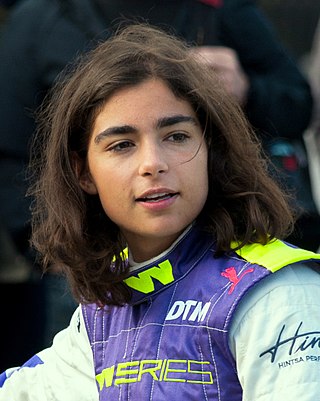
Jamie Laura Chadwick is a British racing driver who races for Jenner Racing in the W Series. She won the inaugural W Series season in 2019, before retaining her title in 2021 and 2022. She currently holds the records for the most wins, podiums, pole positions and points in the W Series. She has also competed in the Race of Champions for Great Britain alongside David Coulthard, as well as racing in Extreme E. She is a development driver for the Williams Formula One team.

The 2019 W Series was the inaugural motor racing season of the W Series, an all-female Formula 3-level racing series.
The Parliament of Malta moved from the Grandmaster's Palace to the purpose-built Parliament House (pictured).

The Parliament of Malta is the constitutional legislative body in Malta, located in Valletta. The parliament is unicameral, with a democratically elected House of Representatives and the President of Malta. By constitutional law, all government ministers, including the Prime Minister, must be members of the House of Representatives.

The Grandmaster's Palace, officially known as The Palace, is a palace in Valletta, Malta. It was built between the 16th and 18th centuries as the palace of the Grand Master of the Order of St. John, who ruled Malta from 1530 to 1798, and was also known as the Magisterial Palace. When the knights were expelled by Napoleonic France, it became the National Palace. During the period of British rule beginning in 1800, it was the Governor's Palace.

The Parliament House is the meeting place of the Parliament of Malta located in Valletta, Malta. The building was constructed between 2011 and 2015 to designs by Renzo Piano as part of the City Gate Project, which also included building a new City Gate and converting the ruins of the Royal Opera House into an open-air theatre. Construction of the Parliament House generated considerable controversy, mainly due to the modern design of the building and the cost of construction, which amounted to around €90 million.
Three people are killed and 62 injured in a pair of bombings on buses in Nairobi, Kenya.
On 4 May 2014, two improvised explosive devices exploded on buses in Nairobi, Kenya, killing three people and injuring sixty-two. Both of the bombs exploded northeast of Nairobi on the Thika Road, an eight-lane controlled-access highway, and detonated 1 kilometre (0.62 mi) apart. Twenty of the wounded were in critical condition after the blast.
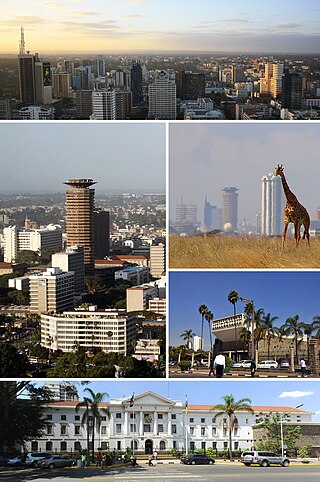
Nairobi is the capital and largest city of Kenya. The name is derived from the Maasai phrase Enkare Nairobi, which translates to "place of cool waters", a reference to the Nairobi River which flows through the city. The city proper had a population of 4,397,073 in the 2019 census, while the metropolitan area has a projected population in 2022 of 10.8 million. The city is commonly referred to as the Green City in the Sun.
Greensburg, Kansas is almost completely destroyed by a 1.7-mile wide EF5 tornado. It was the first-ever tornado to be rated as such with the new Enhanced Fujita scale.

Greensburg is a city in, and the county seat of, Kiowa County, Kansas, United States. As of the 2020 United States census, the population of the city was 740. It is home to the world's largest hand-dug well. On the evening of May 4, 2007, Greensburg was devastated by an EF5 tornado that leveled at least 95 percent of the city and killing eleven people between the ages of 46 and 84. Today, Greensburg stands as a model "green town", often described as the greenest in America. The hospital, city hall, and school have all been built to the highest certification level issued by Leadership in Energy and Environmental Design (LEED).
The Enhanced Fujita scale rates tornado intensity based on the severity of the damage they cause. It is used in some countries, including the United States, Canada, China, and Mongolia.

A tornado is a violently rotating column of air that is in contact with both the surface of the Earth and a cumulonimbus cloud or, in rare cases, the base of a cumulus cloud. It is often referred to as a twister, whirlwind or cyclone, although the word cyclone is used in meteorology to name a weather system with a low-pressure area in the center around which, from an observer looking down toward the surface of the Earth, winds blow counterclockwise in the Northern Hemisphere and clockwise in the Southern. Tornadoes come in many shapes and sizes, and they are often visible in the form of a condensation funnel originating from the base of a cumulonimbus cloud, with a cloud of rotating debris and dust beneath it. Most tornadoes have wind speeds less than 180 km/h (110 mph), are about 80 m across, and travel several kilometers before dissipating. The most extreme tornadoes can attain wind speeds of more than 480 km/h (300 mph), are more than 3 km in diameter, and stay on the ground for more than 100 km.
One hundred three people are killed and 51 are injured in a plane crash near Mallam Aminu Kano International Airport in Kano, Nigeria.

EAS Airlines Flight 4226 was a scheduled domestic passenger flight from Kano to Lagos, Nigeria. On 4 May 2002, the aircraft serving the route, a BAC One-Eleven 525FT with 69 passengers and 8 crew members on board, crashed into Gwammaja Quarters, a densely-populated residential area located approximately three kilometres from the airport, and burst into flames, resulting in the deaths of 66 passengers and 7 crew. In addition, at least 30 civilians on the ground were killed. With a total of 103 fatalities, Flight 4226 is the deadliest aviation accident involving a BAC One-Eleven.

Mallam Aminu Kano International Airport is an international airport serving Kano, the capital city of Kano State of Nigeria. It was a Royal Air Force station before the country became independent. It is the main airport serving northern Nigeria and was named after politician Aminu Kano. The airport has an international and a domestic terminal. Construction started on a new domestic terminal and was commissioned on 23 May 2011. In 2009, the airport handled 323,482 passengers. The bulk of international flights cater to the large Sudanese community in Kano and Muslim pilgrimages to Mecca.

Kano is a city in northern Nigeria and the capital of Kano State. It is the second largest city in Nigeria after Lagos, with over four million citizens living within 449 km2 (173 sq mi); located in the Savanna, south of the Sahel, Kano is a major route of the trans-Saharan trade. The city has been a trade and human settlement for millennia. It is the traditional state of Hausa people but the Emirate was under the leadership of Dabo dynasty who since the 19th century have ruled as emirs over the city-state. Kano Emirate Council is the current traditional institution inside the city boundaries of Kano, and under the authority of the Government of Kano State.

Nigeria, officially the Federal Republic of Nigeria, is a country in West Africa. It is situated between the Sahel to the north and the Gulf of Guinea to the south in the Atlantic Ocean. It covers an area of 923,769 square kilometres (356,669 sq mi), and with a population of over 225 million, it is the most populous country in Africa, and the world's sixth-most populous country. Nigeria borders Niger in the north, Chad in the northeast, Cameroon in the east, and Benin in the west. Nigeria is a federal republic comprising 36 states and the Federal Capital Territory, where the capital, Abuja, is located. The largest city in Nigeria is Lagos, one of the largest metropolitan areas in the world and the second-largest in Africa.
Ken Livingstone took office as the first mayor of London.

Kenneth Robert Livingstone is an English politician who served as the Leader of the Greater London Council (GLC) from 1981 until the council was abolished in 1986, and as Mayor of London from the creation of the office in 2000 until 2008. He also served as the Member of Parliament (MP) for Brent East from 1987 to 2001. A former member of the Labour Party, he was on the party's hard left, ideologically identifying as a socialist.

The mayor of London is the chief executive of the Greater London Authority. The role was created in 2000 after the Greater London devolution referendum in 1998, and was the first directly elected mayor in the United Kingdom.
Ken Livingstone becomes the first Mayor of London (an office separate from that of the Lord Mayor of London).

Kenneth Robert Livingstone is an English politician who served as the Leader of the Greater London Council (GLC) from 1981 until the council was abolished in 1986, and as Mayor of London from the creation of the office in 2000 until 2008. He also served as the Member of Parliament (MP) for Brent East from 1987 to 2001. A former member of the Labour Party, he was on the party's hard left, ideologically identifying as a socialist.

The 2000 London mayoral election was held on 4 May 2000 to elect the Mayor of London. It was the first election to the office established that year, after a referendum in London.

The mayor of London is the chief executive of the Greater London Authority. The role was created in 2000 after the Greater London devolution referendum in 1998, and was the first directly elected mayor in the United Kingdom.
The Lord Mayor of London is the mayor of the City of London and the leader of the City of London Corporation. Within the City, the Lord Mayor is accorded precedence over all individuals except the sovereign and retains various traditional powers, rights, and privileges, including the title and style The Right Honourable Lord Mayor of London.
A federal judge in Sacramento, California, gives "Unabomber" Theodore Kaczynski four life sentences plus 30 years after Kaczynski accepts a plea agreement sparing him from the death penalty.

Sacramento is the capital city of the U.S. state of California and the seat and largest city of Sacramento County. Located at the confluence of the Sacramento and American River in Northern California's Sacramento Valley, Sacramento's 2020 population of 524,943 makes it the sixth-largest city in California and the ninth-largest capital in the United States. Sacramento is the seat of the California Legislature and the Governor of California, making it the state's political center and a hub for lobbying and think tanks. It features the California State Capitol Museum.

Theodore John Kaczynski, also known as the Unabomber (/ˈjuːnəbɒmər/), is an American domestic terrorist and former mathematics professor. He was a mathematics prodigy, but abandoned his academic career to pursue a primitive life.
Capital punishment, also known as the death penalty, is a state-sanctioned practice of killing a person as a punishment for a crime. The sentence ordering that an offender is to be punished in such a manner is known as a death sentence, and the act of carrying out the sentence is known as an execution. A prisoner who has been sentenced to death and awaits execution is condemned and is commonly referred to as being "on death row".
Israeli Prime Minister Yitzhak Rabin and PLO leader Yasser Arafat sign a peace accord, granting self-rule in the Gaza Strip and Jericho.

A prime minister, premier or chief of cabinet is the head of the cabinet and the leader of the ministers in the executive branch of government, often in a parliamentary or semi-presidential system. Under those systems, a prime minister is not the head of state, but rather the head of government, serving under either a monarch in a democratic constitutional monarchy or under a president in a republican form of government.

Yitzhak Rabin was an Israeli politician, statesman and general. He was the fifth Prime Minister of Israel, serving two terms in office, 1974–77, and from 1992 until his assassination in 1995.

The Palestine Liberation Organization is a Palestinian nationalist political and militant organization founded in 1964 with the initial purpose of establishing Arab unity and statehood over the territory of former Mandatory Palestine, in opposition to the State of Israel. In 1993, alongside the Oslo I Accord, the PLO's aspiration for Arab statehood was revised to be specifically for the Palestinian territories under an Israeli occupation since the 1967 Arab–Israeli War. It is headquartered in the city of Al-Bireh in the West Bank, and is recognized as the sole legitimate representative of the Palestinian people by over 100 countries that it has diplomatic relations with. As the official recognized government of the de jure State of Palestine, it has enjoyed observer status at the United Nations (UN) since 1974. Due to its militant activities, including acts of violence primarily aimed at Israeli civilians, the PLO was designated as a terrorist organization by the United States in 1987, although a later presidential waiver has permitted American contact with the organization since 1988. In 1993, the PLO recognized Israel's right to exist in peace, accepted Resolution 242 of the United Nations Security Council, and rejected "violence and terrorism". In response, Israel officially recognized the PLO as a legitimate authority representing the Palestinian people. However, despite its participation in the Oslo Accords, the PLO continued to employ tactics of violence in the following years, particularly during the Second Intifada of 2000–2005. On 29 October 2018, the Palestinian Central Council suspended the Palestinian recognition of Israel, and subsequently halted all forms of security and economic cooperation with it.

Mohammed Abdel Rahman Abdel Raouf al-Qudwa al-Husseini, popularly known as Yasser Arafat or by his kunya Abu Ammar, was a Palestinian political leader. He was Chairman of the Palestine Liberation Organization (PLO) from 1969 to 2004 and President of the Palestinian National Authority (PNA) from 1994 to 2004. Ideologically an Arab nationalist and a socialist, he was a founding member of the Fatah political party, which he led from 1959 until 2004.

The Oslo I Accord or Oslo I, officially called the Declaration of Principles on Interim Self-Government Arrangements or short Declaration of Principles (DOP), was an attempt in 1993 to set up a framework that would lead to the resolution of the ongoing Israeli–Palestinian conflict. It was the first face-to-face agreement between the government of Israel and the Palestine Liberation Organization (PLO).

The Gaza Strip, or simply Gaza, is a Palestinian exclave on the eastern coast of the Mediterranean Sea. The smaller of the two Palestinian territories, it borders Egypt on the southwest for 11 kilometers (6.8 mi) and Israel on the east and north along a 51 km (32 mi) border. Together, the Gaza Strip and the West Bank make up the State of Palestine, while being under Israeli military occupation since 1967.

Jericho is a Palestinian city in the West Bank. It is located in the Jordan Valley, with the Jordan River to the east and Jerusalem to the west. It is the administrative seat of the Jericho Governorate of the State of Palestine and is governed by the Palestinian National Authority as part of Area A. In 2007, it had a population of 18,346.
The Supreme Soviet of the Latvian SSR declared the restoration of Latvia's independence, stating that the Molotov–Ribbentrop Pact and the Soviet occupation of Latvia in 1940 were illegal.

The Supreme Council of the Republic of Latvia was the transitional parliament of Latvia from 1990 to 1993, after the restoration of independence. The Supreme Council was elected on 18 March 1990 as the Supreme Soviet of the Latvian SSR. On 4 May 1990 it declared the restoration of independence of Latvia and began a transitional period which lasted until the first session of the fifth Saeima on 6 July 1993. Independence was fully restored on 21 August 1991 during the Soviet coup attempt.

The Declaration "On the Restoration of Independence of the Republic of Latvia" was adopted on 4 May 1990 by the Supreme Soviet of the Latvian SSR in which Latvia declared independence from the Soviet Union. The Declaration stated that, although Latvia had de facto lost its independence in 1940, when it was annexed by the Soviet Union, the country had de jure remained a sovereign country as the annexation had been unconstitutional and against the will of the Latvian people. It asserted the priority of the basics of the international law over the national laws and therefore it resolved that the Molotov–Ribbentrop Pact and the Soviet occupation of Latvia in 1940 were illegal. It also asserted that the heavily rigged 1940 elections were illegal and unconstitutional, and that all acts of the People's Saeima chosen at that election–including the request to join the Soviet Union on 21 July 1940–were ipso facto void.

The Molotov–Ribbentrop Pact was a non-aggression pact between Nazi Germany and the Soviet Union that enabled those powers to partition Poland between them. The pact was signed in Moscow on 23 August 1939 by German Foreign Minister Joachim von Ribbentrop and Soviet Foreign Minister Vyacheslav Molotov and was officially known as the Treaty of Non-Aggression between Germany and the Union of Soviet Socialist Republics. Unofficially, it has also been referred to as the Hitler–Stalin Pact, Nazi–Soviet Pact or Nazi–Soviet Alliance.
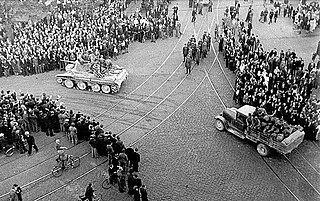
The Soviet occupation of Latvia in 1940 refers to the military occupation of the Republic of Latvia by the Soviet Union under the provisions of the 1939 Molotov–Ribbentrop Pact with Nazi Germany and its Secret Additional Protocol signed in August 1939. The occupation took place according to the European Court of Human Rights, the Government of Latvia, the United States Department of State, and the European Union. In 1989, the USSR also condemned the 1939 secret protocol between Nazi Germany and herself that had led to the invasion and occupation of the three Baltic countries, including Latvia.
Latvia declares independence from the Soviet Union.

Latvia, officially the Republic of Latvia, is a country in the Baltic region of Northern Europe. It is one of the Baltic states; and is bordered by Estonia to the north, Lithuania to the south, Russia to the east, Belarus to the southeast, and shares a maritime border with Sweden to the west. Latvia covers an area of 64,589 km2 (24,938 sq mi), with a population of 1.9 million. The country has a temperate seasonal climate. Its capital and largest city is Riga. Latvians belong to the ethno-linguistic group of the Balts; and speak Latvian, one of the only two surviving Baltic languages. Russians are the most prominent minority in the country, at almost a quarter of the population.

The Declaration "On the Restoration of Independence of the Republic of Latvia" was adopted on 4 May 1990 by the Supreme Soviet of the Latvian SSR in which Latvia declared independence from the Soviet Union. The Declaration stated that, although Latvia had de facto lost its independence in 1940, when it was annexed by the Soviet Union, the country had de jure remained a sovereign country as the annexation had been unconstitutional and against the will of the Latvian people. It asserted the priority of the basics of the international law over the national laws and therefore it resolved that the Molotov–Ribbentrop Pact and the Soviet occupation of Latvia in 1940 were illegal. It also asserted that the heavily rigged 1940 elections were illegal and unconstitutional, and that all acts of the People's Saeima chosen at that election–including the request to join the Soviet Union on 21 July 1940–were ipso facto void.

The Soviet Union, officially the Union of Soviet Socialist Republics (USSR), was a transcontinental country that spanned much of Eurasia from 1922 to 1991. A flagship communist state, it was nominally a federal union of fifteen national republics; in practice, both its government and its economy were highly centralized until its final years. It was a one-party state governed by the Communist Party of the Soviet Union, with the city of Moscow serving as its capital as well as that of its largest and most populous republic: the Russian SFSR. Other major cities included Leningrad, Kiev, Minsk, Tashkent, Alma-Ata, and Novosibirsk. It was the largest country in the world, covering over 22,402,200 square kilometres (8,649,500 sq mi) and spanning eleven time zones.
Iran–Contra affair: Former White House aide Oliver North is convicted of three crimes and acquitted of nine other charges; the convictions are later overturned on appeal.

The Iran–Contra affair, often referred to as the Iran–Contra scandal, the McFarlane affair, or simply Iran–Contra, was a political scandal in the United States that occurred during the second term of the Reagan administration. Between 1981 and 1986, senior administration officials secretly facilitated the sale of arms to Iran, which was the subject of an arms embargo. The administration hoped to use the proceeds of the arms sale to fund the Contras, a right-wing rebel group, in Nicaragua. Under the Boland Amendment, further funding of the Contras by the government had been prohibited by Congress.
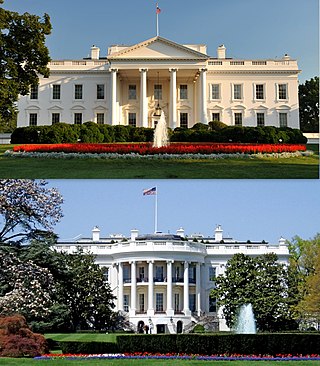
The White House is the official residence and workplace of the president of the United States. It is located at 1600 Pennsylvania Avenue NW in Washington, D.C., and has been the residence of every U.S. president since John Adams in 1800. The term "White House" is often used as a metonym for the president and his advisers.

Oliver Laurence North is an American political commentator, television host, military historian, author, and retired United States Marine Corps lieutenant colonel.
A fire at an industrial plant in Henderson, Nevada, caused tons of Space Shuttle fuel to explode, resulting in two deaths, 372 injuries, and $100 million in damage.

Henderson is a city in Clark County, Nevada, United States, about 16 miles (26 km) southeast of downtown Las Vegas. It is the second largest city in Nevada, after Las Vegas, with an estimated population of 320,189 in 2019. The city is part of the Las Vegas Valley. Henderson occupies the southeastern end of the valley, at an elevation of 1,864 feet (568 m).

The Space Shuttle is a retired, partially reusable low Earth orbital spacecraft system operated from 1981 to 2011 by the U.S. National Aeronautics and Space Administration (NASA) as part of the Space Shuttle program. Its official program name was Space Transportation System (STS), taken from a 1969 plan for a system of reusable spacecraft where it was the only item funded for development. The first (STS-1) of four orbital test flights occurred in 1981, leading to operational flights (STS-5) beginning in 1982. Five complete Space Shuttle orbiter vehicles were built and flown on a total of 135 missions from 1981 to 2011, launched from the Kennedy Space Center (KSC) in Florida. Operational missions launched numerous satellites, interplanetary probes, and the Hubble Space Telescope (HST), conducted science experiments in orbit, participated in the Shuttle-Mir program with Russia, and participated in construction and servicing of the International Space Station (ISS). The Space Shuttle fleet's total mission time was 1,323 days.

On May 4, 1988, a fire followed by several explosions occurred at the Pacific Engineering and Production Company of Nevada (PEPCON) chemical plant in Henderson, Nevada. The disaster caused two fatalities, 372 injuries, and an estimated $100 million of damage. A large portion of the Las Vegas Valley within a 10-mile (16 km) radius of the plant was affected, and several agencies activated disaster plans.
The PEPCON disaster rocks Henderson, Nevada, as tons of Space Shuttle fuel detonate during a fire.

On May 4, 1988, a fire followed by several explosions occurred at the Pacific Engineering and Production Company of Nevada (PEPCON) chemical plant in Henderson, Nevada. The disaster caused two fatalities, 372 injuries, and an estimated $100 million of damage. A large portion of the Las Vegas Valley within a 10-mile (16 km) radius of the plant was affected, and several agencies activated disaster plans.

Henderson is a city in Clark County, Nevada, United States, about 16 miles (26 km) southeast of downtown Las Vegas. It is the second largest city in Nevada, after Las Vegas, with an estimated population of 320,189 in 2019. The city is part of the Las Vegas Valley. Henderson occupies the southeastern end of the valley, at an elevation of 1,864 feet (568 m).

The Space Shuttle is a retired, partially reusable low Earth orbital spacecraft system operated from 1981 to 2011 by the U.S. National Aeronautics and Space Administration (NASA) as part of the Space Shuttle program. Its official program name was Space Transportation System (STS), taken from a 1969 plan for a system of reusable spacecraft where it was the only item funded for development. The first (STS-1) of four orbital test flights occurred in 1981, leading to operational flights (STS-5) beginning in 1982. Five complete Space Shuttle orbiter vehicles were built and flown on a total of 135 missions from 1981 to 2011, launched from the Kennedy Space Center (KSC) in Florida. Operational missions launched numerous satellites, interplanetary probes, and the Hubble Space Telescope (HST), conducted science experiments in orbit, participated in the Shuttle-Mir program with Russia, and participated in construction and servicing of the International Space Station (ISS). The Space Shuttle fleet's total mission time was 1,323 days.
Falklands War: HMS Sheffield was struck by an Exocet missile, killing 20 sailors and leading to its sinking six days later—the first Royal Navy ship sunk in action since World War II.

The Falklands War was a ten-week undeclared war between Argentina and the United Kingdom in 1982 over two British dependent territories in the South Atlantic: the Falkland Islands and its territorial dependency, South Georgia and the South Sandwich Islands.

HMS Sheffield was a Type 42 guided missile destroyer and the second Royal Navy ship to be named after the city of Sheffield in Yorkshire. Commissioned on 16 February 1975 the Sheffield was part of the Task Force 317 sent to the Falkland Islands during the Falklands War. She was struck and heavily damaged by an Exocet air-launched anti-ship missile from an Argentine Super Étendard aircraft on 4 May 1982 and foundered while under tow on 10 May 1982.

The Exocet is a French-built anti-ship missile whose various versions can be launched from surface vessels, submarines, helicopters and fixed-wing aircraft.

The Royal Navy (RN) is the United Kingdom's naval warfare force. Although warships were used by English and Scottish kings from the early medieval period, the first major maritime engagements were fought in the Hundred Years' War against France. The modern Royal Navy traces its origins to the early 16th century; the oldest of the UK's armed services, it is consequently known as the Senior Service.
Twenty sailors are killed when the British Type 42 destroyer HMS Sheffield is hit by an Argentinian Exocet missile during the Falklands War.

The Type 42 or Sheffield class, was a class of fourteen guided-missile destroyers that served in the Royal Navy. A further two ships of this class were built for and served with the Argentine Navy.

HMS Sheffield was a Type 42 guided missile destroyer and the second Royal Navy ship to be named after the city of Sheffield in Yorkshire. Commissioned on 16 February 1975 the Sheffield was part of the Task Force 317 sent to the Falkland Islands during the Falklands War. She was struck and heavily damaged by an Exocet air-launched anti-ship missile from an Argentine Super Étendard aircraft on 4 May 1982 and foundered while under tow on 10 May 1982.

Argentina, officially the Argentine Republic, is a country in the southern half of South America. Argentina covers an area of 2,780,400 km2 (1,073,500 sq mi), making it the second-largest country in South America after Brazil, the fourth-largest country in the Americas, and the eighth-largest country in the world. It shares the bulk of the Southern Cone with Chile to the west, and is also bordered by Bolivia and Paraguay to the north, Brazil to the northeast, Uruguay and the South Atlantic Ocean to the east, and the Drake Passage to the south. Argentina is a federal state subdivided into twenty-three provinces, and one autonomous city, which is the federal capital and largest city of the nation, Buenos Aires. The provinces and the capital have their own constitutions, but exist under a federal system. Argentina claims sovereignty over the Falkland Islands, South Georgia and the South Sandwich Islands, and a part of Antarctica.

The Exocet is a French-built anti-ship missile whose various versions can be launched from surface vessels, submarines, helicopters and fixed-wing aircraft.

The Falklands War was a ten-week undeclared war between Argentina and the United Kingdom in 1982 over two British dependent territories in the South Atlantic: the Falkland Islands and its territorial dependency, South Georgia and the South Sandwich Islands.
Margaret Thatcher became the first female prime minister of the United Kingdom, following the defeat of James Callaghan's incumbent Labour government in the previous day's general election.

Margaret Hilda Thatcher, Baroness Thatcher , was Prime Minister of the United Kingdom from 1979 to 1990 and Leader of the Conservative Party from 1975 to 1990. She was the first female British prime minister and the longest-serving British prime minister of the 20th century. As prime minister, she implemented economic policies that became known as Thatcherism. A Soviet journalist dubbed her the "Iron Lady", a nickname that became associated with her uncompromising politics and leadership style.

The prime minister of the United Kingdom is the head of government of the United Kingdom. The prime minister advises the sovereign on the exercise of much of the royal prerogative, chairs the Cabinet and selects its ministers. As modern prime ministers hold office by virtue of their ability to command the confidence of the House of Commons, they sit as members of Parliament.

Leonard James Callaghan, Baron Callaghan of Cardiff,, commonly known as Jim Callaghan, was Prime Minister of the United Kingdom from 1976 to 1979 and Leader of the Labour Party from 1976 to 1980. Callaghan is the only person to have held all four Great Offices of State, having served as Chancellor of the Exchequer from 1964 to 1967, Home Secretary from 1967 to 1970 and Foreign Secretary from 1974 to 1976. He was a Member of Parliament (MP) from 1945 to 1987.
The Labour Party is a political party in the United Kingdom that has been described as an alliance of social democrats, democratic socialists and trade unionists. The Labour Party sits on the centre-left of the political spectrum. In all general elections since 1922, Labour has been either the governing party or the Official Opposition. There have been six Labour prime ministers and thirteen Labour ministries. The party holds the annual Labour Party Conference, at which party policy is formulated.
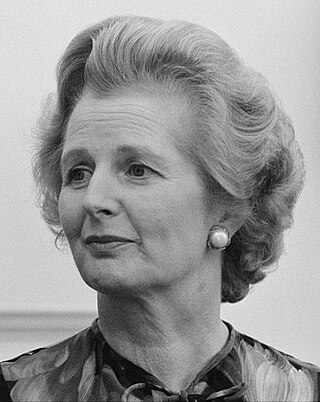
The 1979 United Kingdom general election was held on Thursday 3 May 1979 to elect 635 members to the British House of Commons.
Margaret Thatcher becomes the first female Prime Minister of the United Kingdom.

Margaret Hilda Thatcher, Baroness Thatcher , was Prime Minister of the United Kingdom from 1979 to 1990 and Leader of the Conservative Party from 1975 to 1990. She was the first female British prime minister and the longest-serving British prime minister of the 20th century. As prime minister, she implemented economic policies that became known as Thatcherism. A Soviet journalist dubbed her the "Iron Lady", a nickname that became associated with her uncompromising politics and leadership style.

The prime minister of the United Kingdom is the head of government of the United Kingdom. The prime minister advises the sovereign on the exercise of much of the royal prerogative, chairs the Cabinet and selects its ministers. As modern prime ministers hold office by virtue of their ability to command the confidence of the House of Commons, they sit as members of Parliament.
The South African Defence Force attacks a SWAPO base at Cassinga in southern Angola, killing about 600 people.

The South African Defence Force (SADF) comprised the armed forces of South Africa from 1957 until 1994. Shortly before the state reconstituted itself as a republic in 1961, the former Union Defence Force was officially succeeded by the SADF, which was established by the Defence Act of 1957. The SADF, in turn, was superseded by the South African National Defence Force in 1994.

The South West Africa People's Organisation, officially known as the SWAPO Party of Namibia, is a political party and former independence movement in Namibia. Founded in 1960, it has been the governing party in Namibia since the country achieved independence in 1990. The party continues to be dominated in number and influence by the Ovambo ethnic group.

Cassinga or Kassinga is a town and commune in the municipality of Jamba, province of Huíla, Angola.

Angola, officially the Republic of Angola, is a country located on the west coast of central-southern Africa. It is the second-largest Lusophone (Portuguese-speaking) country in both total area and population, and is the seventh-largest country in Africa. It is bordered by Namibia to the south, the Democratic Republic of the Congo to the north, Zambia to the east, and the Atlantic Ocean to the west. Angola has an exclave province, the province of Cabinda, that borders the Republic of the Congo and the Democratic Republic of the Congo. The capital and most populous city is Luanda.
An all-female Japanese team reached the summit of Manaslu in the Himalayas, becoming the first women to climb a peak higher than 8,000 metres (26,247 ft) above sea level.

Manaslu is the eighth-highest mountain in the world at 8,163 metres (26,781 ft) above sea level. It is in the Mansiri Himal, part of the Nepalese Himalayas, in the west-central part of Nepal. The name Manaslu means "mountain of the spirit" and is derived from the Sanskrit word manasa, meaning "intellect" or "soul". Manaslu was first climbed on May 9, 1956, by Toshio Imanishi and Gyalzen Norbu, members of a Japanese expedition. It is said that, given the many unsuccessful attempts by the British to climb Everest before New Zealander Edmund Hillary, "just as the British consider Everest their mountain, Manaslu has always been a Japanese mountain".

The Himalayas, or Himalaya, is a mountain range in Asia, separating the plains of the Indian subcontinent from the Tibetan Plateau. The range has some of the planet's highest peaks, including the very highest, Mount Everest in Nepal. Over 100 peaks exceeding 7,200 m (23,600 ft) in elevation lie in the Himalayas. By contrast, the highest peak outside Asia is 6,961 m (22,838 ft) tall.

The International Mountaineering and Climbing Federation (UIAA) recognises eight-thousanders as the 14 mountains that are more than 8,000 metres (26,247 ft) in height above sea level, and are considered to be sufficiently independent from neighbouring peaks. There is no precise definition of the criteria used to assess independence, and, since 2012, the UIAA has been involved in a process to consider whether the list should be expanded to 20 mountains. All eight-thousanders are located in the Himalayan and Karakoram mountain ranges in Asia, and their summits are in the death zone.
The 108-story Sears Tower in Chicago is topped out at 1,451 feet as the world's tallest building.

The Willis Tower is a 108-story, 1,451-foot (442.3 m) skyscraper in the Loop community area of Chicago in Illinois, United States. Designed by architect Bruce Graham and engineer Fazlur Rahman Khan of Skidmore, Owings & Merrill (SOM), it opened in 1973 as the world's tallest building, a title that it held for nearly 25 years. It is currently the third-tallest building in the Western Hemisphere, as well as the 23rd-tallest in the world. Each year, more than 1.7 million people visit the Skydeck observation deck, the highest in the United States, making it one of Chicago's most popular tourist destinations.
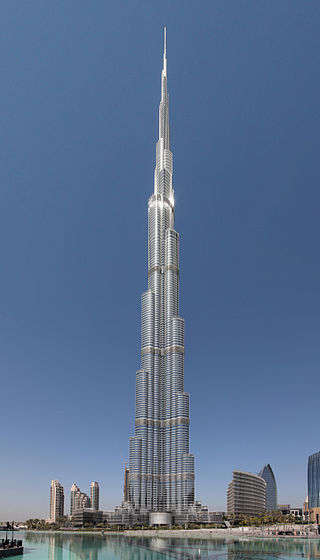
This list of tallest buildings includes skyscrapers with continuously occupiable floors and a height of at least 340 metres (1,120 ft). Non-building structures, such as towers, are not included in this list.
The Don't Make A Wave Committee, a fledgling environmental organization founded in Canada in 1971, officially changes its name to "Greenpeace Foundation".
The Don't Make a Wave Committee was the name of the anti-nuclear organization which later evolved into Greenpeace, a global environmental organization. The Don't Make a Wave Committee was founded in Vancouver, British Columbia, Canada to protest and attempt to halt further underground nuclear testing by the United States in the National Wildlife refuge at Amchitka in the Aleutian Islands of Alaska. The Don't Make a Wave Committee was first formed in October 1969 and officially established in early 1970.
An environmental organization is an organization coming out of the conservation or environmental movements that seeks to protect, analyse or monitor the environment against misuse or degradation from human forces.

Greenpeace is an independent global campaigning network. Greenpeace was founded in Canada in 1971 by Irving Stowe and Dorothy Stowe, immigrant environmental activists from the United States. Greenpeace states its goal is to "ensure the ability of the Earth to nurture life in all its diversity" and focuses its campaigning on worldwide issues such as climate change, deforestation, overfishing, commercial whaling, genetic engineering, and anti-nuclear issues. It uses direct action, lobbying, research, and ecotage to achieve its goals.
Vietnam War: Kent State shootings: The Ohio National Guard, sent to Kent State University after disturbances in the city of Kent the weekend before, opens fire killing four unarmed students and wounding nine others. The students were protesting the Cambodian Campaign of the United States and South Vietnam.

The Vietnam War was a conflict in Vietnam, Laos, and Cambodia from 1 November 1955 to the fall of Saigon on 30 April 1975. It was the second of the Indochina Wars and was officially fought between North Vietnam and South Vietnam. The north was supported by the Soviet Union, China, and other communist states, while the south was supported by the United States and other anti-communist allies. The war is widely considered to be a Cold War-era proxy war. It lasted almost 20 years, with direct U.S. involvement ending in 1973. The conflict also spilled over into neighboring states, exacerbating the Laotian Civil War and the Cambodian Civil War, which ended with all three countries becoming communist states by 1975.

The Kent State shootings, also known as the May 4 massacre and the Kent State massacre, were the killings of four and wounding of nine other unarmed Kent State University students by the Ohio National Guard on May 4, 1970, in Kent, Ohio, 40 mi (64 km) south of Cleveland. The killings took place during a peace rally opposing the expanding involvement of the Vietnam War into Cambodia by United States military forces as well as protesting the National Guard presence on campus. The incident marked the first time that a student had been killed in an anti-war gathering in United States history.
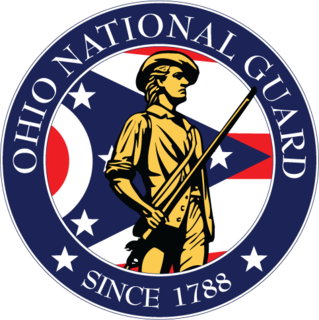
The Ohio National Guard comprises the Ohio Army National Guard and the Ohio Air National Guard. The commander-in-chief of the Ohio Army National Guard is the governor of the U.S. state of Ohio. If the Ohio Army National Guard is called to federal service, then the President of the United States becomes the commander-in-chief. The military commander of all forces in the State of Ohio is the Adjutant General, Major General John C. Harris, Jr. is responsible for the command of 17,000 members, preparedness and readiness, installation management, and budget of the Ohio National Guard. The current Assistant Adjutant General for Army, with responsibility for overseeing the Ohio Army National Guard training and operations, is Brigadier General Thomas E. Moore II. The current Assistant Adjutant General for Air is Major General James R. Camp with responsibility for overseeing the Ohio Air National Guard.

Kent State University (KSU) is a public research university in Kent, Ohio. The university also includes seven regional campuses in Northeast Ohio and additional facilities in the region and internationally. Regional campuses are located in Ashtabula, Burton, East Liverpool, Jackson Township, New Philadelphia, Salem, and Warren, Ohio, with additional facilities in Cleveland, Independence, and Twinsburg, Ohio, New York City, and Florence, Italy.

The Cambodian campaign was a brief series of military operations conducted in eastern Cambodia in 1970 by South Vietnam and the United States as an extension of the Vietnam War and the Cambodian Civil War. Thirteen major operations were conducted by the Army of the Republic of Vietnam (ARVN) between 29 April and 22 July and by U.S. forces between 1 May and 30 June 1970.
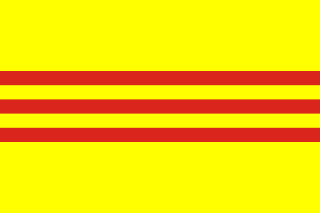
South Vietnam, officially the Republic of Vietnam, was a country in Southeast Asia that existed from 1955 to 1975, the period when the southern portion of Vietnam was a member of the Western Bloc during part of the Cold War after the 1954 division of Vietnam. It first received international recognition in 1949 as the State of Vietnam within the French Union, with its capital at Saigon, before becoming a republic in 1955. South Vietnam was bordered by North Vietnam to the north, Laos to the northwest, Cambodia to the southwest, and Thailand across the Gulf of Thailand to the southwest. Its sovereignty was recognized by the United States and 87 other nations, though it failed to gain admission into the United Nations as a result of a Soviet veto in 1957. It was succeeded by the Republic of South Vietnam in 1975.
American civil rights movement: The "Freedom Riders" begin a bus trip through the South.

The civil rights movement was a political movement and campaign from 1954 to 1968 in the United States to abolish institutional racial segregation, discrimination, and disenfranchisement throughout the United States. The movement had its origins in the Reconstruction era during the late 19th century, although it made its largest legislative gains in the 1960s after years of direct actions and grassroots protests. The social movement's major nonviolent resistance and civil disobedience campaigns eventually secured new protections in federal law for the civil rights of all Americans.
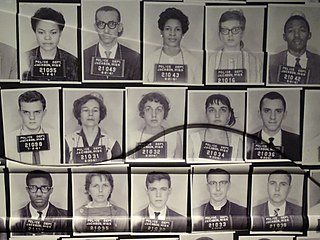
Freedom Riders were civil rights activists who rode interstate buses into the segregated Southern United States in 1961 and subsequent years to challenge the non-enforcement of the United States Supreme Court decisions Morgan v. Virginia (1946) and Boynton v. Virginia (1960), which ruled that segregated public buses were unconstitutional. The Southern states had ignored the rulings and the federal government did nothing to enforce them. The first Freedom Ride left Washington, D.C. on May 4, 1961, and was scheduled to arrive in New Orleans on May 17.

The Southern United States is a geographic and cultural region of the United States of America. It is between the Atlantic Ocean and the Western United States, with the Midwestern and Northeastern United States to its north and the Gulf of Mexico and Mexico to its south.
Malcolm Ross and Victor Prather attain a new altitude record for manned balloon flight ascending in the Strato-Lab V open gondola to 113,740 feet (34.67 km).

Malcolm David Ross was a captain in the United States Naval Reserve (USNR), an atmospheric scientist, and a balloonist who set several records for altitude and scientific inquiry, with more than 100 hours flight time in gas balloons by 1961. Along with Lieutenant Commander Victor A. Prather (USN), he set the altitude record for a manned balloon flight.
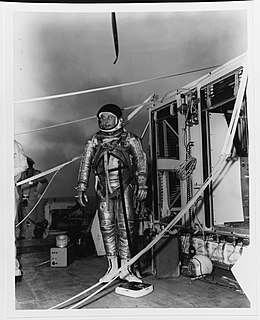
Lieutenant Commander Victor Alonzo Prather Jr. was an American flight surgeon famous for taking part in "Project RAM", a government project to develop the space suit. On May 4, 1961, Prather drowned during the helicopter transfer after the landing of the Strato-Lab V balloon flight, which set an altitude record for manned balloon flight which stood until 2012.

Project Strato-Lab was a high-altitude manned balloon program sponsored by the United States Navy during the 1950s and early 1960s. The Strato-Lab program lifted the first Americans into the upper reaches of the stratosphere since World War II. Project Strato-Lab developed out of the Navy's unmanned balloon program, Project Skyhook. The program was established in 1954 and administrated by Commander Malcolm Ross. Malcolm Ross and others developed the program to accomplish research required for the manned rocket program to follow. This program provided biomedical data that was used for subsequent efforts in space. Malcolm Ross launched five numbered flights as well as other unnumbered flights.
The 1st Annual Grammy Awards are held.
The 1st Annual Grammy Awards were held on May 4, 1959. They recognized musical accomplishments by performers for the year 1959. Two separate ceremonies were held simultaneously on the same day; the first hotel in Beverly Hills, California, and the second in the Park Sheraton Hotel in New York City. Ella Fitzgerald, Count Basie, Domenico Modugno, Ross Bagdasarian, and Henry Mancini, each won 2 awards.
Ernest Hemingway wins the Pulitzer Prize for The Old Man and the Sea.
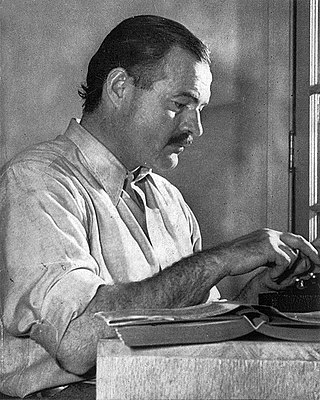
Ernest Miller Hemingway was an American novelist, short-story writer, and journalist. His economical and understated style—which he termed the iceberg theory—had a strong influence on 20th-century fiction, while his adventurous lifestyle and public image brought him admiration from later generations. Hemingway produced most of his work between the mid-1920s and the mid-1950s, and he was awarded the 1954 Nobel Prize in Literature. He published seven novels, six short-story collections, and two nonfiction works. Three of his novels, four short-story collections, and three nonfiction works were published posthumously. Many of his works are considered classics of American literature.

The Pulitzer Prize is an award for achievements in newspaper, magazine, online journalism, literature, and musical composition within the United States. It was established in 1917 by provisions in the will of Joseph Pulitzer, who had made his fortune as a newspaper publisher, and is administered by Columbia University. Prizes are awarded annually in twenty-one categories. In twenty of the categories, each winner receives a certificate and a US$15,000 cash award. The winner in the public service category is awarded a gold medal.
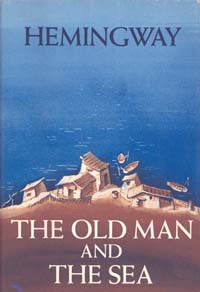
The Old Man and the Sea is a novella written by the American author Ernest Hemingway in 1951 in Cayo Blanco (Cuba), and published in 1952. It was the last major work of fiction written by Hemingway that was published during his lifetime. One of his most famous works, it tells the story of Santiago, an aging Cuban fisherman who struggles with a giant marlin far out in the Gulf Stream off the coast of Cuba.
The entire Torino football team (except for two players who did not take the trip: Sauro Tomà, due to an injury and Renato Gandolfi, because of coach request) is killed in a plane crash.
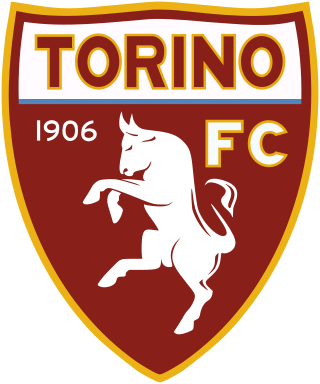
Torino Football Club, commonly referred to as Torino or simply Toro, is an Italian professional football club based in Turin, Piedmont. They currently play in Serie A.

The Superga air disaster occurred on 4 May 1949, when a Fiat G.212 of Avio Linee Italiane, carrying the entire Torino football team, crashed into the retaining wall at the back of the Basilica of Superga, which stands on a hill on the outskirts of Turin. All thirty-one people on the flight died.
In San Francisco Bay, U.S. Marines from the nearby Treasure Island Naval Base stop a two-day riot at Alcatraz Federal Penitentiary. Five people are killed in the riot.

San Francisco Bay is a large tidal estuary in the U.S. state of California, and gives its name to the San Francisco Bay Area. It is dominated by the big cities of San Francisco, San Jose, and Oakland.

The United States Marine Corps (USMC), also referred to as the United States Marines, is the maritime land force service branch of the United States Armed Forces responsible for conducting expeditionary and amphibious operations through combined arms, implementing its own infantry, artillery, aerial, and special operations forces. The U.S. Marine Corps is one of the eight uniformed services of the United States.

Naval Station Treasure Island is a former United States Navy facility that operated on Treasure Island in San Francisco Bay from 1942 to 1997.
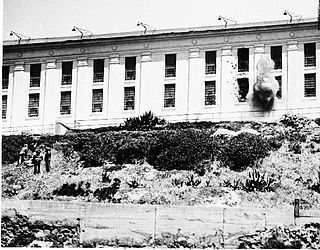
The Battle of Alcatraz, which lasted from May 2 to 4, 1946, was the result of an escape attempt at Alcatraz Federal Penitentiary by armed convicts. Two Federal Bureau of Prisons officers—William A. Miller and Harold Stites—were killed along with three of the perpetrators. Fourteen other officers and one uninvolved convict were also injured. Two of the perpetrators were executed in 1948 for their roles.

United States Penitentiary, Alcatraz Island, also known simply as Alcatraz or The Rock was a maximum security federal prison on Alcatraz Island, 1.25 miles (2.01 km) off the coast of San Francisco, California, United States, the site of a fort since the 1850s; the main prison building was built in 1910–1912 as a United States Army military prison.
World War II: Neuengamme concentration camp near Hamburg is liberated by the British Army.

Neuengamme was a network of Nazi concentration camps in Northern Germany that consisted of the main camp, Neuengamme, and more than 85 satellite camps. Established in 1938 near the village of Neuengamme in the Bergedorf district of Hamburg, the Neuengamme camp became the largest concentration camp in Northwest Germany. Over 100,000 prisoners came through Neuengamme and its subcamps, 24 of which were for women. The verified death toll is 42,900: 14,000 in the main camp, 12,800 in the subcamps, and 16,100 in the death marches and bombings during the final weeks of World War II. Following Germany's defeat in 1945, the British Army used the site as an internment camp for SS and other Nazi officials. In 1948, the British transferred the land to the Free Hanseatic City of Hamburg, which summarily demolished the camp's wooden barracks and built in its stead a prison cell block, converting the former concentration camp site into two state prisons operated by the Hamburg authorities from 1950 to 2004. Following protests by various groups of survivors and allies, the site now serves as a memorial. It is situated 15 km southeast of the centre of Hamburg.

Hamburg, officially the Free and Hanseatic City of Hamburg, is the second-largest city in Germany after Berlin, as well as the overall 7th largest city and largest non-capital city in the European Union with a population of over 1.85 million. Hamburg's urban area has a population of around 2.5 million and is part of the Hamburg Metropolitan Region, which has a population of over 5.1 million people in total. The city lies on the River Elbe and two of its tributaries, the River Alster and the River Bille. One of Germany's 16 federated states, Hamburg is surrounded by Schleswig-Holstein to the north and Lower Saxony to the south.

The British Army is the principal land warfare force of the United Kingdom, a part of the British Armed Forces along with the Royal Navy and the Royal Air Force. As of 2022, the British Army comprises 79,380 regular full-time personnel, 4,090 Gurkhas, and 28,330 volunteer reserve personnel.
World War II: The German surrender at Lüneburg Heath is signed, coming into effect the following day. It encompasses all Wehrmacht units in the Netherlands, Denmark and northwest Germany.

On 4 May 1945, at 18:30 British Double Summer Time, at Lüneburg Heath, south of Hamburg, Field Marshal Sir Bernard Law Montgomery accepted the unconditional surrender of the German forces in the Netherlands, northwest Germany including all islands, in Denmark and all naval ships in those areas. The surrender preceded the end of World War II in Europe and was signed in a carpeted tent at Montgomery's headquarters on the Timeloberg hill at Wendisch Evern.

The Wehrmacht was the unified armed forces of Nazi Germany from 1935 to 1945. It consisted of the Heer (army), the Kriegsmarine (navy) and the Luftwaffe. The designation "Wehrmacht" replaced the previously used term Reichswehr and was the manifestation of the Nazi regime's efforts to rearm Germany to a greater extent than the Treaty of Versailles permitted.
World War II: The Imperial Japanese Navy attacked Allied naval forces at the Battle of the Coral Sea, the first fleet action in which aircraft carriers engaged each other.

World War II or the Second World War, often abbreviated as WWII or WW2, was a world war that lasted from 1939 to 1945. It involved the vast majority of the world's countries—including all of the great powers—forming two opposing military alliances: the Allies and the Axis powers. World War II was a total war that directly involved more than 100 million personnel from more than 30 countries.

The Imperial Japanese Navy was the navy of the Empire of Japan from 1868 to 1945, when it was dissolved following Japan's surrender in World War II. The Japan Maritime Self-Defense Force (JMSDF) was formed between 1952–1954 after the dissolution of the IJN.

The Allies, formally referred to as the United Nations from 1942, were an international military coalition formed during the Second World War (1939–1945) to oppose the Axis powers, led by Nazi Germany, Imperial Japan, and Fascist Italy. Its principal members by 1941 were the United Kingdom, United States, Soviet Union, and China.

The Battle of the Coral Sea, from 4 to 8 May 1942, was a major naval battle between the Imperial Japanese Navy (IJN) and naval and air forces of the United States and Australia. Taking place in the Pacific Theatre of World War II, the battle is historically significant as the first action in which the opposing fleets neither sighted nor fired upon one another, attacking over the horizon with aircraft carriers instead.

An aircraft carrier is a warship that serves as a seagoing airbase, equipped with a full-length flight deck and facilities for carrying, arming, deploying, and recovering aircraft. Typically, it is the capital ship of a fleet, as it allows a naval force to project air power worldwide without depending on local bases for staging aircraft operations. Carriers have evolved since their inception in the early twentieth century from wooden vessels used to deploy balloons to nuclear-powered warships that carry numerous fighters, strike aircraft, helicopters, and other types of aircraft. While heavier aircraft such as fixed-wing gunships and bombers have been launched from aircraft carriers, these aircraft have not successfully landed on a carrier. By its diplomatic and tactical power, its mobility, its autonomy and the variety of its means, the aircraft carrier is often the centerpiece of modern combat fleets. Tactically or even strategically, it replaced the battleship in the role of flagship of a fleet. One of its great advantages is that, by sailing in international waters, it does not interfere with any territorial sovereignty and thus obviates the need for overflight authorizations from third-party countries, reduces the times and transit distances of aircraft and therefore significantly increase the time of availability on the combat zone.
World War II: The Battle of the Coral Sea begins with an attack by aircraft from the United States aircraft carrier USS Yorktown on Japanese naval forces at Tulagi Island in the Solomon Islands. The Japanese forces had invaded Tulagi the day before.

World War II or the Second World War, often abbreviated as WWII or WW2, was a world war that lasted from 1939 to 1945. It involved the vast majority of the world's countries—including all of the great powers—forming two opposing military alliances: the Allies and the Axis powers. World War II was a total war that directly involved more than 100 million personnel from more than 30 countries.

The Battle of the Coral Sea, from 4 to 8 May 1942, was a major naval battle between the Imperial Japanese Navy (IJN) and naval and air forces of the United States and Australia. Taking place in the Pacific Theatre of World War II, the battle is historically significant as the first action in which the opposing fleets neither sighted nor fired upon one another, attacking over the horizon with aircraft carriers instead.

An aircraft carrier is a warship that serves as a seagoing airbase, equipped with a full-length flight deck and facilities for carrying, arming, deploying, and recovering aircraft. Typically, it is the capital ship of a fleet, as it allows a naval force to project air power worldwide without depending on local bases for staging aircraft operations. Carriers have evolved since their inception in the early twentieth century from wooden vessels used to deploy balloons to nuclear-powered warships that carry numerous fighters, strike aircraft, helicopters, and other types of aircraft. While heavier aircraft such as fixed-wing gunships and bombers have been launched from aircraft carriers, these aircraft have not successfully landed on a carrier. By its diplomatic and tactical power, its mobility, its autonomy and the variety of its means, the aircraft carrier is often the centerpiece of modern combat fleets. Tactically or even strategically, it replaced the battleship in the role of flagship of a fleet. One of its great advantages is that, by sailing in international waters, it does not interfere with any territorial sovereignty and thus obviates the need for overflight authorizations from third-party countries, reduces the times and transit distances of aircraft and therefore significantly increase the time of availability on the combat zone.

USS Yorktown (CV-5) was an aircraft carrier that served in the United States Navy during World War II. Named after the Battle of Yorktown in 1781, she was commissioned in 1937. Yorktown was the lead ship of the Yorktown class, which was designed on the basis of lessons learned from operations with the converted battlecruisers of the Lexington class and the smaller purpose-built USS Ranger.

The Empire of Japan, also known as the Japanese Empire or Imperial Japan, was a historical nation-state and great power that existed from the Meiji Restoration in 1868 until the enactment of the post-World War II 1947 constitution and subsequent formation of modern Japan. It encompassed the Japanese archipelago and several colonies, protectorates, mandates, and other territories.

Tulagi, less commonly known as Tulaghi, is a small island—5.5 by 1 kilometre, area 2.08 square kilometres (0.80 sq mi)—in Solomon Islands, just off the south coast of Ngella Sule. The town of the same name on the island was the capital of the British Solomon Islands Protectorate from 1896 to 1942 and is today the capital of the Central Province. The capital of what is now the state of Solomon Islands moved to Honiara, Guadalcanal, after World War II.

Solomon Islands is an island country consisting of six major islands and over 900 smaller islands in Oceania, to the east of Papua New Guinea and northwest of Vanuatu. It has a land area of 28,400 square kilometres (11,000 sq mi), and a population of about 700,000. Its capital, Honiara, is located on the largest island, Guadalcanal. The country takes its name from the Solomon Islands archipelago, which is a collection of Melanesian islands that also includes the North Solomon Islands, but excludes outlying islands, such as the Santa Cruz Islands and Rennell and Bellona.
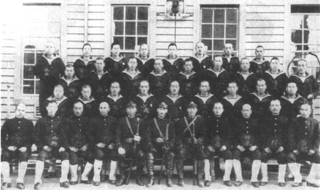
The invasion of Tulagi, on 3–4 May 1942, was part of Operation Mo, the Empire of Japan's strategy in the South Pacific and South West Pacific Area in 1942. The plan called for Imperial Japanese Navy troops to capture Tulagi and nearby islands in the British Solomon Islands Protectorate. The occupation of Tulagi by the Japanese was intended to cover the flank of and provide reconnaissance support for Japanese forces that were advancing on Port Moresby in New Guinea, provide greater defensive depth for the major Japanese base at Rabaul, and serve as a base for Japanese forces to threaten and interdict the supply and communication routes between the United States and Australia and New Zealand.
In Atlanta, mobster Al Capone begins serving an eleven-year prison sentence for tax evasion.

Atlanta is the capital and most populous city of the U.S. state of Georgia. It is the seat of Fulton County, the most populous county in Georgia, but its territory falls in both Fulton and DeKalb counties. With a population of 498,715 living within the city limits, it is the eighth most populous city in the Southeast and 38th most populous city in the United States according to the 2020 U.S. census. It is the core of the much larger Atlanta metropolitan area, which is home to more than 6.1 million people, making it the eighth-largest metropolitan area in the United States. Situated among the foothills of the Appalachian Mountains at an elevation of just over 1,000 feet (300 m) above sea level, it features unique topography that includes rolling hills, lush greenery, and the most dense urban tree coverage of any major city in the United States.
A gangster is a criminal who is a member of a gang. Most gangs are considered to be part of organized crime. Gangsters are also called mobsters, a term derived from mob and the suffix -ster. Gangs provide a level of organization and resources that support much larger and more complex criminal transactions than an individual criminal could achieve. Gangsters have been active for many years in countries around the world. Gangsters are the subject of many novels, films, television series and video games.

Alphonse Gabriel Capone, sometimes known by the nickname "Scarface", was an American gangster and businessman who attained notoriety during the Prohibition era as the co-founder and boss of the Chicago Outfit. His seven-year reign as a crime boss ended when he went to prison at the age of 33.
Tax evasion is an illegal attempt to defeat the imposition of taxes by individuals, corporations, trusts, and others. Tax evasion often entails the deliberate misrepresentation of the taxpayer's affairs to the tax authorities to reduce the taxpayer's tax liability, and it includes dishonest tax reporting, declaring less income, profits or gains than the amounts actually earned, overstating deductions, using bribes against authorities in countries with high corruption rates and hiding money in secret locations.
The Academy of Motion Picture Arts and Sciences is incorporated.

The Academy of Motion Picture Arts and Sciences is a professional honorary organization with the stated goal of advancing the arts and sciences of motion pictures. The Academy's corporate management and general policies are overseen by a board of governors, which includes representatives from each of the craft branches.
The United Kingdom general strike begins.

The United Kingdom of Great Britain and Northern Ireland, commonly known as the United Kingdom (UK) or Britain, is a country in Europe, off the north-western coast of the continental mainland. It comprises England, Scotland, Wales and Northern Ireland. The United Kingdom includes the island of Great Britain, the north-eastern part of the island of Ireland, and many smaller islands within the British Isles. Northern Ireland shares a land border with the Republic of Ireland; otherwise, the United Kingdom is surrounded by the Atlantic Ocean, the North Sea, the English Channel, the Celtic Sea and the Irish Sea. The total area of the United Kingdom is 242,495 square kilometres (93,628 sq mi), with an estimated 2020 population of more than 67 million people.

The 1926 general strike in the United Kingdom was a general strike that lasted nine days, from 4 to 12 May 1926. It was called by the General Council of the Trades Union Congress (TUC) in an unsuccessful attempt to force the British government to act to prevent wage reductions and worsening conditions for 1.2 million locked-out coal miners. Some 1.7 million workers went out, especially in transport and heavy industry. The government was well prepared, and enlisted middle class volunteers to maintain essential services. There was little violence and the TUC gave up in defeat.
May Fourth Movement: Student demonstrations take place in Tiananmen Square in Beijing, China, protesting the Treaty of Versailles, which transferred Chinese territory to Japan.
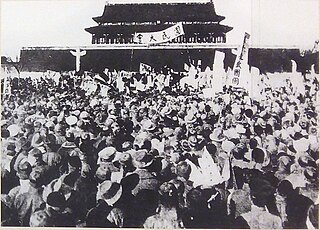
The May Fourth Movement was a Chinese anti-imperialist, cultural, and political movement which grew out of student protests in Beijing on May 4, 1919. Students gathered in front of Tiananmen to protest the Chinese government's weak response to the Treaty of Versailles decision to allow Japan to retain territories in Shandong that had been surrendered to Germany after the Siege of Tsingtao in 1914. The demonstrations sparked nation-wide protests and spurred an upsurge in Chinese nationalism, a shift towards political mobilization away from cultural activities, a move towards a populist base and away from traditional intellectual and political elites.
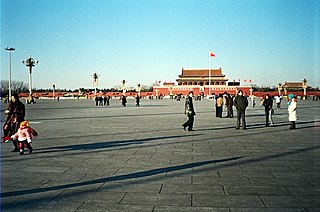
Tiananmen Square or Tian'anmen Square is a city square in the city center of Beijing, China, named after the eponymous Tiananmen located to its north, which separates it from the Forbidden City. The square contains the Monument to the People's Heroes, the Great Hall of the People, the National Museum of China, and the Mausoleum of Mao Zedong. Mao Zedong proclaimed the founding of the People's Republic of China in the square on October 1, 1949; the anniversary of this event is still observed there. The size of Tiananmen Square is 765 x 282 meters. It has great cultural significance as it was the site of several important events in Chinese history.

The Treaty of Versailles was the most important of the peace treaties of World War I. It ended the state of war between Germany and the Allied Powers. It was signed on 28 June 1919 in the Palace of Versailles, exactly five years after the assassination of Archduke Franz Ferdinand, which led to the war. The other Central Powers on the German side signed separate treaties. Although the armistice of 11 November 1918 ended the actual fighting, it took six months of Allied negotiations at the Paris Peace Conference to conclude the peace treaty. The treaty was registered by the Secretariat of the League of Nations on 21 October 1919.
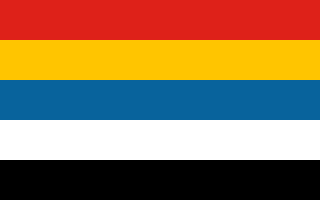
The Republic of China (ROC), between 1912 and 1949, was a sovereign state recognised as the official designation of China when it was based on Mainland China, prior to the relocation of its central government to Taiwan as a result of the Chinese Civil War. At a population of 541 million in 1949, it was the world's most populous country. Covering 11.4 million square kilometres, it consisted of 35 provinces, 1 special administrative region, 2 regions, 12 special municipalities, 14 leagues, and 4 special banners. The People's Republic of China (PRC), which rules mainland China today, considers ROC as a country that ceased to exist since 1949; thus, the history of ROC before 1949 is often referred to as Republican Era of China. The ROC, now based in Taiwan, today considers itself a continuation of the country, thus calling the period of its mainland governance as the Mainland Period of the Republic of China in Taiwan.
Italy occupies the Ottoman island of Rhodes.
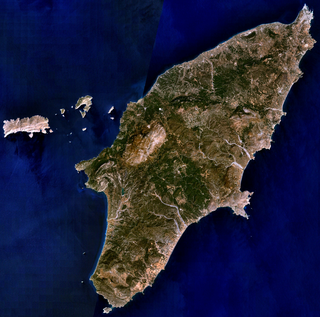
Rhodes is the largest and the historical capital of the Dodecanese islands of Greece. Administratively, the island forms a separate municipality within the Rhodes regional unit, which is part of the South Aegean administrative region. The principal town of the island and seat of the municipality is Rhodes. The city of Rhodes had 50,636 inhabitants in 2011. In 2022 the island has population of 124,851 people. It is located northeast of Crete, southeast of Athens. Rhodes has several nicknames, such as "Island of the Sun" due to its patron sun god Helios, "The Pearl Island", and "The Island of the Knights", named after the Knights of Saint John of Jerusalem, who ruled the island from 1310 to 1522.
The Royal Canadian Navy is created.

The Royal Canadian Navy is the naval force of Canada. The RCN is one of three environmental commands within the Canadian Armed Forces. As of 2021, the RCN operates 12 frigates, four attack submarines, 12 coastal defence vessels, eight patrol class training vessels, two offshore patrol vessels, and several auxiliary vessels. The RCN consists of 8,570 Regular Force and 4,111 Primary Reserve sailors, supported by 3,800 civilians. Vice-Admiral Angus Topshee is the current commander of the Royal Canadian Navy and chief of the Naval Staff.
The United States begins construction of the Panama Canal.

The Panama Canal is an artificial 82 km (51 mi) waterway in Panama that connects the Atlantic Ocean with the Pacific Ocean and divides North and South America. The canal cuts across the Isthmus of Panama and is a conduit for maritime trade. One of the largest and most difficult engineering projects ever undertaken, the Panama Canal shortcut greatly reduces the time for ships to travel between the Atlantic and Pacific oceans, enabling them to avoid the lengthy, hazardous Cape Horn route around the southernmost tip of South America via the Drake Passage or Strait of Magellan and the even less popular route through the Arctic Archipelago and the Bering Strait.
During a peaceful labor rally in Chicago, an unknown assailant threw a bomb into a crowd of police, which resulted in the deaths of seven police officers and at least four bystanders.
The labour movement or labor movement consists of two main wings: the trade union movement or labor union movement on the one hand, and the political labour movement on the other.The trade union movement consists of the collective organisation of working people developed to represent and campaign for better working conditions and treatment from their employers and, by the implementation of labour and employment laws, from their governments. The standard unit of organisation is the trade union.The political labour movement in many countries includes a political party that represents the interests of employees, often known as a "labour party" or "workers' party". Many individuals and political groups otherwise considered to represent ruling classes may be part of, and active in, the labour movement.

The Haymarket affair, also known as the Haymarket massacre, the Haymarket riot, the Haymarket Square riot, or the Haymarket Incident, was the aftermath of a bombing that took place at a labor demonstration on May 4, 1886, at Haymarket Square in Chicago, Illinois, United States. It began as a peaceful rally in support of workers striking for an eight-hour work day, the day after the events at the McCormick Harvesting Machine Company, during which one person was killed and many workers injured. An unknown person threw a dynamite bomb at the police as they acted to disperse the meeting, and the bomb blast and ensuing gunfire resulted in the deaths of seven police officers and at least four civilians; dozens of others were wounded.
Haymarket affair: In Chicago, United States, a homemade bomb is thrown at police officers trying to break up a labor rally, killing one officer. Ensuing gunfire leads to the deaths of a further seven officers and four civilians.

The Haymarket affair, also known as the Haymarket massacre, the Haymarket riot, the Haymarket Square riot, or the Haymarket Incident, was the aftermath of a bombing that took place at a labor demonstration on May 4, 1886, at Haymarket Square in Chicago, Illinois, United States. It began as a peaceful rally in support of workers striking for an eight-hour work day, the day after the events at the McCormick Harvesting Machine Company, during which one person was killed and many workers injured. An unknown person threw a dynamite bomb at the police as they acted to disperse the meeting, and the bomb blast and ensuing gunfire resulted in the deaths of seven police officers and at least four civilians; dozens of others were wounded.

An improvised explosive device (IED) is a bomb constructed and deployed in ways other than in conventional military action. It may be constructed of conventional military explosives, such as an artillery shell, attached to a detonating mechanism. IEDs are commonly used as roadside bombs, or homemade bombs.

The Chicago Police Department (CPD) is the municipal law enforcement agency of the U.S. city of Chicago, Illinois, under the jurisdiction of the City Council. It is the second-largest municipal police department in the United States, behind the New York City Police Department. It has approximately 9,000 officers and over 1,925 other employees. Tracing its roots back to the year of 1835, the Chicago Police Department is one of the oldest modern police departments in the world.
The National Association, the first professional baseball league, opens its first season in Fort Wayne, Indiana.
The National Association of Professional Base Ball Players (NAPBBP), often known simply as the National Association (NA), was the first fully-professional sports league in baseball. The NA was founded in 1871 and continued through the 1875 season. It succeeded and incorporated several professional clubs from the previous National Association of Base Ball Players (NABBP) of 1857–1870, sometimes called "the amateur Association". In turn, several NA clubs created the succeeding National League of Professional Baseball Clubs, which joined with the American League of Professional Base Ball Clubs to form Major League Baseball (MLB) in 1903.

Fort Wayne is a city in and the county seat of Allen County, Indiana, United States. Located in northeastern Indiana, the city is 18 miles (29 km) west of the Ohio border and 50 miles (80 km) south of the Michigan border. The city's population was 263,886 as of the 2020 Census, making it the second-most populous city in Indiana after Indianapolis, and the 76th-most populous city in the United States. It is the principal city of the Fort Wayne metropolitan area, consisting of Allen and Whitley counties which had an estimated population of 423,038 as of 2021. Fort Wayne is the cultural and economic center of northeastern Indiana. In addition to the two core counties, the combined statistical area (CSA) includes Adams, DeKalb, Huntington, Noble, Steuben, and Wells counties, with an estimated population of 649,105 in 2021.
The Naval Battle of Hakodate is fought in Japan.

The Naval Battle of Hakodate was fought from 4 to 10 May 1869, between the remnants of the Tokugawa shogunate navy, consolidated into the armed forces of the rebel Ezo Republic, and the newly formed Imperial Japanese Navy. It was one of the last stages of Battle of Hakodate during the Boshin War, and occurred near Hakodate in the northern Japanese island of Hokkaidō.
The Cornwall Railway opens across the Royal Albert Bridge linking Devon and Cornwall in England.

The Cornwall Railway was a 7 ft 1⁄4 in broad gauge railway from Plymouth in Devon to Falmouth in Cornwall, England, built in the second half of the nineteenth century. It was constantly beset with shortage of capital for the construction, and was eventually forced to sell its line to the dominant Great Western Railway.
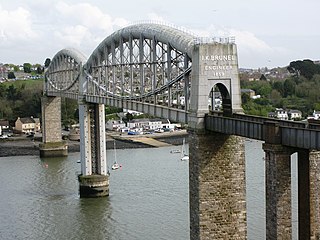
The Royal Albert Bridge is a railway bridge which spans the River Tamar in England between Plymouth, Devon and Saltash, Cornwall. Its unique design consists of two 455-foot (138.7 m) lenticular iron trusses 100 feet (30.5 m) above the water, with conventional plate-girder approach spans. This gives it a total length of 2,187.5 feet (666.8 m). It carries the Cornish Main Line railway in and out of Cornwall. It is adjacent to the Tamar Bridge which opened in 1962 to carry the A38 road.

Devon is a ceremonial and non-metropolitan county in South West England. The most populous settlement in Devon is the city of Plymouth, followed by Devon's county town, the city of Exeter. Devon is a coastal county with cliffs and sandy beaches. Home to the largest open space in southern England, Dartmoor, the county is predominately rural and has a relatively low population density for an English county.
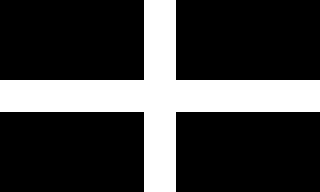
Cornwall is a historic county and ceremonial county in South West England. It is recognised as one of the Celtic nations, and is the homeland of the Cornish people. Cornwall is bordered to the north and west by the Atlantic Ocean, to the south by the English Channel, and to the east by the county of Devon, with the River Tamar forming the border between them. Cornwall forms the westernmost part of the South West Peninsula of the island of Great Britain. The southwesternmost point is Land's End and the southernmost Lizard Point. Cornwall has a population of 568,210 and an area of 3,563 km2 (1,376 sq mi). The county has been administered since 2009 by the unitary authority, Cornwall Council. The ceremonial county of Cornwall also includes the Isles of Scilly, which are administered separately. The administrative centre of Cornwall is Truro, its only city.
The Ancient Order of Hibernians, an Irish Catholic fraternal organization, was founded in New York City.

The Ancient Order of Hibernians is an Irish Catholic fraternal organization. Members must be male, Catholic, and either born in Ireland or of Irish descent. Its largest membership is now in the United States, where it was founded in New York City in 1836, however, a reference to its existence as early as 1819 was found in a letter written from a Samuel Castwell to the eventual 7th President of the United States, Andrew Jackson. In the letter, Jackson had been nominated for membership into Castwell's Hibernian Society. The letter was dated May 26, 1819. The name was adopted by groups of Irish immigrants in the United States, its purpose to act as guards to shield Catholic churches from anti-Catholic forces in the mid-19th century, and to assist Irish Catholic immigrants, especially those who faced discrimination or harsh coal mining working conditions. Many members in the coal mining area of Pennsylvania had a background with the Molly Maguires. It became an important focus of Irish American political activity.
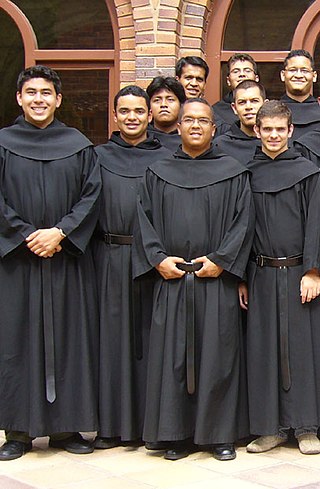
A fraternity or fraternal organization is an organization, society, club or fraternal order traditionally of men associated together for various religious or secular aims. Fraternity in the Western concept developed in the Christian context, notably with the religious orders in the Catholic Church during the Middle Ages. The concept was eventually further extended with medieval confraternities and guilds. In the early modern era, these were followed by fraternal orders such as Freemasons and Odd Fellows, along with gentlemen's clubs, student fraternities, and fraternal service organizations. Members are occasionally referred to as a brother or – usually in a religious context – Frater or Friar.
Formation of Ancient Order of Hibernians

The Ancient Order of Hibernians is an Irish Catholic fraternal organization. Members must be male, Catholic, and either born in Ireland or of Irish descent. Its largest membership is now in the United States, where it was founded in New York City in 1836, however, a reference to its existence as early as 1819 was found in a letter written from a Samuel Castwell to the eventual 7th President of the United States, Andrew Jackson. In the letter, Jackson had been nominated for membership into Castwell's Hibernian Society. The letter was dated May 26, 1819. The name was adopted by groups of Irish immigrants in the United States, its purpose to act as guards to shield Catholic churches from anti-Catholic forces in the mid-19th century, and to assist Irish Catholic immigrants, especially those who faced discrimination or harsh coal mining working conditions. Many members in the coal mining area of Pennsylvania had a background with the Molly Maguires. It became an important focus of Irish American political activity.
Emperor Napoleon arrives at Portoferraio on the island of Elba to begin his exile.

Napoleon Bonaparte, later known by his regnal name Napoleon I, was a French military commander and political leader who rose to prominence during the French Revolution and led successful campaigns during the Revolutionary Wars. He was the de facto leader of the French Republic as First Consul from 1799 to 1804, then Emperor of the French from 1804 until 1814 and again in 1815. Napoleon's political and cultural legacy endures to this day, as a highly celebrated and controversial leader. He initiated many liberal reforms that have persisted in society, and is considered one of the greatest military commanders in history, but between three and six million civilians and soldiers perished in what became known as the Napoleonic Wars.

Portoferraio is a town and comune in the province of Livorno, on the edge of the eponymous harbour of the island of Elba. It is the island's largest city. Because of its terrain, many of its buildings are situated on the slopes of a tiny hill bordered on three sides by the sea.

Elba is a Mediterranean island in Tuscany, Italy, 10 km (6.2 mi) from the coastal town of Piombino on the Italian mainland, and the largest island of the Tuscan Archipelago. It is also part of the Arcipelago Toscano National Park, and the third largest island in Italy, after Sicily and Sardinia. It is located in the Tyrrhenian Sea about 50 km (30 mi) east of the French island of Corsica.
King Ferdinand VII abolishes the Spanish Constitution of 1812, returning Spain to absolutism.

The Political Constitution of the Spanish Monarchy, also known as the Constitution of Cádiz and as La Pepa, was the first Constitution of Spain and one of the earliest codified constitutions in world history. The Constitution was ratified on 19 March 1812 by the Cortes of Cádiz, the first Spanish legislature that included delegates from the entire nation, including Spanish America and the Philippines. "It defined Spanish and Spanish American liberalism for the early 19th century."

Absolute monarchy is a form of monarchy in which the monarch rules in their own right or power. In an absolute monarchy, the king or queen is by no means limited and has absolute power, though a limited constitution may exist in some countries. These are often hereditary monarchies. On the other hand, in constitutional monarchies, in which the authority of the head of state is also bound or restricted by the constitution, a legislature, or unwritten customs, the king or queen is not the only one to decide, and their entourage also exercises power, mainly the prime minister.
Fourth Anglo-Mysore War: The Battle of Seringapatam: The siege of Seringapatam ends when the city is invaded and Tipu Sultan killed by the besieging British army, under the command of General George Harris.

The Fourth Anglo-Mysore War was a conflict in South India between the Kingdom of Mysore against the British East India Company and the Hyderabad Deccan in 1798–99.

The siege of Seringapatam was the final confrontation of the Fourth Anglo-Mysore War between the British East India Company and the Kingdom of Mysore. The British, with the allied Nizam of Hyderabad and Marathas, achieved a decisive victory after breaching the walls of the fortress at Seringapatam and storming the citadel. The leader of the British troops was Major General David Baird, among the lesser known allies were the Portuguese in Goa and Damaon. Tipu Sultan, the de-facto ruler after the death of his father, who had usurped the throne of Mysore, was killed in the action. The British restored the Wodeyar dynasty back to power after the victory through a treaty of subsidiary alliance, Krishnaraja Wodeyar III was crowned the King of Mysore. However, they retained indirect control of the kingdom's external affairs.

Srirangapatna, is a town and is the headquarters of one of the seven Taluks of Mandya district, in the Indian State of Karnataka. It gets its name from the Ranganthaswamy temple consecrated at around 984 CE. Later, under the British rule the city was renamed to Seringapatnam. Located near the city of Mandya, it is of religious, cultural and historic importance.

Tipu Sultan, also known as the Tiger of Mysore, was the ruler of the Kingdom of Mysore based in South India. He was a pioneer of rocket artillery. He introduced a number of administrative innovations during his rule, including a new coinage system and calendar, and a new land revenue system, which initiated the growth of the Mysore silk industry. He expanded the iron-cased Mysorean rockets and commissioned the military manual Fathul Mujahidin. He deployed the rockets against advances of British forces and their allies during the Anglo-Mysore Wars, including the Battle of Pollilur and Siege of Srirangapatna.

George Harris, 1st Baron Harris GCB was a British soldier.
The first running of the Epsom Derby horse race took place, won by Diomed, owned by Sir Charles Bunbury.

The 1780 Epsom Derby was the inaugural running of The Derby – the horse race which would become the "greatest turf event in the world" and after which more than 140 other horse races, including the famous Kentucky Derby, are named. It took place on 4 May 1780 on Epsom Downs in Surrey, England, and was won by Diomed, owned by Sir Charles Bunbury and ridden by Sam Arnull.

The Derby Stakes, also known as the Epsom Derby or the Derby, and currently as the Cazoo Derby for sponsorship reasons, is a Group 1 flat horse race in England open to three-year-old colts and fillies. It is run at Epsom Downs Racecourse in Surrey on the first Saturday of June each year, over a distance of one mile, four furlongs and 6 yards. It was first run in 1780.

Diomed, foaled in 1777, was an English Thoroughbred race horse who won the inaugural running of the Derby in 1780. He was subsequently a successful sire in the United States.

Sir Thomas Charles Bunbury, 6th Baronet was a British politician who sat in the House of Commons between 1761 and 1812. He was the first husband of Lady Sarah Lennox.
American Revolution: The Colony of Rhode Island and Providence Plantations became the first of the Thirteen Colonies to renounce its allegiance to the British Crown.

The American Revolution was an ideological and political revolution that occurred in British America between 1765 and 1791. The Americans in the Thirteen Colonies formed independent states that defeated the British in the American Revolutionary War (1775–1783), gaining independence from the British Crown and establishing the United States of America as the first nation-state founded on Enlightenment principles of liberal democracy.

The Colony of Rhode Island and Providence Plantations was one of the original Thirteen Colonies established on the east coast of America, bordering the Atlantic Ocean. It was founded by Roger Williams. It was an English colony from 1636 until 1707, and then a colony of Great Britain until the American Revolution in 1776, when it became the State of Rhode Island.

The Thirteen Colonies, also known as the Thirteen British Colonies, the Thirteen American Colonies, or later as the United Colonies, were a group of British colonies on the Atlantic coast of North America. Founded in the 17th and 18th centuries, they began fighting the American Revolutionary War in April 1775 and formed the United States of America by declaring full independence in July 1776. Just prior to declaring independence, the Thirteen Colonies in their traditional groupings were: New England ; Middle ; Southern. The Thirteen Colonies came to have very similar political, constitutional, and legal systems, dominated by Protestant English-speakers. The first of these colonies was Virginia Colony in 1607, a Southern colony. While all these colonies needed to become economically viable, the founding of the New England colonies, as well as the colonies of Maryland and Pennsylvania, were substantially motivated by their founders' concerns related to the practice of religion. The other colonies were founded for business and economic expansion. The Middle Colonies were established on an earlier Dutch colony, New Netherland. All the Thirteen Colonies were part of Britain's possessions in the New World, which also included territory in Canada, Florida, and the Caribbean.
Rhode Island becomes the first American colony to renounce allegiance to King George III.

The Colony of Rhode Island and Providence Plantations was one of the original Thirteen Colonies established on the east coast of America, bordering the Atlantic Ocean. It was founded by Roger Williams. It was an English colony from 1636 until 1707, and then a colony of Great Britain until the American Revolution in 1776, when it became the State of Rhode Island.

George III was King of Great Britain and of Ireland from 25 October 1760 until the union of the two kingdoms on 1 January 1801, after which he was King of the United Kingdom of Great Britain and Ireland until his death in 1820. He was the longest-lived and longest-reigning king in British history. He was concurrently Duke and Prince-elector of Brunswick-Lüneburg ("Hanover") in the Holy Roman Empire before becoming King of Hanover on 12 October 1814. He was a monarch of the House of Hanover but, unlike his two predecessors, he was born in Great Britain, spoke English as his first language and never visited Hanover.
The Municipality of Ilagan is founded in the Philippines.

A municipality is a local government unit (LGU) in the Philippines. It is distinct from city, which is a different category of local government unit. Provinces of the Philippines are divided into cities and municipalities, which in turn, are divided into barangays – villages. As of September 7, 2019, there are 1,488 municipalities across the country.

Ilagan, officially known as the City of Ilagan, is a 1st class component city and capital of the province of Isabela, Philippines. According to the 2020 census, it has a population of 158,218 people making it the most populous city in the province. It holds the title as the most number of voters in the province with 98,565 electorates. Ilagan was a first class municipality before it became a city.

The Philippines, officially the Republic of the Philippines, is an archipelagic country in Southeast Asia. It is situated in the western Pacific Ocean and consists of around 7,641 islands that are broadly categorized under three main geographical divisions from north to south: Luzon, Visayas, and Mindanao. The Philippines is bounded by the South China Sea to the west, the Philippine Sea to the east, and the Celebes Sea to the southwest. It shares maritime borders with Taiwan to the north, Japan to the northeast, Palau to the east and southeast, Indonesia to the south, Malaysia to the southwest, Vietnam to the west, and China to the northwest. The Philippines covers an area of 300,000 km2 (120,000 sq mi) and, as of 2021, it had a population of around 109 million people, making it the world's thirteenth-most populous country. The Philippines has diverse ethnicities and cultures throughout its islands. Manila is the country's capital, while the largest city is Quezon City; both lie within the urban area of Metro Manila.
Dutch explorer Peter Minuit arrives in New Netherland (present day Manhattan Island) aboard the See Meeuw.
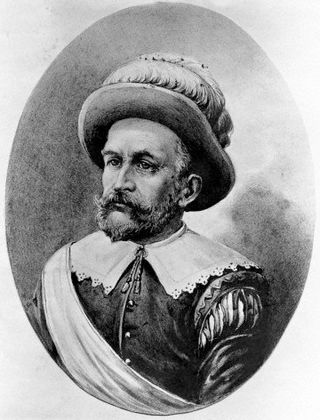
Peter Minuit was a Wallonian merchant from Tournai, in present-day Belgium. He was the 3rd Director of the Dutch North American colony of New Netherland from 1626 until 1631, and 3rd Governor of New Netherland. He founded the Swedish colony of New Sweden on the Delaware Peninsula in 1638.
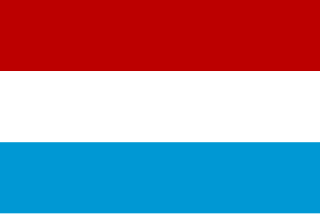
New Netherland was a 17th-century colonial province of the Dutch Republic that was located on the east coast of what is now the United States. The claimed territories extended from the Delmarva Peninsula to southwestern Cape Cod, while the more limited settled areas are now part of the U.S. states of New York, New Jersey, Delaware, Massachusetts and Connecticut, with small outposts in Pennsylvania and Rhode Island.

Manhattan, known regionally as the City, is the most densely populated and geographically smallest of the five boroughs of New York City. The borough is also coextensive with New York County, one of the original counties of the U.S. state of New York. Located near the southern tip of New York State, Manhattan is based in the Eastern Time Zone and constitutes both the geographical and demographic center of the Northeast megalopolis and the urban core of the New York metropolitan area, the largest metropolitan area in the world by urban landmass. Over 58 million people live within 250 miles of Manhattan, which serves as New York City’s economic and administrative center, cultural identifier, and the city’s historical birthplace. Manhattan has been described as the cultural, financial, media, and entertainment capital of the world, is considered a safe haven for global real estate investors, and hosts the United Nations headquarters. New York City is the headquarters of the global art market, centered in Manhattan.
Pope Alexander VI issued the papal bull Inter caetera, establishing a line of demarcation dividing the New World between Spain and Portugal.

Pope Alexander VI was head of the Catholic Church and ruler of the Papal States from 11 August 1492 until his death in 1503.

A papal bull is a type of public decree, letters patent, or charter issued by a pope of the Catholic Church. It is named after the leaden seal (bulla) that was traditionally appended to the end in order to authenticate it.

Inter caetera was a papal bull issued by Pope Alexander VI on the 4 May 1493, which granted to the Catholic Monarchs King Ferdinand II of Aragon and Queen Isabella I of Castile all lands to the "west and south" of a pole-to-pole line 100 leagues west and south of any of the islands of the Azores or the Cape Verde islands.
Pope Alexander VI divides the New World between Spain and Portugal along the Line of Demarcation.

Pope Alexander VI was head of the Catholic Church and ruler of the Papal States from 11 August 1492 until his death in 1503.

The "New World" is a term often used for the majority of Earth's Western Hemisphere, specifically the Americas. The term gained prominence in the early 16th century, during Europe's Age of Discovery, shortly after the Italian explorer Amerigo Vespucci concluded that America represented a new continent, and subsequently published his findings in a pamphlet he titled Mundus Novus. This realization expanded the geographical horizon of classical European geographers, who had thought the world consisted of Africa, Europe, and Asia, collectively now referred to as the Old World, or Afro-Eurasia. The Americas were also referred to as the fourth part of the world.
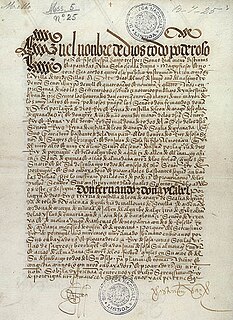
The Treaty of Tordesillas, signed in Tordesillas, Spain on 7 June 1494, and authenticated in Setúbal, Portugal, divided the newly discovered lands outside Europe between the Portuguese Empire and the Spanish Empire, along a meridian 370 leagues west of the Cape Verde islands, off the west coast of Africa. That line of demarcation was about halfway between the Cape Verde islands and the islands entered by Christopher Columbus on his first voyage, named in the treaty as Cipangu and Antillia.
Wars of the Roses: The Battle of Tewkesbury: Edward IV defeats a Lancastrian Army and kills Edward of Westminster, Prince of Wales.

The Wars of the Roses (1455–1487), known at the time and for more than a century after as the Civil Wars, were a series of civil wars fought over control of the English throne in the mid-to-late fifteenth century, fought between supporters of two rival cadet branches of the royal House of Plantagenet: Lancaster and York. The wars extinguished the male lines of the two dynasties, leading to the Tudor family inheriting the Lancastrian claim. Following the war, the Houses of Lancaster and York were united, creating a new royal dynasty, thereby resolving the rival claims. The conflict lasted for over thirty years, with various periods of greater and lesser levels of violent conflict during that period, between various rival contenders for the monarchy of England.
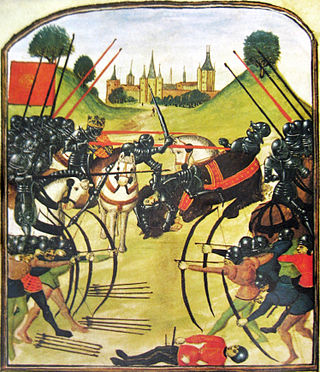
The Battle of Tewkesbury, which took place on 4 May 1471, was one of the decisive battles of the Wars of the Roses in England. King Edward IV and his forces loyal to the House of York completely defeated those of the rival House of Lancaster. The Lancastrian heir to the throne, Edward of Westminster, Prince of Wales, and many prominent Lancastrian nobles were killed during the battle or executed. The Lancastrian king, Henry VI, who was a prisoner in the Tower of London, died shortly after the battle, perhaps murdered. Tewkesbury restored political stability to England until the death of Edward IV in 1483.

Edward IV was King of England from 4 March 1461 to 3 October 1470, then again from 11 April 1471 until his death in 1483. He was a central figure in the Wars of the Roses, a series of civil wars in England fought between the Yorkist and Lancastrian factions between 1455 and 1487.

The House of Lancaster was a cadet branch of the royal House of Plantagenet. The first house was created when King Henry III of England created the Earldom of Lancaster—from which the house was named—for his second son Edmund Crouchback in 1267. Edmund had already been created Earl of Leicester in 1265 and was granted the lands and privileges of Simon de Montfort, 6th Earl of Leicester, after de Montfort's death and attainder at the end of the Second Barons' War. When Edmund's son Thomas, 2nd Earl of Lancaster, inherited his father-in-law's estates and title of Earl of Lincoln he became at a stroke the most powerful nobleman in England, with lands throughout the kingdom and the ability to raise vast private armies to wield power at national and local levels. This brought him—and Henry, his younger brother—into conflict with their cousin King Edward II, leading to Thomas's execution. Henry inherited Thomas's titles and he and his son, who was also called Henry, gave loyal service to Edward's son King Edward III.

Edward of Westminster, also known as Edward of Lancaster, was the only son of King Henry VI of England and Margaret of Anjou. He was killed aged seventeen at the Battle of Tewkesbury.
Swedish nobleman Engelbrekt Engelbrektsson was assassinated while leading a rebellion against Eric of Pomerania.

Engelbrekt Engelbrektsson was a Swedish nobleman, rebel leader and military boss of German ancestry. He was the leader of the Engelbrekt rebellion in 1434 against Eric of Pomerania, king of the Kalmar Union. Engelbrekt Parish and Engelbrekt Church (Engelbrektskyrkan) in the Church of Sweden Diocese of Stockholm were both named in his honor.

The Engelbrekt rebellion (Engelbrektsupproret) was an uprising during 1434–1436 led by Swedish miner and nobleman Engelbrekt Engelbrektsson and directed against Eric of Pomerania, the king of the Kalmar Union. The uprising, with its center in Dalarna and Bergslagen, spread throughout Svealand and Götaland. The rebellion caused erosion within the unity of the Kalmar Union, leading to the temporary expulsion of Danish forces from Sweden.

Eric of Pomerania was the ruler of the Kalmar Union from 1396 until 1439, succeeding his grandaunt, Queen Margaret I. He is known as Eric III as King of Norway (1389–1442), Eric VII as King of Denmark (1396–1439) and has been called Eric XIII as King of Sweden. Later, in all three countries he became more commonly known as Erik av Pommern, a pejorative intended to point out that he belonged elsewhere. Eric was ultimately deposed from all three kingdoms of the union, but in 1449 he inherited one of the partitions of the Duchy of Pomerania and ruled it as duke until his death in 1459.
Assassination of the Swedish rebel (later national hero) Engelbrekt Engelbrektsson

Engelbrekt Engelbrektsson was a Swedish nobleman, rebel leader and military boss of German ancestry. He was the leader of the Engelbrekt rebellion in 1434 against Eric of Pomerania, king of the Kalmar Union. Engelbrekt Parish and Engelbrekt Church (Engelbrektskyrkan) in the Church of Sweden Diocese of Stockholm were both named in his honor.
Religious reformers John Wycliffe and Jan Hus are condemned as heretics at the Council of Constance.
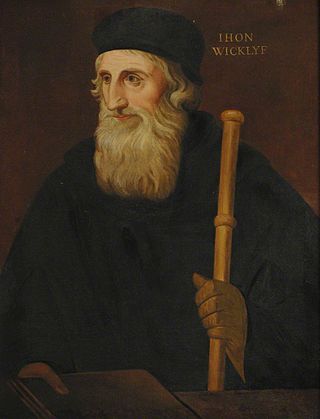
John Wycliffe was an English scholastic philosopher, theologian, biblical translator, reformer, Catholic priest, and a seminary professor at the University of Oxford. He became an influential dissident within the Catholic priesthood during the 14th century and is considered an important predecessor to Protestantism. Wycliffe questioned the privileged status of the clergy, who had bolstered their powerful role in England, and the luxury and pomp of local parishes and their ceremonies.

Jan Hus, sometimes anglicized as John Hus or John Huss, and referred to in historical texts as Iohannes Hus or Johannes Huss, was a Czech theologian and philosopher who became a Church reformer and the inspiration of Hussitism, a key predecessor to Protestantism, and a seminal figure in the Bohemian Reformation. Hus is considered by some to be the first Church reformer, even though some designate this honour to the theorist John Wycliffe. His teachings had a strong influence, most immediately in the approval of a reformed Bohemian religious denomination and, over a century later, on Martin Luther. Hus was a master, dean and rector at the Charles University in Prague 1409–1410.

Heresy in Christianity denotes the formal denial or doubt of a core doctrine of the Christian faith as defined by one or more of the Christian churches.

The Council of Constance was a 15th-century ecumenical council recognized by the Catholic Church, held from 1414 to 1418 in the Bishopric of Constance in present-day Germany. The council ended the Western Schism by deposing or accepting the resignation of the remaining papal claimants and by electing Pope Martin V. It was the last papal election to take place outside of Italy.
The Augustinian monastic order is constituted at the Lecceto Monastery when Pope Alexander IV issues a papal bull Licet ecclesiae catholicae.

Augustinians are members of Christian religious orders that follow the Rule of Saint Augustine, written in about 400 AD by Augustine of Hippo. There are two distinct types of Augustinians in Catholic religious orders dating back to the 12th–13th centuries:Various congregations of Canons Regular also follow the Rule of Saint Augustine, embrace the evangelical counsels and lead a semi-monastic life, while remaining committed to pastoral care appropriate to their primary vocation as priests. They generally form one large community which might serve parishes in the vicinity, and are organized into autonomous congregations. Several orders of friars who live a mixed religious life of contemplation and apostolic ministry. The largest and most familiar is the Order of Saint Augustine (OSA), founded in 1244 and originally known as the Hermits of Saint Augustine (OESA). They are commonly known as the Austin Friars in England. Two other orders, the Order of Augustinian Recollects and the Discalced Augustinians, were once part of the OSA under a single prior general. The Recollects, founded in 1588 as a reform movement in Spain, became autonomous in 1612. The Discalceds became an independent congregation in 1592, and were raised to the status of a separate mendicant order in 1610.
Monasticism, also referred to as monachism, or monkhood, is a religious way of life in which one renounces worldly pursuits to devote oneself fully to spiritual work. Monastic life plays an important role in many Christian churches, especially in the Catholic and Orthodox traditions as well as in other faiths such as Buddhism, Hinduism and Jainism. In other religions monasticism is criticized and not practiced, as in Islam and Zoroastrianism, or plays a marginal role, as in modern Judaism. Many monastics live in abbeys, convents, monasteries or priories to separate themselves from the secular world, unless they are in mendicant or missionary orders.

The continuing Monastery of the Holy Saviour at Lecceto in Tuscany, was the principal House of the order of the Hermit Friars of Saint Augustine in 1256, when Pope Alexander IV constituted the Augustinian order internationally. It was dedicated to Saint Saviour.
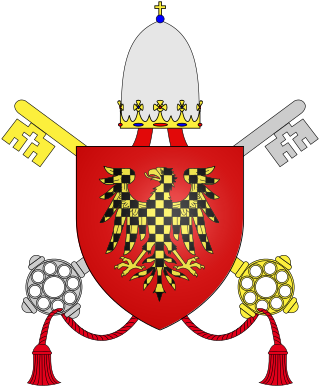
Pope Alexander IV was head of the Catholic Church and ruler of the Papal States from 12 December 1254 to his death in 1261.

A papal bull is a type of public decree, letters patent, or charter issued by a pope of the Catholic Church. It is named after the leaden seal (bulla) that was traditionally appended to the end in order to authenticate it.
Nick Kamen, English model, songwriter (b. 1962) deaths
Ivor Neville "Nick" Kamen was an English singer-songwriter, musician and model. He was best known for "Turn It Up" from 1989, the singles "Each Time You Break My Heart" from 1986 and "I Promised Myself" from 1990, as well as for appearing in a 1985 Levi's advert.
Don Shula, American football player and coach (b. 1930) deaths

Donald Francis Shula was an American football defensive back and coach who served as a head coach in the National Football League (NFL) from 1963 to 1995. The head coach of the Miami Dolphins for most of his career, Shula is the NFL's winningest head coach at 347 career victories and 328 regular season victories. He held his first head coaching position with the Baltimore Colts, whom he led for seven seasons, and spent his next 26 seasons with Miami. Shula had only two losing seasons during his 33 years as a head coach and led the Dolphins to two consecutive Super Bowl titles in Super Bowl VII and Super Bowl VIII. His first Super Bowl title during 1972 is the only perfect season in NFL history.
Greg Zanis, American carpenter and activist (b. 1950) deaths
Greg Zanis was an American carpenter who is most well known for building and delivering personalized crosses to shooting victims across the United States.
Jean-Baptiste Bagaza, Burundian politician (b. 1946) deaths

Jean-Baptiste Bagaza was a Burundian army officer and politician who ruled Burundi as president and de facto military dictator from November 1976 to September 1987.
William Bast, American screenwriter and author (b. 1931) deaths

William Bast was an American screenwriter and author. In addition to writing scripts for motion pictures and television, he was the author of two biographies of the screen actor James Dean. He often worked with his partner Paul Huson.
Ellen Albertini Dow, American actress (b. 1913) deaths

Ellen Rose Albertini Dow was an American film and television character actress and drama coach. She portrayed feisty old ladies and is best known as the rapping grandmother Rosie in The Wedding Singer (1998), performing "Rapper's Delight". Dow's other film roles include elderly lady Mary Cleary who "outs" her grandson in Wedding Crashers, Disco Dottie in 54, the recipient of Christopher Lloyd's character's slapstick in Radioland Murders and a choir nun in Sister Act. She was best known to small screen audiences for her guest appearances on sitcoms The Golden Girls and Will & Grace.
Marv Hubbard, American football player (b. 1946) deaths
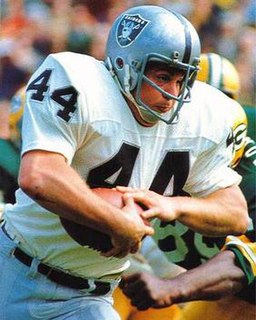
For the career criminal of the same name, see Battle of Alcatraz
Dick Ayers, American author and illustrator (b. 1924) deaths

Richard Bache Ayers was an American comic book artist and cartoonist best known for his work as one of Jack Kirby's inkers during the late-1950s and 1960s period known as the Silver Age of Comics, including on some of the earliest issues of Marvel Comics' The Fantastic Four. He is the signature penciler of Marvel's World War II comic Sgt. Fury and his Howling Commandos, drawing it for a 10-year run, and he co-created Magazine Enterprises' 1950s Western-horror character the Ghost Rider, a version of which he would draw for Marvel in the 1960s.
Elena Baltacha, Ukrainian-Scottish tennis player (b. 1983) deaths

Elena Sergeevna Baltacha was a Ukrainian-born British professional tennis player. Being a four-time winner of the AEGON Awards, she was also a long-term British No. 1, a position she held intermittently from 2002 to 2012. However, as a result of her absence from competition due to knee surgery, she dropped down the world rankings and at the time of her retirement on 18 November 2013, she was ranked as the world No. 221 and British No. 6. Her career-high ranking of world No. 49 was achieved in September 2010.
Edgar Cortright, American scientist and engineer (b. 1923) deaths

Edgar Maurice Cortright was a scientist and engineer, and senior official at the National Aeronautics and Space Administration (NASA) in the United States. His most prominent positions during his career were Director of NASA's Langley Research Center, and Chairman of the Apollo 13 Review Board which investigated the explosion that occurred during the Apollo 13 spaceflight in 1970.
Helga Königsdorf, German physicist and author (b. 1938) deaths

Helga Königsdorf was an East German author and physicist.
Ross Lonsberry, Canadian-American ice hockey player (b. 1947) deaths
David Ross Lonsberry was a Canadian professional ice hockey left winger who played 15 seasons in the National Hockey League (NHL) for the Boston Bruins, Los Angeles Kings, Philadelphia Flyers and Pittsburgh Penguins. He had his best seasons in a Flyers uniform and was a member of Philadelphia's back-to-back Stanley Cup championship teams in the mid-1970s.
Jean-Paul Ngoupandé, Central African politician, Prime Minister of the Central African Republic (b. 1948) deaths
Jean-Paul Ngoupandé was a Central African politician who was Prime Minister of the Central African Republic from 1996 to 1997. He stood as a presidential candidate in 1999 and 2005, and he served as Minister of Foreign Affairs from 2005 to 2006. He was President of the National Unity Party, an entity which he founded in the mid-1990s. He presented himself as an enemy of corruption and a defender of fair elections and democratic institutions.

This article lists the heads of government of the Central African Republic. There have been twenty-five heads of government of the Central African Republic and the Central African Empire. The office of Prime Minister, the head of government, was created when the Central African Republic became an autonomous territory of France in December 1958. It was originally the highest post of the Central African Republic, though France did maintain a governor in the territory. After the Central African Republic declared its independence and became a republic on 13 August 1960, David Dacko held both the Prime Minister and newly created President of the Central African Republic posts briefly before eliminating the Prime Minister position and placing all executive power in the office of the President.
Otis Bowen, American physician and politician, 44th Governor of Indiana (b. 1918) deaths

Otis Ray Bowen was an American politician and physician who served as the 44th Governor of Indiana from 1973 to 1981 and as Secretary of Health and Human Services in the Cabinet of President Ronald Reagan from 1985 to 1989.
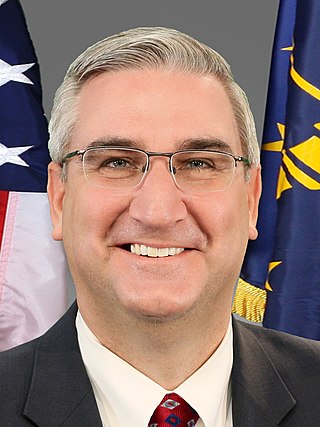
The governor of Indiana is the head of government of the State of Indiana. The governor is elected to a four-year term and is responsible for overseeing the day-to-day management of the functions of many agencies of the Indiana state government. The governor also shares power with other statewide executive officers, who manage other state government agencies. The governor works out of the Indiana Statehouse and holds official functions at the Indiana Governor's Residence in the state capital of Indianapolis.
Christian de Duve, English-Belgian cytologist and biochemist, Nobel Prize laureate (b. 1917) deaths

Christian René Marie Joseph, Viscount de Duve was a Nobel Prize-winning Belgian cytologist and biochemist. He made serendipitous discoveries of two cell organelles, peroxisome and lysosome, for which he shared the Nobel Prize in Physiology or Medicine in 1974 with Albert Claude and George E. Palade. In addition to peroxisome and lysosome, he invented scientific names such as autophagy, endocytosis, and exocytosis in a single occasion.

The Nobel Prize in Physiology or Medicine is awarded yearly by the Nobel Assembly at the Karolinska Institute for outstanding discoveries in physiology or medicine. The Nobel Prize is not a single prize, but five separate prizes that, according to Alfred Nobel's 1895 will, are awarded "to those who, during the preceding year, have conferred the greatest benefit to humankind". Nobel Prizes are awarded in the fields of Physics, Chemistry, Physiology or Medicine, Literature, and Peace.
Javier Diez Canseco, Peruvian sociologist and politician (b. 1948) deaths

Javier Diez Canseco Cisneros was a Peruvian politician and member of the Peruvian Congress representing the Socialist Party of Peru (PS), of which he was a founding member and also served as its Party President.
Mario Machado, Chinese-American journalist and actor (b. 1935) deaths

Mário Machado was a Portuguese-Chinese-American television and radio broadcaster and actor. He made television history when, in 1970, he became the first American of Chinese heritage to be an on-air television news reporter and anchor in Los Angeles and perhaps in the nation.
Morgan Morgan-Giles, English admiral and politician (b. 1914) deaths

Rear-Admiral Sir Morgan Charles Morgan-Giles, was a Royal Navy officer, decorated during the Second World War, who later served as a Conservative Member of Parliament. At the time of his death, he was the oldest living former member of the House of Commons.
César Portillo de la Luz, Cuban guitarist and composer (b. 1922) deaths
César Portillo de la Luz was a Cuban musician, lyricist and composer. Born in Havana, Cuba, Portillo is credited with founding the filin music genre. The Miami Herald described Portillo as "a fundamental author of Latin American music" and "one of Cuba's most celebrated composers". Portillo is also cited as "the most distinguished lyricist of his generation" and "one of the most prolific Cuban composers of the twentieth century".
Mort Lindsey, American pianist, composer, and conductor (b. 1923) deaths
Mort Lindsey, was an orchestrator, composer, pianist, conductor and musical director for Judy Garland, Barbra Streisand, Pat Boone, Jack Narz, and Merv Griffin.
Bob Stewart, American television producer, founded Stewart Tele Enterprises (b. 1920) deaths
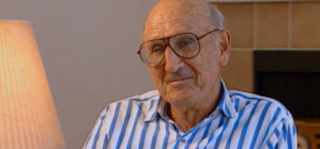
Bob Stewart was an American television game show producer. He was active in the TV industry from 1956 until his retirement in 1991.
Stewart Television was an American game show production company formed by Bob Stewart in 1964 originally based in New York City.
Adam Yauch, American rapper and director (b. 1964) deaths

Adam Nathaniel Yauch, better known under the stage name MCA, was an American rapper, bass player, filmmaker and a founding member of the hip hop group Beastie Boys. Besides his musical work, he also directed many of the band's music videos and did much of their promotional photography, often using the pseudonym Nathaniel Hörnblowér for such work.
Rashidi Yekini, Nigerian footballer (b. 1963) deaths

Rashidi Yekini was a Nigerian professional footballer who played as a forward. He is all-time top goalscorer for his nation.
Sammy McCrory, Northern Irish footballer (b. 1924) deaths
Samuel McKee McCrory was a professional footballer from Northern Ireland, most notably spending five years with Southend United and scoring the first goal at their Roots Hall stadium.
Dom DeLuise, American actor, director, and producer (b. 1933) deaths

Dominick DeLuise was an American actor, comedian, director, producer, chef, and author. Known primarily for his comedic performances, he rose to fame in the 1970s as a frequent guest on television variety shows. He is often identified for his work in the films of Mel Brooks and Gene Wilder, as well as a series of collaborations and appearances with Burt Reynolds. Beginning in the 1980s, his popularity expanded to younger audiences from voicing characters in several major animated productions, particularly those of Don Bluth.
Fred Baur, American chemist and founder of Pringles (b. 1918) deaths

Fredric John Baur was an American organic chemist and food storage scientist notable for designing and patenting the Pringles packaging. Baur filed for a patent for the tubular Pringles container and for the method of packaging the curved, stacked potato chip in the container in 1966, and it was granted in 1971. His other accomplishments included development of frying oils and freeze-dried ice cream. Baur was a graduate of the University of Toledo in Toledo, Ohio, and received both his master's and PhD degrees at Ohio State University. He also served in the U.S. Navy as an aviation physiologist. He was a resident of Cincinnati, Ohio.

Pringles is an American brand of stackable potato-based crisps. Originally sold by Procter & Gamble (P&G) in 1968 and marketed as "Pringle's Newfangled Potato Chips", the brand was sold in 2012 to the current owner, Kellogg's.
David Hackworth, American colonel and journalist (b. 1930) deaths
David Haskell Hackworth, also known as Hack, was a prominent military journalist and a famous former United States Army colonel who was decorated in both the Korean War and Vietnam War. Hackworth is known for his role in the creation and command of Tiger Force, a military unit which was formed in South Vietnam to apply guerrilla warfare tactics against Viet Cong guerrilla fighters.
David Reimer, Canadian man, born male but reassigned female and raised as a girl after a botched circumcision (b. 1965) deaths
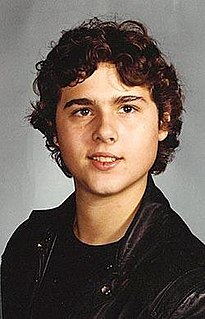
David Reimer was a Canadian man born male but raised as a girl following medical advice and intervention after his penis was severely injured during a botched circumcision in infancy.
Bonnie Lee Bakley, American model, wife of Robert Blake (b. 1956) deaths
Bonny Lee Bakley was the second wife of actor Robert Blake, who was her tenth husband. Bakley was fatally shot while sitting in Blake's parked car outside a Los Angeles-area restaurant in May 2001.

Robert Blake is a retired American actor known for his roles in the 1967 film In Cold Blood and the 1970s U.S. television series Baretta.
Hendrik Casimir, Dutch physicist and academic (b. 1909) deaths
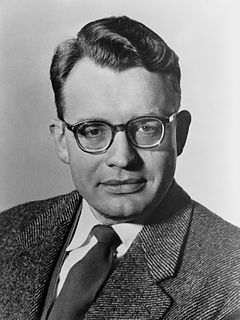
Hendrik Brugt Gerhard Casimir was a Dutch physicist best known for his research on the two-fluid model of superconductors in 1934 and the Casimir effect in 1948.
Max King, Australian rugby league player births

Max King is a professional rugby league footballer who plays as a prop and lock for the Canterbury-Bankstown Bulldogs in the NRL.
Pelayo Roza, Spanish sprint canoeist births

Pelayo Roza Fonticiella is a Spanish sprint canoeist.
Connie Wisniewski, American baseball player (b. 1922) deaths

Constance Wisniewski (Wiśniewski) was a starting pitcher and outfielder who played from 1944 through 1952 in the All-American Girls Professional Baseball League. Listed at 5' 8", 147 lb., she batted left-handed and threw right-handed.
Abi Masatora, Japanese sumo wrestler births
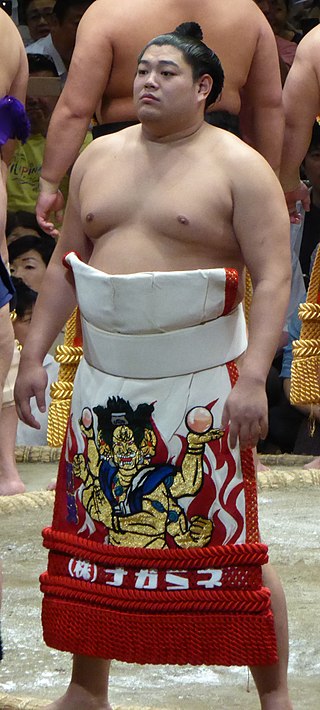
Abi Masatora is a Japanese professional sumo wrestler from Saitama Prefecture. He made his debut in May, 2013 and wrestles for Shikoroyama stable. He reached the top makuuchi division in January 2018 and has four special prizes for Fighting Spirit and one for Outstanding Performance. He has three gold stars for yokozuna upsets. His highest rank has been sekiwake. He won his first championship in November 2022.
Joseph Tapine, New Zealand rugby league player births

Joseph Tapine pronounced is a New Zealand professional rugby league footballer who plays as a prop, lock and second-row for the Canberra Raiders in the NRL, and for New Zealand and the New Zealand Māori at international level.
Jānis Bērziņš, Latvian basketball player births
Jānis Bērziņš is a Latvian professional basketball player for Legia Warszawa of the Polish Basketball League. Standing at 2.01 m he plays at the small forward position.
France Štiglic, Slovenian film director and screenwriter (b. 1919) deaths
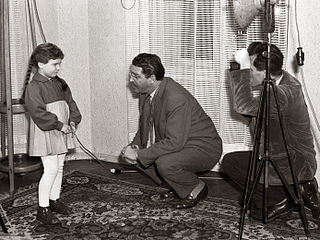
France Štiglic was a Slovenian film director and screenwriter. His 1948 film On Our Own Land was entered into the 1949 Cannes Film Festival. His film The Ninth Circle (1960) was Yugoslavia's submission for the Academy Award for Best Foreign Language Film at the 33rd Academy Awards, where it was shortlisted for the award.
Victor Oladipo, American basketball player births

Kehinde Babatunde Victor Oladipo is an American professional basketball player for the Miami Heat of the National Basketball Association (NBA). He played college basketball for the Indiana Hoosiers, where in the 2012-2013 season he was named the Sporting News Men's College Basketball Player of the Year, the Co-NABC Defensive Player of the Year, and a first-team All-American by the USBWA and Sporting News. That year he was also named the winner of the Adolph Rupp Trophy, given annually to the top player in men's NCAA Division I basketball.
Gregor Mackenzie, Scottish politician (b. 1927) deaths
James Gregor Mackenzie was a British Labour Party politician.
Brianne Jenner, Canadian women's ice hockey player births

Brianne Alexandra Jenner is a Canadian professional ice hockey player and a member of Canada's national women's hockey team, currently affiliated with the Toronto chapter of the Professional Women's Hockey Players Association (PWHPA). She made her debut for Canada at the 2010 Four Nations Cup and won a gold medal. She was also a member of the Cornell Big Red women's ice hockey program.
Mohammed Abdel Wahab, Egyptian singer-songwriter and mandolin player (b. 1902) deaths

Mohamed Abdel Wahab, also transliterated Mohamed Abd El-Wahhab, was a prominent 20th-century Egyptian singer, actor, and composer. He is best known for his Romantic and Egyptian patriotic songs.
Irina Falconi, American tennis player births

Irina Falconi is an Ecuadorian-born American former tennis player. She moved to Manhattan, New York, as a toddler. Her highest WTA singles ranking is world No. 63, which she reached in May 2016. Her career-high in doubles is No. 70, set in June 2013.
Ryan Morgan, Australian rugby league player births

Ryan Morgan is an Australian professional footballer who plays as a centre.
Duvashen Padayachee, Australian race car driver births
Duvashen Padayachee is an Australian racing driver.
Andrea Torres, Filipino actress and model births

Andrea Elizabeth Eugenio Torres is a Filipina singer, actress, host, dancer and commercial model. She is currently an exclusive contract artist of GMA Network. She is best known for her roles as Cindy Rodriguez in the WeTV Original series BetCin, Diane San Luis in Legal Wives, Venus Torralba-de Jesus in Alyas Robin Hood, Cecilia Fulgencio-Altamonte in Sana Ay Ikaw Na Nga, Juliet and Jasmine in The Better Woman, Annasandra in Ang Lihim ni Annasandra and Luisa in The Millionaire's Wife, among others.
Emily Remler, American guitarist (b. 1957) deaths
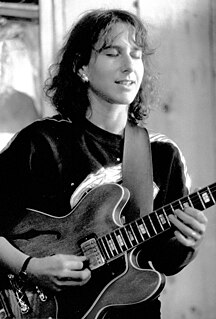
Emily Remler was an American jazz guitarist, active from the late 1970s until her death in 1990.
Dániel Gyurta, Hungarian swimmer births
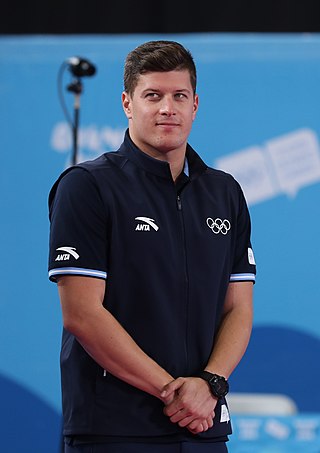
Dániel Gyurta is a Hungarian former competitive swimmer who mainly competed in the 200-metre breaststroke. In 2016, Gyurta became a member of the International Olympic Committee (IOC), he is a member of the European Olympic Committees (EOC) Athletes' Commission since 2013 and a member of the Athletes Commission since 2016.
Henna Lindholm, Finnish figure skater births

Henna Lindholm is a Finnish former ice dancer. With partner Ossi Kanervo, she is the 2012 Nordic champion, the 2014 Bavarian Open bronze medalist, and a three-time Finnish national champion.
Rory McIlroy, Northern Irish golfer births

Rory Daniel McIlroy is a professional golfer from Northern Ireland who is a member of both the European and PGA Tours. He is a current world number one in the Official World Golf Ranking, having spent over 100 weeks in that position during his career. He is a four-time major champion, winning the 2011 U.S. Open, 2012 PGA Championship, 2014 Open Championship and 2014 PGA Championship. Along with Jack Nicklaus and Tiger Woods, he is one of three players to win four majors by the age of 25.
Aris Tatarounis, Greek basketball player births

Aris Tatarounis is a Greek former professional basketball player. At a height of 1.92 m tall, he played at the point guard and shooting guard positions.
James van Riemsdyk, American ice hockey player births

James van Riemsdyk is an American professional ice hockey left winger for the Philadelphia Flyers of the National Hockey League (NHL). Between 2012 and 2018, he played in the NHL for the Toronto Maple Leafs.
Radja Nainggolan, Belgian footballer births

Radja Nainggolan is a Belgian professional footballer who plays as a midfielder for Belgian First Division A club Antwerp.
Lillian Estelle Fisher, American historian of Spanish America (b. 1891) deaths
Lillian Estelle Fisher was one of the first women to earn a doctorate in Latin American history in the U.S. She published important works on Spanish colonial administration; a biography of Manuel Abad y Queipo, reform bishop-elect of Michoacan; and a monograph on the Tupac Amaru rebellion in Peru. As distinguished colonial Latin American historian John J. TePaske put it in 1968, "At least three generations of graduate students have studied the works of Lillian Estelle Fisher." Fisher is included as an example of sexual/gender discrimination in the historical profession.
Cesc Fàbregas, Spanish footballer births

Francesc "Cesc" Fàbregas Soler is a Spanish professional footballer who plays as a central midfielder for Italian Serie B club Como.
Jorge Lorenzo, Spanish motorcycle racer births

Jorge Lorenzo Guerrero is a Spanish former professional motorcycle racer. He is a five-time World Champion, with three MotoGP World Championships and two 250cc World Championships.
Paul Butterfield, American singer and harmonica player (b. 1942) deaths

Paul Vaughn Butterfield was an American blues harmonica player, singer and band leader. After early training as a classical flautist, he developed an interest in blues harmonica. He explored the blues scene in his native Chicago, where he met Muddy Waters and other blues greats, who provided encouragement and opportunities for him to join in jam sessions. He soon began performing with fellow blues enthusiasts Nick Gravenites and Elvin Bishop.
Cathryn Damon, American actress (b. 1930) deaths

Cathryn Lee Damon was an American actress, best known for her roles on television sitcoms in the 1970s and 1980s. She is best known as Mary Campbell in Soap (1977-1981).
Devan Dubnyk, Canadian ice hockey player births

Devan Dubnyk is a Canadian former professional ice hockey goaltender who played in the National Hockey League (NHL). He was originally drafted by the Edmonton Oilers in the first round, 14th overall, of the 2004 NHL Entry Draft.
George Hill, American basketball player births

George Jesse Hill Jr. is an American professional basketball player for the Milwaukee Bucks of the National Basketball Association (NBA). While playing for Indiana University–Purdue University Indianapolis (IUPUI) he received many honors, including Summit League Player of the Year and was an honorable mention All-American his junior season.
Ravi Bopara, English cricketer births
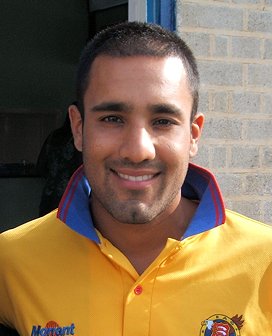
Ravinder Singh Bopara is an English cricketer who plays for Sussex County Cricket Club in one day cricket. Originally a top-order batsman, his developing medium pace bowling has made him a batting all rounder in the one day game. Bopara has also played for Karachi Kings in the Pakistan Super League, Kings XI Punjab in the Indian Premier League, Sydney Sixers in the Big Bash League and Chittagong Vikings in the Bangladesh Premier League.
Anthony Fedorov, Ukrainian-born American singer and actor births
Anatoliy Vladimirovich "Anthony" Fedorov is an American singer and actor who is former lead singer for the Chicago band 7th Heaven. He rose to fame as the fourth place finalist on the fourth season of American Idol.
Fernandinho, Brazilian footballer births

Fernando Luiz Roza, known as Fernandinho, is a Brazilian professional footballer who plays as a midfielder for Campeonato Brasileiro Série A club Athletico Paranaense. He has captained the Brazil national team on many occasions.
Lester "Bo" McCalebb, American-Macedonian professional basketball player births

Lester "Bo" McCalebb is an American-Macedonian former professional basketball player. He represented the senior Macedonian national team internationally. Standing at 1.83 m, he played at the point guard position. Born and raised in New Orleans, he attended the University of New Orleans. A two-time All-EuroLeague selection, McCalebb was part of the All-Tournament Team at EuroBasket 2011.
Jamie Adenuga, English MC and rapper births

Jamie Adenuga, known professionally as Jme, is a British grime MC, songwriter, record producer and DJ who was born in Hackney, and raised in Tottenham. He is the co-founder of the crew and label Boy Better Know. He also serves as a sole owner and director of an associated company, Boy Better Know Limited, which he incorporated in 2008. He was previously part of the grime collective Meridian Crew and later Roll Deep alongside his older brother, Skepta. He is popularly known as one of the greatest grime artists of all time.
Fikri Sönmez, Turkish tailor and politician (b. 1938) deaths
Fikri Sönmez was a Turkish socialist politician, who served as the mayor of Fatsa district of Ordu Province between 1979 and 1980.
Clarence Wiseman, English-Canadian 10th General of The Salvation Army (b. 1907) deaths

Clarence Dexter Wiseman, was the tenth General of The Salvation Army from 1974 to 1977.

General is the title of the international leader and Chief Executive Officer (CEO) of the Salvation Army, a Christian denomination with extensive charitable social services that gives quasi-military rank to its ministers. The General is elected by the High Council of The Salvation Army and serves a term of five years, which may be extended to seven years. Brian Peddle, the current general, assumed the position in August 2018 upon the retirement of Andre Cox. The organisation's founder, William Booth, was the first and longest-serving general. There have been 21 generals as of 2018.
Manjural Islam Rana, Bangladeshi cricketer (d. 2007) births
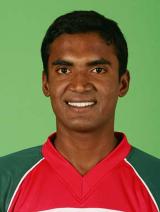
Manjural Islam Rana, also known as Qazi Manjural Islam, was a Bangladeshi cricketer who played six Tests and 25 One Day Internationals for Bangladesh. Born in Khulna, he was a slow left-arm orthodox spin bowler. He played for Khulna Division at domestic level and made his One Day International (ODI) debut in November 2003 against England. Three months later, Rana played his first Test against Zimbabwe. On 16 March 2007, he died of severe head injuries sustained in a road traffic accident at the age of 22.
Brad Maddox, American wrestler and referee births

Joshua Tyler Kluttz is an American retired professional wrestler and former professional wrestling referee. He is best known for his tenure in WWE, where he performed under the ring name Brad Maddox.
Sarah Meier, Swiss figure skater births

Sarah van Berkel is a Swiss former figure skater. She is the 2011 European champion, a two-time European silver medalist, the 2006 Grand Prix Final bronze medalist, and an eight-time Swiss national champion.
Montell Owens, American football player births
Montell Ernest Owens is a former American football fullback. He played college football at Maine. Owens was signed by the Jacksonville Jaguars as an undrafted free agent in 2006. He has also played for the Detroit Lions and Chicago Bears.
Kevin Slowey, American baseball player births

Kevin Michael Slowey is an American former professional baseball pitcher. Slowey was selected by the Minnesota Twins with the 73rd pick in the second round of the 2005 Major League Baseball Draft. He also played for the Miami Marlins. After his playing career ended he joined the Major League Baseball Players Association as an assistant.
Diana Dors, English actress (b. 1931) deaths

Diana Dors was an English actress and singer.
Dan Christian, Australian cricketer births

Daniel Trevor Christian is an Australian professional cricketer with Aboriginal ancestry. He is considered to be a Twenty20 cricket specialist and has played for franchises all over the globe. Christian is known as a powerful hitter and a useful medium pacer. CricInfo's Peter English described him as a "natural all-rounder". He is seen as a cricket role model for Australia's indigenous population.
Derek Roy, Canadian ice hockey player births

Derek Leonard Roy is a Canadian former professional ice hockey centre who played in the National Hockey League (NHL) with the Buffalo Sabres, Dallas Stars, Vancouver Canucks, St. Louis Blues, Nashville Predators and the Edmonton Oilers. He was originally drafted in the second round, 32nd overall, by the Buffalo Sabres in the 2001 NHL Entry Draft.
Robert Zwinkels, Dutch footballer births

Robert Zwinkels is a Dutch footballer who plays as a goalkeeper.
Nino Sanzogno, Italian conductor and composer (b. 1911) deaths
Nino Sanzogno was an Italian conductor and composer.
Kleopas Giannou, Greek footballer births
Kleopas Giannou is a Greek former professional footballer who played as a goalkeeper.
Markus Rogan, Austrian swimmer births

Markus Antonius Rogan is a retired Austrian swimmer, who won two silver medals at the 2004 Summer Olympics in Athens, Greece and a gold medal for 200 m backstroke at the 2008 World Short Course Championships in Manchester. He also was the world record holder in 200 metres backstroke in that year.
Giorgos Tsiaras, Greek basketball player births
Georgios Tsiaras is a Greek former professional basketball player and the current team manager of Peristeri of the Greek Basket League and the Basketball Champions League. During his playing career, he mainly covered the power forward position, but he could also assist at the center position.
Eric Djemba-Djemba, Cameroon footballer births

Eric Daniel Djemba-Djemba is a Cameroonian former professional footballer who played as a midfielder. He previously played club football in France, England, Qatar, Denmark, Israel, Serbia, Scotland, India and Indonesia. In international competition, he represented Cameroon, having appeared for his country 34 times, including at the 2002 FIFA World Cup.
Dallon Weekes, American singer-songwriter and musician births

Dallon James Weekes is an American singer, songwriter, musician, and record producer. He is best known as a member of Panic! at the Disco from 2009 to 2017, performing in the band as a bassist, keyboardist, backing vocalist, and songwriter. He was also the frontman of the power pop band and later solo musical project The Brobecks. Weekes currently performs as the frontman for the rock duo I Dont Know How But They Found Me.
C. Loganathan, Sri Lankan banker (b. 1913) deaths

Chelliah Loganathan was a Ceylon Tamil banker and the first Ceylonese general manager of the Bank of Ceylon.
Andrew Raycroft, Canadian ice hockey player births

Andrew Joseph Ernest Raycroft is a Canadian former professional ice hockey goaltender. Originally drafted by the Boston Bruins of the National Hockey League (NHL) 135th overall in 1998, he won the Calder Memorial Trophy with the club in 2004 as rookie of the year. Raycroft has also played for the Toronto Maple Leafs, Colorado Avalanche, Vancouver Canucks, Dallas Stars, Hockey Milano Rossoblu and IF Björklöven.
Josip Broz Tito, Yugoslav field marshal and politician, 1st President of Yugoslavia (b. 1892) deaths

Josip Broz, commonly known as Tito, was a Yugoslav communist revolutionary and statesman, serving in various positions from 1943 until his death in 1980. During World War II, he was the leader of the Yugoslav Partisans, often regarded as the most effective resistance movement in German-occupied Europe. He also served as the president of the Socialist Federal Republic of Yugoslavia from 14 January 1953 until his death on 4 May 1980.

The president of the Socialist Federal Republic of Yugoslavia, or the president of the Republic for short, was the head of state of that country from 14 January 1953 to 4 May 1980. Josip Broz Tito was the only person to occupy the office. Tito was also concurrently President of the League of Communists of Yugoslavia. Tito was eventually declared president for life and with his death in 1980 the office was discontinued and the new office of President of the Presidency of Yugoslavia took its place.
Lance Bass, American singer, dancer, and producer births

James Lance Bass is an American singer, dancer, actor, film, and television producer. He grew up in Mississippi and rose to fame as the bass singer for the American pop boy band NSYNC. NSYNC's success led Bass to work in film and television. He starred in the 2001 film On the Line, which his company, Bacon & Eggs, also produced. Bass later formed a second production company, Lance Bass Productions, as well as a now-defunct music management company, Free Lance Entertainment, a joint venture with Mercury Records.
Kristin Harmel, American journalist and author births
Kristin Harmel is an American novelist. Born in Newton, Massachusetts which is a suburb of Boston, Harmel gained her first writing experience at the age of 16 as a sports reporter for the St. Petersburg Times, and Tampa Bay AllSports magazine while still attending Northeast High School in St. Petersburg, Florida.
Marie Poissonnier, French pole vaulter births
Marie Poissonnier is a female pole vaulter from France. Her personal best jump is 4.46 metres, achieved in July 2002 in Saint-Etienne.
Lesley Vainikolo, Tongan rugby player births

Lesley Paea 'I'muli Vainikolo is a former professional rugby league and rugby union footballer. A dual code international, he has played for the New Zealand Kiwis in rugby league and England in rugby union.
Erin Andrews, American sportscaster and journalist births

Erin Jill Andrews is an American sportscaster, television personality, and actress. She rose to prominence as a correspondent on the American cable sports channel ESPN after joining the network in 2004. She later joined Fox Sports in 2012 and has since become the lead sideline reporter for the network's NFL broadcasting team. In 2010, she also gained further recognition from placing third on the tenth season of ABC's Dancing with the Stars and eventually co-hosted the show from 2014 to 2019 with Tom Bergeron.
Igor Biscan, Croatian footballer births

Igor Bišćan is a Croatian professional football manager and former player who is the manager of the Croatia national under-21 team. In his playing career, he was a versatile player and could play almost every position in the defence or midfield, but featured mostly as a central midfielder, or as a central defender in his latter years.
Brett Burton, Australian footballer births

Brett Burton is a retired Australian rules footballer who played in the Australian Football League. He was picked up at Pick 16 in the 1998 AFL Draft by the Adelaide Football Club. He is noted for his spectacular high marking, which saw him win the AFL Mark of the Year in 2009, and freakish goal sense.
Vladimíra Uhlířová, Czech tennis player births

Vladimíra Uhlířová is a retired Czech tennis player.
John Tripp, Canadian-German ice hockey player births

John Tripp is a Canadian-born German professional ice hockey coach and former player. He served as head coach at Braehead Clan until March 2018.
Ben Grieve, American baseball player births
Ben Grieve is an American former professional baseball outfielder. He batted left and threw right. In his nine-season career, he played with the Oakland Athletics (1997–2000), Tampa Bay Devil Rays (2001–2003), Milwaukee Brewers (2004), and Chicago Cubs (2004–2005).
Rory Hamill, Northern Irish international footballer births
Rory Hamill is former footballer from in Northern Ireland.
Jason Michaels, American baseball player births

Jason Drew Michaels, nicknamed "J-Mike", is an American retired Major League Baseball outfielder. He played for the Philadelphia Phillies, Cleveland Indians, Pittsburgh Pirates, and Houston Astros.
Indrek Visnapuu, Estonian basketball player and coach births
Indrek Visnapuu is an Estonian basketball coach and former player, who last coached Audentes/Noortekoondis of the Korvpalli Meistriliiga (KML).
Frank Strahan, Australian public servant (b. 1886) deaths
Frank Strahan was a senior Australian public servant. Between 1935 and 1949, he was Secretary of the Prime Minister's Department.
Moe Howard, American actor, singer, and screenwriter (b. 1897) deaths
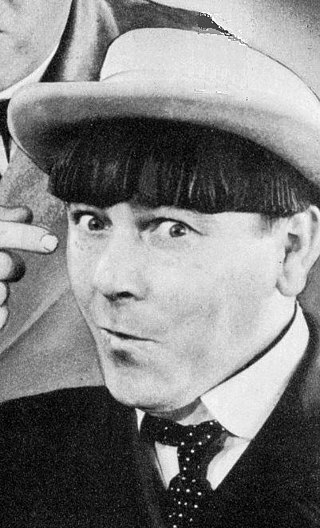
Moses Harry Horwitz, known professionally as Moe Howard, was an American comedian and actor. He is best known as the leader of The Three Stooges, the farce comedy team who starred in motion pictures and television for four decades. That group initially started out as Ted Healy and His Stooges, an act that toured the vaudeville circuit. Moe's distinctive hairstyle came about when he was a boy and cut off his curls with a pair of scissors, producing an irregular shape approximating a bowl cut.
Miguel Cairo, Venezuelan baseball player and coach births
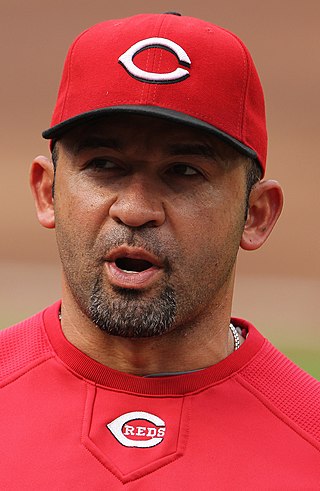
Miguel Jesús Cairo [ki'-row], is a Venezuelan former professional baseball infielder and most recently the bench coach for the Chicago White Sox, who played in Major League Baseball (MLB) for nine different clubs in a 17-year career, spanning from 1996 to 2012. During his playing days, Cairo stood 6 feet 1 inch (1.85 m) tall and weighed 225 pounds (102 kg) while batting and throwing right-handed. While primarily a second baseman, Cairo was able to play all the infield positions and as a corner outfielder. He was also used for pinch-hitting duties late in his career. He was acting manager for the White Sox in the latter part of the 2022 season as manager Tony La Russa stepped away due to health concerns.
Tony McCoy, Northern Irish jockey and sportscaster births
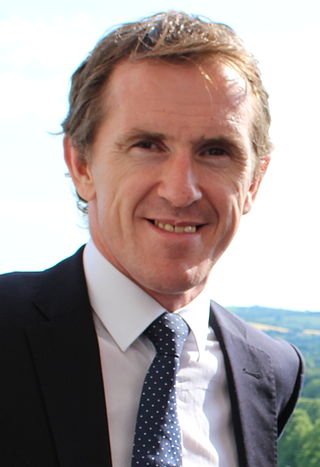
Sir Anthony Peter McCoy, commonly known as AP McCoy or Tony McCoy, is a Northern Irish former National Hunt horse racing jockey. Based in Ireland and the UK, McCoy rode a record 4,358 winners, and was Champion Jockey a record 20 consecutive times, every year that he was a professional.
Matthew Barnaby, Canadian ice hockey player and sportscaster births
Matthew Barnaby is a Canadian former professional ice hockey right winger. He played in the National Hockey League (NHL) for the Buffalo Sabres, Pittsburgh Penguins, Tampa Bay Lightning, New York Rangers, Colorado Avalanche, Chicago Blackhawks, and Dallas Stars.
Guillermo Barros Schelotto, Argentinian footballer and coach births

Guillermo Barros Schelotto is an Argentine football manager and former forward who currently manages the Paraguayan national team.
John Madden, Canadian ice hockey player and coach births

John J. Madden is a Canadian former professional ice hockey centre. An undrafted player from the University of Michigan, he won the Stanley Cup three times during his National Hockey League (NHL) career: two with the New Jersey Devils and one with the Chicago Blackhawks. Madden was noted during his career for his ability to kill penalties, play both ends of the ice and score shorthanded goals.
Jane Bowles, American author and playwright (b. 1917) deaths

Jane Bowles was an American writer and playwright.
Manny Aybar, Dominican baseball player births
Manuel Antonio Aybar is a retired pitcher who has played in Major League Baseball and Korea Baseball Organization. He bats and throws right-handed.
Mike Dirnt, American bass player and songwriter births

Michael Ryan Pritchard, better known by his stage name Mike Dirnt, is an American rock musician who is the co-founder, bassist, backing and occasional lead vocalist, and former guitarist of Green Day. He has also played in several other bands, including the Frustrators. His stage name Dirnt was originally a nickname that his friends from grade school gave him, as he constantly played "air bass/guitar" and made a "dirnt, dirnt, dirnt" noise while pretending to pluck the strings.
Father Chrysanthus, Dutch arachnologist (b. 1905) deaths

Father Chrysanthus O.F.M. Cap., born Wilhelmus Egbertus Antonius Janssen, was a Dutch priest and biology teacher. He was known for his studies in arachnology. Initially he was concerned with the spiders of the Netherlands but he became a specialist on New Guinea spiders. Two spider species were named in his honor following his death.
Edward Calvin Kendall, American chemist and academic, Nobel Prize laureate (b. 1886) deaths

Edward Calvin Kendall was an American chemist. In 1950, Kendall was awarded the Nobel Prize for Physiology or Medicine along with Swiss chemist Tadeusz Reichstein and Mayo Clinic physician Philip S. Hench, for their work with the hormones of the adrenal gland. Kendall did not only focus on the adrenal glands, he was also responsible for the isolation of thyroxine, a hormone of the thyroid gland and worked with the team that crystallized glutathione and identified its chemical structure.

The Nobel Prize in Physiology or Medicine is awarded yearly by the Nobel Assembly at the Karolinska Institute for outstanding discoveries in physiology or medicine. The Nobel Prize is not a single prize, but five separate prizes that, according to Alfred Nobel's 1895 will, are awarded "to those who, during the preceding year, have conferred the greatest benefit to humankind". Nobel Prizes are awarded in the fields of Physics, Chemistry, Physiology or Medicine, Literature, and Peace.
Joe Borowski, American baseball player and sportscaster births

Joseph Thomas Borowski is a sports broadcaster for the Arizona Diamondbacks, as well as a former professional baseball right-handed relief pitcher. He played in Major League Baseball for the Baltimore Orioles, Atlanta Braves, New York Yankees, Chicago Cubs, Tampa Bay Devil Rays, Florida Marlins, and Cleveland Indians.
Miles Stewart, Australian triathlete births
Miles Stewart is an athlete from Australia, who competes in triathlon.
William Brown Meloney, writer and theatrical producer (b. 1902) deaths

William Brown Meloney V was a journalist, novelist, short-story writer and theatrical producer.
Gregg Alexander, American singer-songwriter and producer births
Gregg Alexander is an American musician, singer-songwriter and producer. He is best known as the frontman of the New Radicals, who had an international hit with "You Get What You Give" in late 1998. In the late 1980s and early 1990s, he recorded two solo albums, Michigan Rain and Intoxifornication. He dissolved the New Radicals in 1999 to focus on production and songwriting work, winning a Grammy Award for the song "The Game of Love" in 2003. He later co-wrote songs for the film Begin Again, including "Lost Stars", which was nominated for an Academy Award for Best Original Song.
Will Arnett, Canadian actor and producer births

William Emerson Arnett is a Canadian actor, comedian and producer. He is best known for his roles as Gob Bluth in the Fox/Netflix series Arrested Development and as the titular character in the Netflix series BoJack Horseman (2014–2020). He has appeared in films such as Let's Go to Prison (2006), Blades of Glory (2007), Semi-Pro (2008), G-Force (2009), Jonah Hex (2010), Teenage Mutant Ninja Turtles (2014) and its sequel Teenage Mutant Ninja Turtles: Out of the Shadows (2016), and Show Dogs (2018).
Giovanni Mirabassi, Italian jazz musician births
Giovanni Mirabassi is a Paris-based Italian jazz pianist, born 4 May 1970 in Perugia, Italy. Self-taught, he learned by listening to Bud Powell, Art Tatum, and Oscar Peterson. He is strongly influenced by Enrico Pieranunzi. At seventeen, after a few important experiences in Italy, he settled in Paris in 1992.
Dawn Staley, American basketball player births
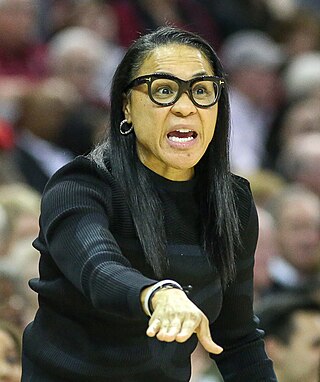
Dawn Michelle Staley is an American basketball Hall of Fame player and coach, who is currently the head coach for the South Carolina Gamecocks. Staley won three Olympic gold medals with Team USA as a player and later was head coach of another U.S. gold-medal winning team. Staley was elected to carry the United States flag at the opening ceremony of the 2004 Summer Olympics. After playing point guard for the University of Virginia under Debbie Ryan, and winning the gold medal at the 1996 Summer Olympics, she went on to play professionally in the American Basketball League and the WNBA. In 2011, fans named Staley one of the Top 15 players in WNBA history. Staley was inducted into the Women's Basketball Hall of Fame in 2012. She was elected to the Naismith Memorial Basketball Hall of Fame in 2013.
Paul Wiseman, New Zealand cricketer and coach births
Paul John Wiseman is a former New Zealand cricketer. "Wiz", as he was nicknamed, was an off spinner who took 9–13 for Canterbury against Central Districts in Christchurch to record the second best figures for a New Zealand bowler. Internationally, however, he was unable to forge a significant career due to the incumbency of first-choice spinner Daniel Vettori.
Micah Aivazoff, Canadian ice hockey player births
Micah Aivazoff is a Canadian former professional ice hockey centre. He played 92 games in the National Hockey League with the Detroit Red Wings, Edmonton Oilers, and New York Islanders between 1993 and 1996. The rest of his career, which lasted from 1989 to 2002, was mainly spent in the minor leagues.
Franz Resch, Austrian footballer and manager births
Franz Resch is a retired Austrian football player and a football manager currently managing FC Lauterach.
Osbert Sitwell, English-Italian author and poet (b. 1892) deaths
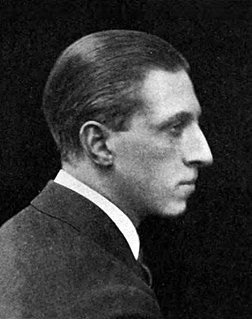
Sir Francis Osbert Sacheverell Sitwell, 5th Baronet CH was an English writer. His elder sister was Edith Sitwell and his younger brother was Sacheverell Sitwell. Like them, he devoted his life to art and literature.
Kate Garraway, English journalist births
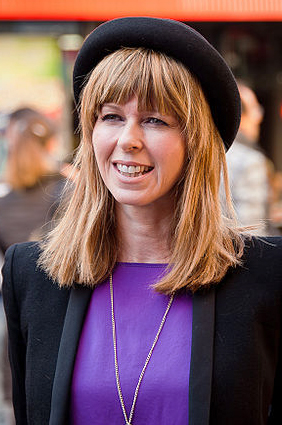
Kathryn Mary Draper Garraway is an English broadcaster and journalist. In the 1990s, Garraway was a journalist for ITV News Central and later a co-presenter of ITV News Meridian. From 2000 to 2010, she co-presented GMTV. Currently, Garraway is the presenter of Mid Mornings with Kate Garraway on Smooth Radio and newsreader and co-anchor of the ITV Breakfast programme Good Morning Britain.
Ana Gasteyer, American actress and singer births
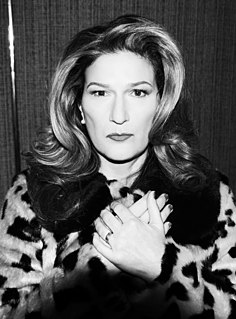
Ana Kristina Gasteyer is an American actress and comedian. She was a cast member on Saturday Night Live from 1996 to 2002. She has since starred in such sitcoms as ABC's Suburgatory, TBS's People of Earth, NBC's American Auto, and the film Mean Girls.
Gary Elkins, English footballer and manager births
Gary Elkins is an English football manager and former professional footballer.
Jane McGrath, English-Australian activist, co-founded the McGrath Foundation (d. 2008) births
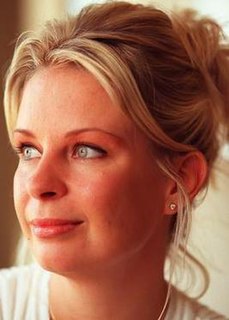
Jane Louise McGrath was an England-born Australian cancer support campaigner, and the wife of former Australian cricket fast bowler Glenn McGrath.

The McGrath Foundation is a breast cancer support and education charity in Australia, which raises money to place McGrath Breast Care Nurses in communities across Australia and increase breast health awareness. The charity was founded by Australian cricket player Glenn McGrath and his English-born wife, Jane McGrath, in 2005, following Jane's initial diagnosis and recovery from breast cancer. Jane died on 22 June 2008 at the age of 42.
Silvia Costa, Cuban high jumper births
Silvia Costa Acosta-Martínez is a former high jumper from Cuba.
Karl Robert Pusta, Estonian politician, 4th Estonian Minister of Foreign Affairs (b. 1883) deaths
Kaarel Robert Pusta was an Estonian politician and a former Minister of Foreign Affairs of Estonia.

The Minister of Foreign Affairs is the senior minister at the Ministry of Foreign Affairs in the Estonian Government. The Minister is one of the most important members of the Estonian government, with responsibility for the relations between Estonia and foreign states.
Jay Aston, English singer-songwriter and dancer births

Jay Hilda Aston is a British singer and occasional songwriter. She was a member of the British pop group Bucks Fizz from 1981 to 1985 and now under The Fizz. She was the youngest member of the group's original line-up, aged 19 when they won the 1981 Eurovision Song Contest. During Aston's membership, the group had 12 of their 13 UK top 40 hit singles, including three number one hits. Since 2009, she has performed alongside fellow original Bucks Fizz members Cheryl Baker and Mike Nolan. The group used to perform under the name the Original Bucks Fizz but are now known as the Fizz.
Werner Faymann, Austrian politician, 28th Chancellor of Austria births

Werner Faymann is an Austrian former politician who was Chancellor of Austria and chairman of the Social Democratic Party of Austria (SPÖ) from 2008 to 2016. On 9 May 2016, he resigned from both positions amid widening criticism within his party.

The chancellor of the Republic of Austria is the head of government of the Republic of Austria. The position corresponds to that of Prime Minister in several other parliamentary democracies.
Valdemaras Chomičius, Lithuanian basketball player and coach births

Valdemaras Chomičius is a Lithuanian former professional basketball player for the Soviet and Lithuanian national basketball team, and an assistant coach for the Lithuanian national team.
Randy Travis, American singer-songwriter, guitarist, and actor births

Randy Bruce Traywick, known professionally as Randy Travis, is an American country music and gospel music singer, songwriter, guitarist, and actor.
Bob Tway, American golfer births
Robert Raymond Tway IV is an American professional golfer who has won numerous tournaments including eight PGA Tour victories. He spent 25 weeks in the top 10 of the Official World Golf Ranking in 1986–87.
Delbert Fowler, American football player births
Delbert "Treetop" Fowler is a former American football player for the Winnipeg Blue Bombers of the Canadian Football League. Fowler was born in Cleveland, Ohio where he played high school football for Glenville High School in Cleveland, Ohio.
Keith Haring, American painter (d. 1990) births
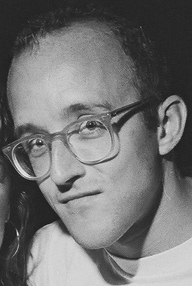
Keith Allen Haring was an American artist whose pop art emerged from the New York City graffiti subculture of the 1980s. His animated imagery has "become a widely recognized visual language". Much of his work includes sexual allusions that turned into social activism by using the images to advocate for safe sex and AIDS awareness. In addition to solo gallery exhibitions, he participated in renowned national and international group shows such as documenta in Kassel, the Whitney Biennial in New York, the São Paulo Biennial, and the Venice Biennale. The Whitney Museum held a retrospective of his art in 1997.
Jane Kennedy, English politician births

Jane Elizabeth Kennedy is a British politician and the inaugural Merseyside Police and Crime Commissioner. She was Member of Parliament (MP) for Liverpool Wavertree, formerly Liverpool Broadgreen, from 1992 to 2010.
Caroline Spelman, English politician, Secretary of State for Environment, Food and Rural Affairs births
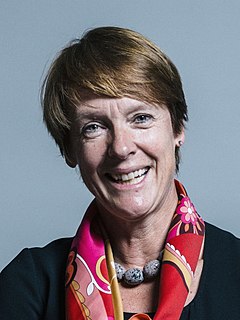
Dame Caroline Alice Spelman is a British Conservative Party politician who served as the Member of Parliament (MP) for Meriden in the West Midlands from 1997 to 2019. From May 2010 to September 2012 she was the Secretary of State for Environment, Food and Rural Affairs in David Cameron's coalition cabinet, and was sworn as a Privy Counsellor on 13 May 2010.

The secretary of state for environment, food and rural affairs, also referred to as the environment secretary, is a secretary of state in the Government of the United Kingdom, with overall responsibility for the Department for Environment, Food and Rural Affairs (Defra). The incumbent is a member of the Cabinet of the United Kingdom, 15th in the ministerial ranking. The position is held by Thérèse Coffey.
Jaak Huimerind, Estonian architect births
Jaak Huimerind is an Estonian architect.
Kathy Kreiner, Canadian skier births

Katharine Kreiner-Phillips is a former World Cup alpine ski racer and Olympic gold medalist from Canada.
Peter Sleep, Australian cricketer births
Peter Raymond Sleep is a former Australian cricketer who played 14 Test matches for Australia between 1979 and 1990.
Marijke Vos, Dutch educator and politician births

Maria Bernadina (Marijke) Vos is a Dutch politician.
Michael L. Gernhardt, American astronaut and engineer births

Michael Landon Gernhardt is a NASA astronaut and manager of the Environmental Physiology Laboratory, and principal investigator of the Prebreathe Reduction Program (PRP) at the Lyndon B. Johnson Space Center.
David Guterson, American novelist, short story writer, poet, and essayist births

David Guterson is an American novelist, short story writer, poet, journalist, and essayist. He is best known as the author of the bestselling Japanese American internment novel Snow Falling on Cedars.
Ken Oberkfell, American baseball player and coach births

Kenneth Ray Oberkfell is an American former third baseman. He played from 1977 to 1992 for six different teams. Oberkfell primarily played third base but he also played over 400 career games at second base. After retiring as a player, Oberkfell served as a baseball coach. He has primarily coached in the minor leagues, but he spent the part of the 2008 as the New York Mets first base coach and spent the 2011 season as the Mets bench coach.
George Enescu, Romanian pianist, composer, and conductor (b. 1881) deaths

George Enescu, known in France as Georges Enesco, was a Romanian composer, violinist, conductor and teacher. Regarded as one of the greatest musicians in Romanian history, Enescu is featured on the Romanian five lei.
Ryan Cayabyab, Filipino pianist, composer, and conductor births

Raymundo Cipriano Pujante Cayabyab, known professionally as Ryan Cayabyab, is a Filipino musician, composer and conductor. He was the Executive and Artistic Director for several years for the defunct San Miguel Foundation for the Performing Arts. He was named as National Artist of the Philippines for Music in 2018.
Trevor Ryan, Australian rugby league player births
Trevor Ryan is an Australian rugby league footballer who played in the 1970s and 1980s. He played for Balmain, Western Suburbs and Newtown in the New South Wales Rugby League (NSWRL) competition. Ryan is the father of Matt Ryan who played for Parramatta between 2012 and 2013.
Pia Zadora, American actress and singer births

Pia Zadora is an American actress and singer. After working as a child actress on Broadway, in regional theater, and in the film Santa Claus Conquers the Martians (1964), she came to national attention in 1981 when, following her starring role in the highly criticized Butterfly, she won a Golden Globe Award as New Star of the Year while simultaneously winning the Golden Raspberry Award for Worst Actress and the Worst New Star for the same performance.
Alexandre Pharamond, French rugby player (b. 1876) deaths

Alexandre Emmanuel Pharamond was the captain of the French rugby union team in the early 20th century.
Belinda Green, Australian beauty queen and 1972 Miss World births
Belinda Lynette Green is an Australian model and beauty queen who won the Miss World 1972 contest at the age of 20. She became the second Australian to win the title; the first, Penelope Plummer, was crowned Miss World in 1968. The pageant was held in London, at the Royal Albert Hall. Green's triumph came in a year that saw Australia win the Miss Universe crown, the Miss Asia Pacific title, and placed first runner-up in the Miss International.

Miss World is the oldest existing international beauty pageant. It was created in the United Kingdom by Eric Morley in 1951. Since his death in 2000, Morley's widow, Julia Morley, has co-chaired the pageant. Along with Miss Universe, Miss International, and Miss Earth, it is one of the Big Four international beauty pageants.
Colin Bass, English bass player, songwriter, and producer births

Colin Bass is an English musician, singer, songwriter and record producer. Since 1979, he has been a member of the British progressive rock band Camel, who, after a ten-year hiatus due to the ill health of bandleader Andrew Latimer, returned to active touring in 2013. From 1984 to 1992, he was also a core figure in the pioneering World Music group 3 Mustaphas 3. He has also made two solo albums under his own name and three albums recorded in Indonesia under the name Sabah Habas Mustapha. The title track of the first, "Denpasar Moon", became a hugely popular song in Indonesia in the mid-1990s and has been covered by over 50 Indonesian, Malaysian, Japanese and Filipino artists. As a record producer he has worked with a diverse range of international artists including: the Klezmatics (USA), SambaSunda (Indonesia), Daniel Kahn & the Painted Bird (USA) Krar Collective (Ethiopia), Etran Finatawa (Niger) and 9Bach (Wales) amongst others. As a guest artist he has appeared on albums by a number of internationally acclaimed artists including top Malian singing star Oumou Sangare, playing on all tracks of her 1993 Ko Sira album.
Colleen Hanabusa, American lawyer and politician births

Colleen Wakako Hanabusa is an American lawyer and politician who served as the U.S. representative for Hawaii's 1st congressional district from 2011 to 2015 and again from 2016 to 2019. A member of the Democratic Party, she ran for her party's nomination for governor of Hawaii in 2018, challenging and losing to incumbent and fellow Democrat David Ige.
Jackie Jackson, American singer-songwriter and dancer births

Sigmund Esco "Jackie" Jackson is an American singer best known as a founding member of the Jackson 5, for which he was inducted into the Rock and Roll Hall of Fame in 1997. Jackson is the second child of the Jackson family, and the oldest Jackson brother.
Darryl Hunt, English bass player births
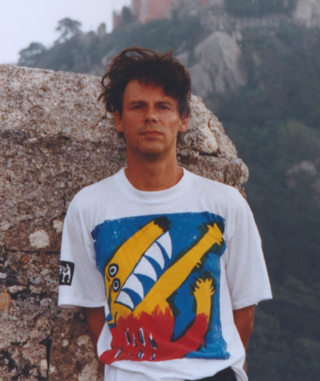
Darryl Gatwick Hunt was an English musician and singer-songwriter, who was best known for playing bass guitar in The Pogues.
Graham Swift, English novelist and short story writer births

Graham Colin Swift FRSL is an English writer. Born in London, England, he was educated at Dulwich College, London, Queens' College, Cambridge, and later the University of York.
Alison Britton, English sculptor and educator births
Alison Claire Britton OBE is a British ceramic artist, with an international reputation, known for her large sculptural, slab-built vessels.
Hurley Haywood, American race car driver births

Hurley Haywood is a retired American race car driver. Haywood has won multiple events, including five overall victories at the Rolex 24 at Daytona, three at the 24 Hours of Le Mans, and two at the 12 Hours of Sebring. He is credited with the 1988 Trans-Am title, two IMSA GT Championship titles and 23 wins, three Norelco Cup championships, a SuperCar title and 18 IndyCar starts.
King George Tupou V of Tonga, (d. 2012) births
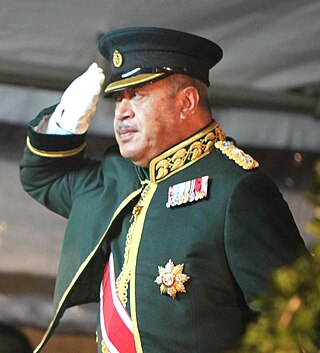
George Tupou V was the King of Tonga from the death of his father Tāufaʻāhau Tupou IV in 2006 until his own death six years later.
John Bosley, Canadian businessman and politician, 31st Canadian Speaker of the House of Commons (d. 2022) births

John William Bosley, was a Canadian politician. He was best known for having been Speaker of the House of Commons of Canada from November 5, 1984 to September 29, 1986.
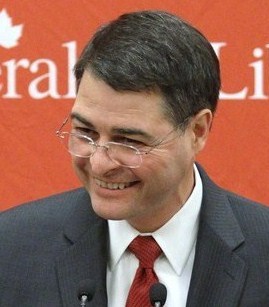
The speaker of the House of Commons is the presiding officer of the lower house of the Parliament of Canada. A member of Parliament (MP), they are elected at the beginning of each new parliament by fellow MPs. The speaker's role in presiding over Canada's House of Commons is similar to that of speakers elsewhere in other countries that use the Westminster system.
Ronald Sørensen, Dutch historian and politician births

Ronald Sørensen is a Dutch politician. He was a founder of the Livable Rotterdam party and also served in the Senate for the Party for Freedom between 2011 and 2015.
Trivimi Velliste, Estonian politician, 17th Estonian Minister of Foreign Affairs births

Trivimi Velliste is an Estonian politician who served as Minister of Foreign Affairs from 1992 to 1994 and as the Estonian Ambassador to the United Nations from 1994 to 1998. He currently is a Member of Parliament in the Riigikogu representing the Pärnumaa Electoral District.

The Minister of Foreign Affairs is the senior minister at the Ministry of Foreign Affairs in the Estonian Government. The Minister is one of the most important members of the Estonian government, with responsibility for the relations between Estonia and foreign states.
John Barnard, English car designer births

John Edward Barnard is an English engineer and racing car designer. Barnard is credited with the introduction of two new designs into Formula One: the carbon fibre composite chassis first seen in 1981 with McLaren, and the semi-automatic gearbox which he introduced with Ferrari in 1989.
Gary Bauer, American political activist births

Gary Lee Bauer is an American civil servant, activist, and former political candidate. He served in President Ronald Reagan's administration as Under Secretary of Education and Chief Domestic Policy Advisor, and later became president of the Family Research Council and a senior vice president of Focus on the Family, both conservative Christian organizations. Bauer was a candidate in the 2000 Republican Party presidential primaries and participated in five national debates. He is known for his advocacy of religious liberty, support for Israel, and his dedication to electing conservative candidates to Congress.
John Watson, British race car driver births
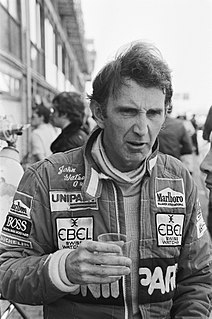
John Marshall Watson, is a British former racing driver and current commentator from Northern Ireland. He competed in Formula One, winning five Grands Prix and was third in the 1982 championship. He also competed in the World Sportscar Championship finishing second in the 1987 championship. After his retirement from motorsport, he became a commentator for Eurosport's coverage of Formula One from 1989 to 1996. He currently commentates on the GT World Challenge Europe and commentated on the 2022 Miami F1 Grand Prix for F1TV.
Jan Mulder, Dutch footballer and journalist births

Johan "Jan" Mulder is a Dutch former footballer, writer, columnist, and TV personality.
Fedor von Bock, German field marshal (b. 1880) deaths

Moritz Albrecht Franz Friedrich Fedor von Bock was a German Generalfeldmarschall who served in the German Army during the Second World War. Bock served as the commander of Army Group North during the Invasion of Poland in 1939, commander of Army Group B during the Invasion of France in 1940, and later as the commander of Army Group Center during the attack on the Soviet Union in 1941; his final command was that of Army Group South in 1942.
Walker Boone, Canadian actor (d. 2021) births
Theodore "Ted" Nicoloff, better known as Walker Boone, was a Canadian actor. He was best known as the voice of the Nintendo character Mario in the DIC-produced animated series The Adventures of Super Mario Bros. 3 and Super Mario World as well as his role as Commander Lynch in Star Trek: The Next Generation.
Steve Liebmann, Australian radio and television host births
Steve Liebmann is an Australian retired television anchor, journalist and radio broadcaster.
Russi Taylor, American voice actress (d. 2019) births
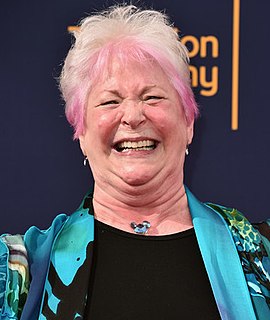
Russi Taylor was an American voice actress. She is best remembered as the official voice of Minnie Mouse from 1986 to 2019, and was notably married to voice actor Wayne Allwine, the voice of Mickey Mouse, until his death on May 18, 2009. She is the longest tenured actress to voice the character, having held the role for 33 years. She also provided the voices of several characters in The Simpsons.
Georgi Asparuhov, Bulgarian footballer (d. 1971) births
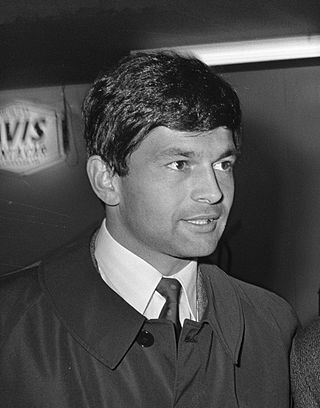
Georgi Asparuhov Rangelov, nicknamed Gundi, was a Bulgarian footballer who played as a striker.
Mihail Chemiakin, Russian painter and sculptor births

Mihail Mikhailovich Chemiakin is a Russian painter, stage designer, sculptor and publisher, and a controversial representative of the nonconformist art tradition of St. Petersburg.
Prasanta Pattanaik, Indian economist and academic births
Prasanta Kumar Pattanaik, is emeritus professor at the Department of Economics at the University of California. He is a Fellow of the Econometric Society.
George Will, American journalist and author births

George Frederick Will is an American libertarian-conservative political commentator and author. He writes regular columns for The Washington Post and provides commentary for NBC News and MSNBC. In 1986, The Wall Street Journal called him "perhaps the most powerful journalist in America", in a league with Walter Lippmann (1889–1974). He won the Pulitzer Prize for Commentary in 1977.
Chris McKivat, Australian rugby player and coach (b. 1880) deaths

Christopher Hobart McKivat was an Australian rugby union and rugby league player – a dual-code rugby international. He represented the Wallabies in over 20 Tests and tour matches from 1907 to 1909 and the Kangaroos in 5 Tests from 1910 to 1912. He is unique in Australian rugby history as the only man to captain both the national rugby union and rugby league teams. Following his playing career he became the most successful coach of North Sydney in the club's history.
Robin Cook, American physician and author births

Robert Brian "Robin" Cook is an American physician and novelist who writes about medicine and topics affecting public health.
Peter Gregg, American race car driver and businessman (d. 1980) births
Peter Holden Gregg was an American race car driver during the golden age of the Trans-Am Series and a four-time winner of the 24 Hours of Daytona. He was also the owner of Brumos, a Jacksonville, Florida car dealership and racing team.
Neil Fox, English rugby league player and coach births
Neil Fox MBE is an English former professional rugby league footballer and player-coach who played in the 1950s, 1960s and 1970s, and coached in the 1970s and 1980s.
Amos Oz, Israeli journalist and author (d. 2018) births

Amos Oz was an Israeli writer, novelist, journalist, and intellectual. He was also a professor of Hebrew literature at Ben-Gurion University of the Negev. From 1967 onwards, Oz was a prominent advocate of a two-state solution to the Israeli–Palestinian conflict.
Leon Rochefort, Canadian ice hockey player births

Joseph Fernand Léon Rochefort is a Canadian former professional ice hockey centreman who spent 15 seasons in the National Hockey League playing for seven clubs in a career that lasted from 1959 to 1976. A hard-working journeyman, he won the Stanley Cup with the Montreal Canadiens in 1966 and 1971.
Tyrone Davis, American blues and soul singer (d. 2005) births

Tyrone Davis was an American blues and soul singer with a long list of hit records over more than 20 years. Davis had three number 1 hits on the Billboard R&B chart: "Can I Change My Mind" (1968), "Turn Back the Hands of Time" (1970), and "Turning Point" (1975).
Carlos Monsiváis, Mexican journalist, author, and critic (d. 2010) births
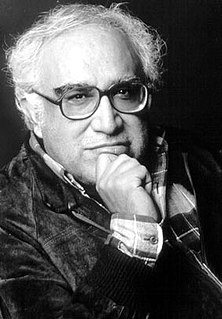
Carlos Monsiváis Aceves was a Mexican philosopher, writer, critic, political activist, and journalist. He also wrote political opinion columns in leading newspapers within the country's progressive sectors. His generation of writers includes Elena Poniatowska, José Emilio Pacheco, and Carlos Fuentes. Monsiváis won more than 33 awards, including the 1986 Jorge Cuesta Prize, the 1989 Mazatlán Prize, and the 1996 Xavier Villaurrutia Award. Considered a leading intellectual of his time, Monsiváis documented contemporary Mexican themes, values, class struggles, and societal change in his essays, books and opinion pieces. He was a staunch critic of the long-ruling Partido Revolucionario Institucional (PRI), leaned towards the left-wing, and was ubiquitous in disseminating his views on radio and television. As a founding member of "Gatos Olvidados", Monsiváis wanted his and other "forgotten cats" to be provided for beyond his lifetime.
Gillian Tindall, English historian and author births
Gillian Tindall is a British writer and historian. Among her books are City of Gold: The Biography of Bombay (1992) and Celestine: Voices from a French Village (1997). Her novel Fly Away Home won the Somerset Maugham Award in 1972. From the 1960s to the early 1990s, Tindall worked as a journalist, writing stories for The Guardian, the Evening Standard, The Times, and The Independent – and for many years she was a regular guest on the BBC Radio 3 arts discussion programme, Critics' Forum. Since 1963 she has lived in Kentish Town, North London.
Kanō Jigorō, Japanese founder of judo (b. 1860) deaths

Jigoro Kano was a Japanese educator, athlete, and the founder of Judo. Along with Ju-Jitsu, Judo was one of the first Japanese martial arts to gain widespread international recognition, and the first to become an official Olympic sport. Pedagogical innovations attributed to Kanō include the use of black and white belts, and the introduction of dan ranking to show the relative ranking among members of a martial art style. Well-known mottoes attributed to Kanō include "maximum efficiency with minimum effort" and "mutual welfare and benefit".

Judo is an unarmed modern Japanese martial art, Olympic sport, and the most prominent form of jacket wrestling competed internationally. Judo was created in 1882 by Kanō Jigorō as an eclectic martial art, distinguishing itself from its predecessors due to an emphasis on "randori" instead of "kata" alongside its removal of striking and weapon training elements. Judo rose to prominence for its dominance over established jujutsu schools in tournaments hosted by the Tokyo Metropolitan Police Department, resulting in its adoption as the department's primary martial art. A judo practitioner is called a "judoka" , and the judo uniform is called "judogi" .
Carl von Ossietzky, German journalist and activist, Nobel Prize laureate (b. 1889) deaths

Carl von Ossietzky was a German journalist and pacifist. He was the recipient of the 1935 Nobel Peace Prize for his work in exposing the clandestine German re-armament.
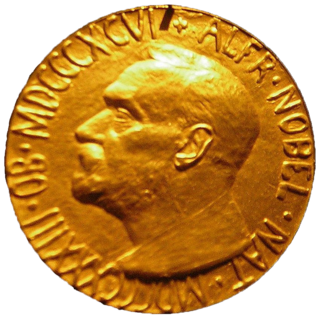
The Nobel Peace Prize is one of the five Nobel Prizes established by the will of Swedish industrialist, inventor and armaments manufacturer Alfred Nobel, along with the prizes in Chemistry, Physics, Physiology or Medicine and Literature. Since March 1901, it has been awarded annually to those who have "done the most or the best work for fraternity between nations, for the abolition or reduction of standing armies and for the holding and promotion of peace congresses".
Ron Carter, American bassist and educator births
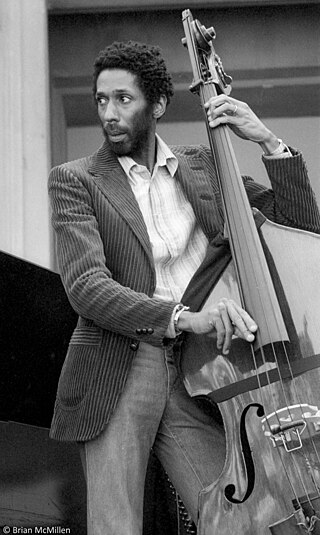
Ronald Levin Carter is an American jazz double bassist. His appearances on 2,221 recording sessions make him the most-recorded jazz bassist in history. He has won three Grammy awards, and is also a cellist who has recorded numerous times on that instrument.
Dick Dale, American surf-rock guitarist, singer, and songwriter (d. 2019) births

Richard Anthony Monsour, known professionally as Dick Dale, was an American rock guitarist. He was a pioneer of surf music, drawing on Middle Eastern music scales and experimenting with reverb. Dale was known as "The King of the Surf Guitar", which was also the title of his second studio album.
Wim Verstappen, Dutch director, producer, and screenwriter (d. 2004) births

Wim Verstappen was a Dutch film director and producer, television director, and screen writer.
El Cordobés, Spanish bullfighter births

Manuel Benítez Pérez, more commonly known as El Cordobés, is a Spanish bullfighter, matador, and actor active in the 1960s who brought an unorthodox acrobatic and theatrical style to the bullring.
Med Hondo, Mauritanian filmmaker and actor (d. 2019) births

Med Hondo was a Mauritanian-born French director, producer, screenwriter, and actor. Considered a founding father of African cinema, he is known for his controversial films dealing with issues such as race relations and colonization. His critically acclaimed 1970 directorial début feature, Soleil O, received the Golden Leopard award at the 1970 Locarno International Film Festival and was chosen in 2019 by the African Film Heritage Project for restoration. His 1979 film West Indies was the first African film musical and, at $1.3 million, the most expensive production in African film history.
J. Fred Duckett, American journalist and educator (d. 2007) births
J. Fred Duckett was an American sports journalist and writer.
Harlon Hill, American football player and coach (d. 2013) births

Harlon Junius Hill was an American professional football player who was an end for nine seasons in the National Football League (NFL). Hill played for the Chicago Bears, Pittsburgh Steelers, and Detroit Lions. He was the NFL Rookie of the Year in 1954 and winner of the Jim Thorpe Trophy as the NFL Player of the Year in 1955. The Harlon Hill Trophy, named in his honor, is awarded annually to the nation's best NCAA Division II football player. After his playing career, he became a coach and educator.
Alexander MacAra, Scottish epidemiologist and academic (d. 2012) births
Alexander Wiseman MacAra, also known as Sandy MacAra, was a Scottish professor of epidemiology at Bristol University and chairman of British Medical Association (BMA) from 1993 to 1998.
Jan Pesman, Dutch speed skater (d. 2014) births

Jan Sijbrand Pesman was a Dutch speed skater who specialized in long distances. He competed at the 1960 Winter Olympics in the 500 m, 5000 m and 10,000 m events and won a bronze medal in the 5000 m.
Gennady Rozhdestvensky, Russian conductor and educator (d. 2018) births

Gennady Nikolayevich Rozhdestvensky, CBE was a Soviet and Russian conductor.
Thomas Stuttaford, English physician, journalist, and politician (d. 2018) births
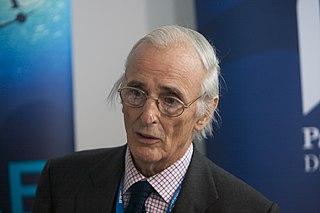
Irving Thomas Stuttaford, was a British medical doctor, columnist, and politician who served as the Conservative Member of Parliament for Norwich South between 1970 and 1974. In 2002 he retired as Senior Medical Advisor for Barclays Bank.
Katherine Jackson, matriarch of the Jackson family births
Katherine Esther Jackson is the matriarch of the Jackson family of entertainers that includes her children Michael and Janet Jackson.
Roberta Peters, American soprano (d. 2017) births
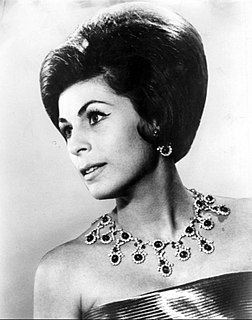
Roberta Peters was an American coloratura soprano.
Manuel Contreras, Chilean general (d. 2015) births
Juan Manuel "Mamo" Guillermo Contreras Sepúlveda was a Chilean Army officer and the former head of the National Intelligence Directorate (DINA), Chile's secret police during the dictatorship of General Augusto Pinochet. In 1995, he was sentenced to seven years in prison for the murder in Washington, DC, of the Chilean diplomat Dr. Orlando Letelier, which he served until 2001.
Audrey Hepburn, Belgian-British actress and humanitarian (d. 1993) births
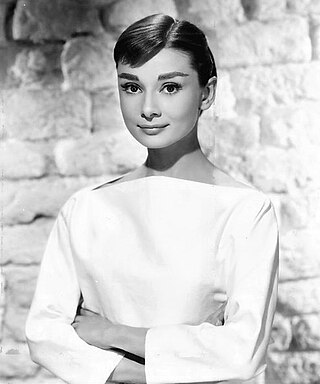
Audrey Hepburn was a British actress and humanitarian. Recognised as both a film and fashion icon, she was ranked by the American Film Institute as the third-greatest female screen legend from the Classical Hollywood cinema and was inducted into the International Best Dressed List Hall of Fame.
Paige Rense, American magazine editor (d. 2021) births

Paige Rense, also known as Paige Rense Noland was an American writer and editor who served as editor-in-chief of Architectural Digest magazine from 1975 until 2010. She founded the Arthur Rense Prize poetry award. Rense also transformed the cooking magazine Bon Appétit into its modern format, was editor-in-chief of GEO, and wrote a mystery novel, Manor House.
Maynard Ferguson, Canadian trumpet player and bandleader (d. 2006) births

Walter Maynard Ferguson CM was a Canadian jazz trumpeter and bandleader. He came to prominence in Stan Kenton's orchestra before forming his own big band in 1957. He was noted for his bands, which often served as stepping stones for up-and-coming talent, his versatility on several instruments, and his ability to play in a high register.
Thomas Kinsella, Irish poet, translator, and publisher (d. 2021) births

Thomas Kinsella was an Irish poet, translator, editor, and publisher. Born outside Dublin, Kinsella attended University College Dublin before entering the civil service. He began publishing poetry in the early 1950s and, around the same time, translated early Irish poetry into English. In the 1960s, he moved to the United States to teach English at universities including Temple University. Kinsella continued to publish steadily until the 2010s.
Hosni Mubarak, Egyptian air marshal and politician, 4th President of Egypt (d. 2020) births
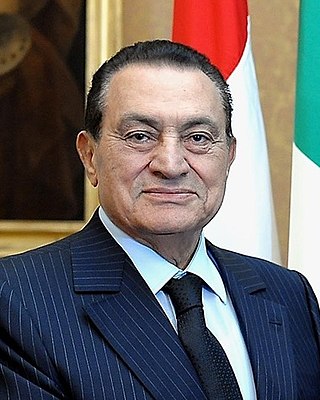
Muhammad Hosni El Sayed Mubarak was an Egyptian politician and military officer who served as the fourth president of Egypt from 1981 to 2011.
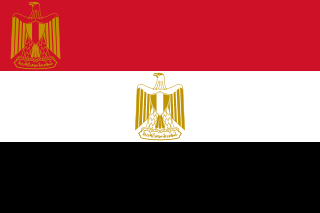
The president of Egypt is the executive head of state of Egypt and the de facto appointer of the official head of government under the Egyptian Constitution of 2014. Under the various iterations of the Constitution of Egypt following the Egyptian Revolution of 1952, the president is also the supreme commander of the Armed Forces, and head of the executive branch of the Egyptian government. The current president is Abdel Fattah el-Sisi, who has been in office since 8 June 2014.
Betsy Rawls, American golfer births
Elizabeth Earle "Betsy" Rawls is an American former LPGA Tour professional golfer. She won eight major championship and 55 LPGA Tour career events. She is a member of the World Golf Hall of Fame.
Wolfgang von Trips, German race car driver (d. 1961) births

Wolfgang Alexander Albert Eduard Maximilian Reichsgraf Berghe von Trips, also known simply as Wolfgang Graf Berghe von Trips and nicknamed 'Taffy' by friends and fellow racers, was a German racing driver. He was the son of a noble Rhineland family.
David Stoddart, Baron Stoddart of Swindon, English politician (d. 2020) births

David Leonard Stoddart, Baron Stoddart of Swindon was a British politician who served as Member of Parliament (MP) for Swindon from 1970 to 1983, and as a life peer in the House of Lords from 1983 to his death in 2020. He served as a Labour peer from 1983 to 2002, when he was expelled from the Labour benches, after which he sat as an Independent Labour peer until his death.
Jenő Buzánszky, Hungarian footballer and coach (d. 2015) births

Jenő Buzánszky was a Hungarian football player and coach. He played as a right back for Hungary and during the 1950s he was a member of the legendary squad known as the Golden Team. Other members of the team included Ferenc Puskás, Zoltán Czibor, Sándor Kocsis, József Bozsik and Nándor Hidegkuti. He was the only member of the team not to play for either Honvéd or MTK Hungária FC. After 274 league games he retired as a player and became a coach. In 1996, he became a deputy chairman of the Hungarian Football Federation.
Maurice R. Greenberg, American businessman and philanthropist births

Maurice Raymond Greenberg is an American business executive and former chairman and chief executive officer of American International Group (AIG).
E. Nesbit, English author and poet (b. 1858) deaths

Edith Nesbit was an English writer and poet, who published her books for children as E. Nesbit. She wrote or collaborated on more than 60 such books. She was also a political activist and co-founder of the Fabian Society, a socialist organisation later affiliated to the Labour Party.
Stanley Biber, American soldier and physician (d. 2006) births

Stanley H. Biber was an American physician who was a pioneer in sex reassignment surgery, performing thousands of procedures during his long career.
Ed Cassidy, American jazz and rock drummer (d. 2012) births
Edward Claude Cassidy was an American jazz and rock drummer who was one of the founders of the rock group Spirit in 1967.
Assi Rahbani, Lebanese composer and producer (d. 1986) births
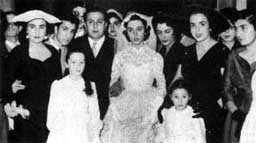
Assi Rahbani was a Lebanese composer, musician, and producer. He was part of the Rahbani Brothers, with his brother Mansour Rahbani. He married Lebanese singer Nouhad Haddad, more famous by her stage name, Fairuz. Their son Ziad Rahbani is also a very successful artist in music, theatre, and an influential political activist.
Eric Sykes, British actor and comedian (d. 2012) births
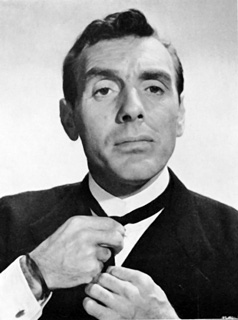
Eric Sykes was an English radio, stage, television and film writer, comedian, actor, and director whose performing career spanned more than 50 years. He frequently wrote for and performed with many other leading comedy performers and writers of the period, including Tony Hancock, Spike Milligan, Tommy Cooper, Peter Sellers, John Antrobus, and Johnny Speight. Sykes first came to prominence through his many radio credits as a writer and actor in the 1950s, most notably through his collaboration on The Goon Show scripts. He became a TV star in his own right in the early 1960s when he appeared with Hattie Jacques in several popular BBC comedy television series.
John Toner, American football player and coach (d. 2014) births
John L. Toner was an American football player, coach, and college athletics administrator. He served as the head football coach at the University of Connecticut (UConn) from 1966 to 1970 and as the school's athletic director from 1969 to 1987. During his 18-year tenure as athletic director Toner also served in several roles with the National Collegiate Athletic Association (NCAA), including as its president from 1983 to 1985. Toner was responsible for several momentous decisions in his time as athletic director at UConn, including UConn becoming a founding member of the Big East Conference in 1979, as well as the hiring of future Hall of Fame coaches Geno Auriemma and Jim Calhoun. He also oversaw the funding and construction of Gampel Pavilion.
Ralph McKittrick, American golfer and tennis player (b. 1877) deaths
Ralph McKittrick was an American golfer and tennis player who competed in the 1904 Summer Olympics.
Paul-Émile Charbonneau, Canadian archbishop (d. 2014) births
Paul-Émile Charbonneau was a Canadian Prelate of Catholic Church.
Eugenie Clark, American biologist and academic (d. 2015) births
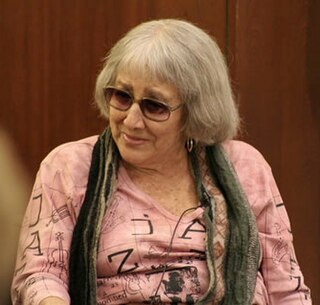
Eugenie Clark, popularly known as The Shark Lady, was an American ichthyologist known for both her research on shark behavior and her study of fish in the order Tetraodontiformes. Clark was a pioneer in the field of scuba diving for research purposes. In addition to being regarded as an authority in marine biology, Clark was popularly recognized and used her fame to promote marine conservation.
Viktor Kingissepp, Estonian politician (b. 1888) deaths

Viktor Eduard Kingissepp was an Estonian communist politician, the leader of the Estonian Communist Party.
Patsy Garrett, American actress and singer (d. 2015) births
Virginia "Patsy" Garrett was an American actress and singer. Beginning her career as a radio performer at the age of seven, Garrett is best known for her seven years on Fred Waring's Pleasure Time radio show during the 1940s, as well as for her recurring television and film roles; as nosy neighbor Mrs. Florence Fowler on Nanny and the Professor (1970–1971), school secretary Miss Hogarth on Room 222 (1972–1973), as Mary Gruber in the Benji series of motion pictures beginning in 1974, and as a commercial spokesperson for Purina Cat Chow cat food.
John van Kesteren, Dutch-American tenor and actor (d. 2008) births
John van Kesteren was a Dutch operatic tenor.
Edo Murtić, Croatian painter, sculptor, and illustrator (d. 2005) births

Edo Murtić was a painter from Croatia, best known for his lyrical abstraction and abstract expressionism style. He worked in a variety of media, including oil painting, gouache, graphic design, ceramics, mosaics, murals and theatrical set design. Murtić travelled and exhibited extensively in Europe and North America, gaining international recognition for his work, which can be found in museums, galleries and private collections worldwide. He was one of the founders of the group "March" (Mart) in 1956, and received many international awards. In 1958 Murtić participated in the three biggest events in the world of contemporary art: the Venice Biennale, the Carnegie Prize in Pittsburgh, and Documenta in Kassel. Interest in the art of Edo Murtić continues to grow, with retrospective exhibits in major museums.
Dory Funk, American wrestler and trainer (d. 1973) births

Dorrance Wilhelm Funk was an American professional wrestler. He is the father of wrestlers Dory Funk Jr. and Terry Funk, and was a promoter of the Amarillo, Texas-based Western States Sports promotion.
Basil Yamey, South African-English economist and academic (d. 2020) births

Basil Selig Yamey CBE was a South African economist and expert in the history of accounting.
Milan Rastislav Štefánik, Slovak general and politician (b. 1880) deaths

Milan Rastislav Štefánik was a Slovak politician, diplomat, aviator and astronomer. During World War I, he served at the same time as a general in the French Army and as Minister of War for Czechoslovakia. As one of the leading members of the Czechoslovak National Council, he contributed decisively to the cause of Czechoslovak sovereignty, since the status of Czech- and Slovak-populated territories was one of those in question until shortly before the disintegration of the Austro-Hungarian Empire, in 1918.
Tom Mead, Australian journalist and politician (d. 2004) births
Thomas Francis Mead was an Australian politician, elected as a member of the New South Wales Legislative Assembly representing the seat of Hurstville for the Liberal Party. He was also a political journalist.
Kakuei Tanaka, Japanese soldier and politician, 64th Prime Minister of Japan (d. 1993) births

Kakuei Tanaka was a Japanese politician who served in the House of Representatives from 1947 to 1990, and was Prime Minister of Japan from 1972 to 1974.

The prime minister of Japan is the head of government of Japan. The prime minister chairs the Cabinet of Japan and has the ability to select and dismiss its Ministers of State. The prime minister also serves as the civilian commander-in-chief of the Japan Self Defence Forces and as a sitting member of the House of Representatives. The individual is appointed by the emperor of Japan after being nominated by the National Diet and must retain the nomination of the lower house and answer to parliament to remain in office.
Edward T. Cone, American pianist and composer (d. 2004) births
Edward Toner Cone was an American composer, music theorist, pianist, and philanthropist.
Nick Joaquin, Filipino writer, journalist and historian (d. 2004) births
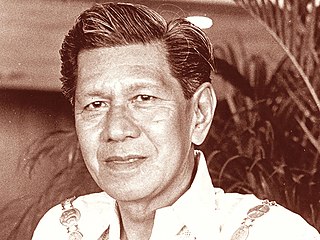
Nicomedes "Nick" Marquez Joaquin was a Filipino writer and journalist best known for his short stories and novels in the English language. He also wrote using the pen name Quijano de Manila. Joaquin was conferred the rank and title of National Artist of the Philippines for Literature. He has been considered one of the most important Filipino writers, along with José Rizal and Claro M. Recto. Unlike Rizal and Recto, whose works were written in Spanish, Joaquin's major works were written in English despite being a native Spanish speaker.
Jane Jacobs, American-Canadian journalist, author, and activist (d. 2006) births
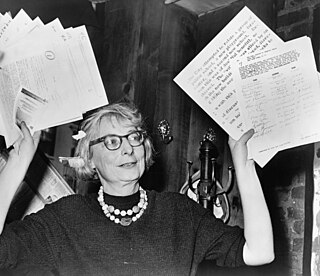
Jane Jacobs was an American-Canadian journalist, author, theorist, and activist who influenced urban studies, sociology, and economics. Her book The Death and Life of Great American Cities (1961) argued that "urban renewal" and "slum clearance" did not respect the needs of city-dwellers.
Richard Proenneke, American soldier, carpenter, and meteorologist (d. 2003) births
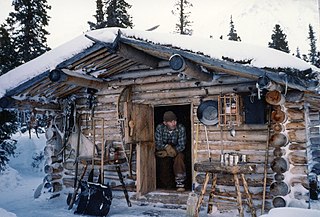
Richard Louis Proenneke was an American self-educated naturalist, conservationist, writer, and wildlife photographer who, from the age of about 51, lived alone for nearly thirty years (1969–1999) in the mountains of Alaska in a log cabin that he constructed by hand near the shore of Twin Lakes. Proenneke hunted, fished, raised and gathered much of his own food, and also had supplies flown in occasionally. He documented his activities in journals and on film, and also recorded valuable meteorological and natural data. The journals and film were later used by others to write books and produce documentaries about his time in the wilderness.
Ned Daly, Irish rebel commander (Easter Rising) (b. 1891) deaths
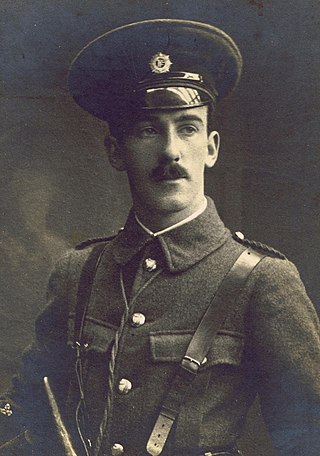
Edward Daly was commandant of Dublin's 1st battalion during the Easter Rising of 1916. He was the youngest man to hold that rank, and the youngest executed in the aftermath.

The Easter Rising, also known as the Easter Rebellion, was an armed insurrection in Ireland during Easter Week in April 1916. The Rising was launched by Irish republicans against British rule in Ireland with the aim of establishing an independent Irish Republic while the United Kingdom was fighting the First World War. It was the most significant uprising in Ireland since the rebellion of 1798 and the first armed conflict of the Irish revolutionary period. Sixteen of the Rising's leaders were executed from May 1916. The nature of the executions, and subsequent political developments, ultimately contributed to an increase in popular support for Irish independence.
John Murray, Australian politician, 23rd Premier of Victoria (b. 1851) deaths

John (Jack) Murray, Australian politician, was the 23rd Premier of Victoria.

The premier of Victoria is the head of government in the Australian state of Victoria. The premier is appointed by the governor of Victoria, and is the leader of the political party able to secure a majority in the Victorian Legislative Assembly.
Willie Pearse, Irish rebel (b. 1881) deaths
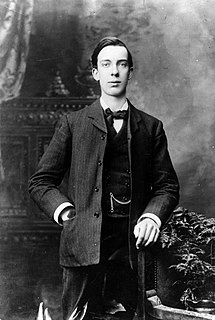
William James Pearse was an Irish republican executed for his part in the Easter Rising. He was a younger brother of Patrick Pearse, a leader of the rising.
Joseph Plunkett, Irish rebel and writer (b. 1887) deaths

Joseph Mary Plunkett was an Irish nationalist, republican, poet, journalist, revolutionary and a leader of the 1916 Easter Rising. Joseph Mary Plunkett married Grace Gifford in 1916, seven hours before his execution.
Maedayama Eigorō, Japanese sumo wrestler, the 39th Yokozuna (d. 1971) births

Maedayama Eigorō was a Japanese professional sumo wrestler from Ehime Prefecture. He was the sport's 39th yokozuna.
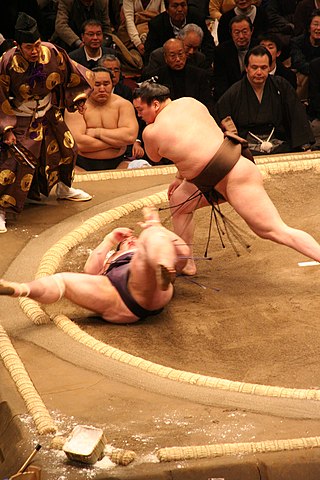
Makuuchi (幕内), or makunouchi (幕の内), is the top division of the six divisions of professional sumo. Its size is fixed at 42 wrestlers (rikishi), ordered into five ranks according to their ability as defined by their performance in previous tournaments.
John Broome, American author (d. 1999) births
John Broome, who additionally used the pseudonyms John Osgood and Edgar Ray Meritt, was an American comic book writer for DC Comics. Along with Gil Kane, he co-created the supervillain Sinestro.
Princess Katherine of Greece and Denmark (d. 2007) births

Princess Katherine of Greece and Denmark, styled in the United Kingdom as Lady Katherine Brandram from 1947 until 2007, was the third daughter and youngest child of King Constantine I of Greece and Sophia of Prussia.
Nettie Stevens, American geneticist credited with discovering sex chromosomes (b. 1861) deaths

Nettie Maria Stevens was an American geneticist who discovered sex chromosomes. In 1905, soon after the rediscovery of Mendel's paper on genetics in 1900, she observed that male mealworms produced two kinds of sperm, one with a large chromosome and one with a small chromosome. When the sperm with the large chromosome fertilized eggs, they produced female offspring, and when the sperm with the small chromosome fertilized eggs, they produced male offspring. The pair of sex chromosomes that she studied later became known as the X and Y chromosomes.

A sex chromosome is a chromosome that differs from an ordinary autosome in form, size, and behavior. The human sex chromosomes, a typical pair of mammal allosomes, determine the sex of an individual created in sexual reproduction. Autosomes differ from allosomes because autosomes appear in pairs whose members have the same form but differ from other pairs in a diploid cell, whereas members of an allosome pair may differ from one another and thereby determine sex.
Evald Seepere, Estonian boxer (d. 1990) births

Evald Seepere was an Estonian amateur featherweight boxer. He competed in the 1934 European Championships and 1936 Summer Olympics, but was eliminated in a second-round bout. Seepere studied in Moscow in 1942–43, and later for 43 years worked as a boxing coach in Estonia.
Wolrad Eberle, German decathlete (d. 1949) births
Wolrad Eberle was a German decathlete.
Lincoln Kirstein, American soldier and playwright, co-founded the New York City Ballet (d. 1996) births

Lincoln Edward Kirstein was an American writer, impresario, art connoisseur, philanthropist, and cultural figure in New York City, noted especially as co-founder of the New York City Ballet. He developed and sustained the company with his organizing ability and fundraising for more than four decades, serving as the company's general director from 1946 to 1989. According to the New York Times, he was "an expert in many fields", organizing art exhibits and lecture tours in the same years.

New York City Ballet (NYCB) is a ballet company founded in 1948 by choreographer George Balanchine and Lincoln Kirstein. Balanchine and Jerome Robbins are considered the founding choreographers of the company. Léon Barzin was the company's first music director. City Ballet grew out of earlier troupes: the Producing Company of the School of American Ballet, 1934; the American Ballet, 1935, and Ballet Caravan, 1936, which merged into American Ballet Caravan, 1941; and directly from the Ballet Society, 1946.
Walter Walsh, American target shooter and FBI agent (d. 2014) births
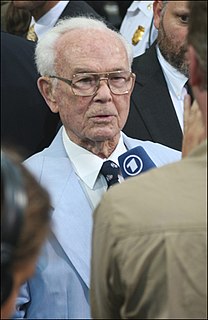
Walter Rudolph Walsh was an FBI agent, USMC shooting instructor and Olympic shooter. Walsh joined the FBI in 1934, serving during the Public enemy era, and was involved in several high-profile FBI cases, including the capture of Arthur Barker and the killing of Al Brady. He served in the Pacific theatre during World War II with the Marine Corps and, after a brief return to the FBI, served as a shooting instructor with the Marine Corps until his retirement in the 1970s.

The Federal Bureau of Investigation (FBI) is the domestic intelligence and security service of the United States and its principal federal law enforcement agency. Operating under the jurisdiction of the United States Department of Justice, the FBI is also a member of the U.S. Intelligence Community and reports to both the Attorney General and the Director of National Intelligence. A leading U.S. counterterrorism, counterintelligence, and criminal investigative organization, the FBI has jurisdiction over violations of more than 200 categories of federal crimes.
Gustav Bergmann, Austrian-American philosopher from the Vienna Circle (d. 1987) births
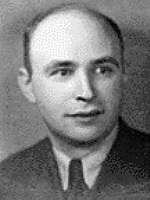
Gustav Bergmann was an Austrian-born American philosopher. He studied at the University of Vienna and was a member of the Vienna Circle. Bergmann was influenced by the philosophers Moritz Schlick, Friedrich Waismann, and Rudolf Carnap who were members of the Circle. In the United States, he was a professor of philosophy and psychology at the University of Iowa.
Al Dexter, American country singer-songwriter and guitarist (d. 1984) births

Clarence Albert Poindexter, known as Al Dexter, was an American country musician and songwriter. He is best known for "Pistol Packin' Mama," a 1943 hit that was one of the most popular recordings of the World War II years and later became a hit again with a cover by Bing Crosby and The Andrews Sisters.
Luther Adler, American actor (d. 1984) births

Luther Adler was an American actor best known for his work in theatre, but who also worked in film and television. He also directed plays on Broadway.
Paul Demel, Czech actor (d. 1951) births

Paul Demel was an actor born in Brno, then in the Austro-Hungarian Empire. He is most notable for his cameo appearances in films, particularly the British Ealing comedies Hue and Cry (1947), Passport to Pimlico (1949), The Lavender Hill Mob (1951) and His Excellency (1952). His other film appearances include English Without Tears (1944) for Two Cities Films. His stage work included West End roles in The Doctor's Dilemma at the Haymarket with Vivien Leigh in 1942, and Madame Louise at the Garrick in 1945. He died in Munich.
Gotse Delchev, Macedonian Bulgarian revolutionary IMRO (b. 1872) deaths

Georgi Nikolov Delchev, known as Gotse Delchev or Goce Delčev, was an important Macedonian Bulgarian revolutionary (komitadji), active in the Ottoman-ruled Macedonia and Adrianople regions at the turn of the 20th century. He was the most prominent leader of what is known today as the Internal Macedonian Revolutionary Organization (IMRO), a secret revolutionary society that was active in Ottoman territories in the Balkans at the end of the 19th and the beginning of the 20th century. Delchev was its representative in Sofia, the capital of the Principality of Bulgaria. As such, he was also elected a member of the Supreme Macedonian-Adrianople Committee (SMAC), participating in the work of its governing body. He was killed in a battle with an Ottoman unit on the eve of the Ilinden-Preobrazhenie uprising.
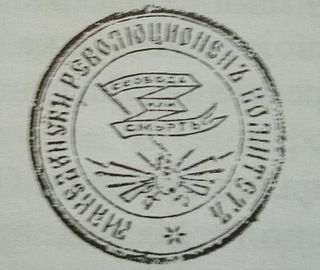
The Internal Macedonian Revolutionary Organization, was a secret revolutionary society founded in the Ottoman territories in Europe, that operated in the late 19th and early 20th centuries.
Ronnie Aird, English cricketer and administrator (d. 1986) births
Ronald Aird was an English first-class cricketer and administrator.
Cola Debrot, Dutch physician, lawyer, and politician (d. 1981) births

Nicolaas (Cola) Debrot was a writer, lawyer, medical doctor and politician.
William Brown Meloney, writer and theatrical producer (d. 1971) births

William Brown Meloney V was a journalist, novelist, short-story writer and theatrical producer.
John Jones Ross, Canadian lawyer and politician, 7th Premier of Quebec (b. 1831) deaths

John Jones Ross was a Canadian politician. Ross served as the seventh premier of Quebec and later as a member of the Senate of Canada.

The premier of Quebec is the head of government of the Canadian province of Quebec. The current premier of Quebec is François Legault of the Coalition Avenir Québec, sworn in on October 18, 2018, following that year's election.
Franklin Carmichael, Canadian painter (d. 1945) births
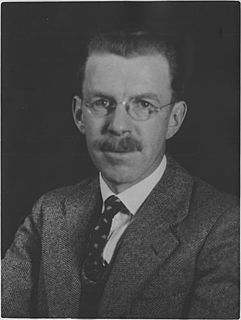
Franklin Carmichael was a Canadian artist and member of the Group of Seven. Though he was primarily famous for his use of watercolours, he also used oil paints, charcoal and other media to capture the Ontario landscapes. Besides his work as a painter, he worked as a designer and illustrator, creating promotional brochures, advertisements in newspapers and magazines, and designing books. Near the end of his life, Carmichael taught in the Graphic Design and Commercial Art Department at the Ontario College of Art.
Francis Spellman, American cardinal (d. 1967) births

Francis Joseph Spellman was an American bishop and cardinal of the Catholic Church. From 1939 until his death in 1967, he served as the sixth Archbishop of New York; he had previously served as an auxiliary bishop of the Archdiocese of Boston from 1932 through 1939. He was created a cardinal in 1946.
Andrew Dasburg, French-American painter (d. 1979) births
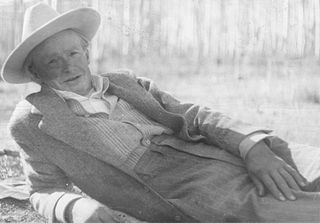
Andrew Michael Dasburg was an American modernist painter and "one of America's leading early exponents of cubism".
Richard Baggallay, English army officer and cricketer (d. 1975) births
Richard Romer Claude Baggallay was an English army officer and cricketer who played first-class cricket for Derbyshire between 1912 and 1919 and captained the side in 1913, 1914 and 1919.
Wang Jingwei, Chinese politician (d. 1944) births

Wang Jingwei, born as Wang Zhaoming and widely known by his pen name Jingwei, was a Chinese politician. He was initially a member of the left wing of the Kuomintang, leading a government in Wuhan in opposition to the right-wing government in Nanjing, but later became increasingly anti-communist after his efforts to collaborate with the Chinese Communist Party ended in political failure. His political orientation veered sharply to the right later in his career after he collaborated with the Japanese.
Edward Clark, American lawyer and politician, 8th Governor of Texas (b. 1815) deaths

Edward Clark was the eighth Governor of Texas. His term coincided with the beginning of the American Civil War.

The governor of Texas heads the state government of Texas. The governor is the leader of the executive and legislative branch of the state government and is the commander in chief of the Texas Military. The current governor is Greg Abbott, who took office in 2015.
Joseph Diaz Gergonne, French mathematician and philosopher (b. 1771) deaths

Joseph Diez Gergonne was a French mathematician and logician.
Alice Liddell, English model (d. 1934) births

Alice Pleasance Hargreaves, was a British woman who, in her childhood, was an acquaintance and photography subject of Lewis Carroll. One of the stories he told her during a boating trip became the children's classic 1865 novel Alice's Adventures in Wonderland. She shared her name with "Alice", the heroine of the story, but scholars disagree about the extent to which the character was based upon her.
Thomas Dewing, American painter (d. 1938) births

Thomas Wilmer Dewing was an American painter working at the turn of the 20th century. Schooled in Paris, Dewing was noted for his figure paintings of aristocratic women. He was a founding member of the Ten American Painters and taught at the Art Students League of New York. The Freer Gallery of Art at the Smithsonian Institution has a collection of his works. He was the husband of fellow artist Maria Oakey Dewing.
Denis Davydov, Russian general and poet (b. 1784) deaths

Denis Vasilyevich Davydov was a Russian soldier-poet of the Napoleonic Wars who invented the genre of hussar poetry, characterised by hedonism and bravado. He used events from his own life to illustrate such poetry. He suggested and successfully pioneered guerrilla warfare in the Patriotic War of 1812 against Napoleon.
John Hanning Speke, English soldier and explorer (d. 1864) births
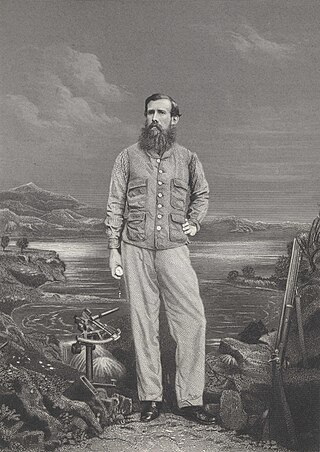
Captain John Hanning Speke was an English explorer and officer in the British Indian Army who made three exploratory expeditions to Africa. He is most associated with the search for the source of the Nile and was the first European to reach Lake Victoria.
Frederic Edwin Church, American painter (d. 1900) births

Frederic Edwin Church was an American landscape painter born in Hartford, Connecticut. He was a central figure in the Hudson River School of American landscape painters, best known for painting large landscapes, often depicting mountains, waterfalls, and sunsets. Church's paintings put an emphasis on realistic detail, dramatic light, and panoramic views. He debuted some of his major works in single-painting exhibitions to a paying and often enthralled audience in New York City. In his prime, he was one of the most famous painters in the United States.
Sebastián Kindelán y O'Regan, colonial governor of East Florida, Santo Domingo and Cuba (b. 1757) deaths
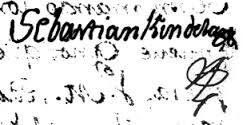
Sebastian Kindelán y O’Regan, also called Sebastián de Kindelán y Oregón, was a colonel in the Spanish Army who served as governor of East Florida and of Santo Domingo during the Second Spanish period (1818–1821), as well as provisional governor of Cuba (1822–1823).

East Florida was a colony of Great Britain from 1763 to 1783 and a province of Spanish Florida from 1783 to 1821. Great Britain gained control of the long-established Spanish colony of La Florida in 1763 as part of the treaty ending the French and Indian War. Deciding that the territory was too large to administer as a single unit, Britain divided Florida into two colonies separated by the Apalachicola River: East Florida with its capital in St. Augustine and West Florida with its capital in Pensacola. East Florida was much larger and comprised the bulk of the former Spanish territory of Florida and most of the current state of Florida. It had also been the most populated region of Spanish Florida, but before control was transferred to Britain, most residents – including virtually everyone in St. Augustine – left the territory, with most migrating to Cuba.

The Captaincy General of Santo Domingo was the first colony in the New World, established by Spain in 1492 on the island of Hispaniola. The colony, under the jurisdiction of the Real Audiencia of Santo Domingo, was granted administrative powers over the Spanish possessions in the Caribbean and most of its mainland coasts, making Santo Domingo the principal political entity of the early colonial period.
Thomas Henry Huxley, English biologist, anatomist, and academic (d. 1895) births
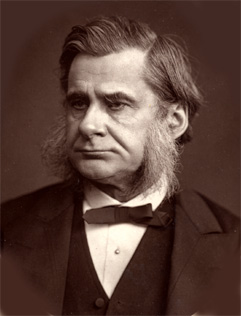
Thomas Henry Huxley was an English biologist and anthropologist specialising in comparative anatomy. He has become known as "Darwin's Bulldog" for his advocacy of Charles Darwin's theory of evolution.
Augustus Le Plongeon, English-American historian, photographer, and academic (d. 1908) births

Augustus Henry Julian Le Plongeon was a British-American archeologist and photographer who studied the pre-Columbian ruins of America, particularly those of the Maya civilization on the northern Yucatán Peninsula. While his writings contain many notions that were not well received by his contemporaries and were later disproven, Le Plongeon left a lasting legacy in his photographs documenting the ancient ruins. He was one of the earliest proponents of Mayanism.
Joseph Joubert, French author (b. 1754) deaths

Joseph Joubert was a French moralist and essayist, remembered today largely for his Pensées (Thoughts), which were published posthumously.
Charles Boucher de Boucherville, Canadian physician and politician, 3rd Premier of Quebec (d. 1915) births

Sir Charles-Eugène-Napoléon Boucher de Boucherville was a Canadian politician and doctor. He twice served as the premier of Quebec.

The premier of Quebec is the head of government of the Canadian province of Quebec. The current premier of Quebec is François Legault of the Coalition Avenir Québec, sworn in on October 18, 2018, following that year's election.
Julia Gardiner Tyler, American wife of John Tyler, 11th First Lady of the United States (d. 1889) births

Julia Tyler was the second wife of John Tyler, who was the tenth president of the United States. As such, she served as the first lady of the United States from June 26, 1844, to March 4, 1845.
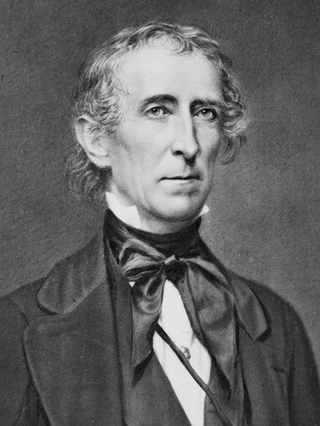
John Tyler was the tenth president of the United States, serving from 1841 to 1845, after briefly holding office as the tenth vice president in 1841. He was elected vice president on the 1840 Whig ticket with President William Henry Harrison, succeeding to the presidency following Harrison's death 31 days after assuming office. Tyler was a stalwart supporter and advocate of states' rights, including regarding slavery, and he adopted nationalistic policies as president only when they did not infringe on the states' powers. His unexpected rise to the presidency posed a threat to the presidential ambitions of Henry Clay and other Whig politicians and left Tyler estranged from both of the nation's major political parties at the time.

The first lady of the United States (FLOTUS) is the title held by the hostess of the White House, usually the wife of the president of the United States, concurrent with the president's term in office. Although the first lady's role has never been codified or officially defined, she figures prominently in the political and social life of the United States. Since the early 20th century, the first lady has been assisted by official staff, now known as the Office of the First Lady and headquartered in the East Wing of the White House.
John Whiteaker, American soldier, judge, and politician, 1st Governor of Oregon (d. 1902) births

John Whiteaker was an American politician, soldier, and judge. A native of Indiana, he joined the army during the Mexican–American War and then prospected during the California Gold Rush. After moving to the Oregon Territory, he served as a judge and member of the legislature. A Democrat, Whiteaker served as the first state Governor of Oregon from 1859 until 1862 and later was Oregon's Congressman from 1879 to 1881. He also was president of the Oregon State Senate and Speaker of the Oregon House of Representatives.

The governor of Oregon is the head of government of Oregon and serves as the commander-in-chief of the state's military forces. The title of governor was also applied to the office of Oregon's chief executive during the provisional and U.S. territorial governments.
Samuel Dexter, American lawyer and politician, 4th United States Secretary of War, 3rd United States Secretary of the Treasury (b. 1761) deaths

Samuel Dexter was an early American statesman who served both in Congress and in the Presidential Cabinets of John Adams and Thomas Jefferson.

The secretary of war was a member of the U.S. president's Cabinet, beginning with George Washington's administration. A similar position, called either "Secretary at War" or "Secretary of War", had been appointed to serve the Congress of the Confederation under the Articles of Confederation between 1781 and 1789. Benjamin Lincoln and later Henry Knox held the position. When Washington was inaugurated as the first President under the Constitution, he appointed Knox to continue serving as Secretary of War.

The United States secretary of the treasury is the head of the United States Department of the Treasury, and is the chief financial officer of the federal government of the United States. The secretary of the treasury serves as the principal advisor to the president of the United States on all matters pertaining to economic and fiscal policy. The secretary is a statutory member of the Cabinet of the United States, and is fifth in the presidential line of succession.
Nikolay Kamensky, Russian general (b. 1776) deaths

Count Nikolay Mikhailovich Kamensky was a Russian general who outlived his father, Field Marshal Mikhail Kamensky, by two years.
Tipu, ruler of Mysore (b. 1750) deaths

Tipu Sultan, also known as the Tiger of Mysore, was the ruler of the Kingdom of Mysore based in South India. He was a pioneer of rocket artillery. He introduced a number of administrative innovations during his rule, including a new coinage system and calendar, and a new land revenue system, which initiated the growth of the Mysore silk industry. He expanded the iron-cased Mysorean rockets and commissioned the military manual Fathul Mujahidin. He deployed the rockets against advances of British forces and their allies during the Anglo-Mysore Wars, including the Battle of Pollilur and Siege of Srirangapatna.
Horace Mann, American educator and politician (d. 1859) births

Horace Mann was an American educational reformer, slavery abolitionist and Whig politician known for his commitment to promoting public education. In 1848, after public service as Secretary of the Massachusetts State Board of Education, Mann was elected to the United States House of Representatives (1848–1853). From September 1852 to his death, he served as President of Antioch College.
William Pennington, American lawyer and politician, 13th Governor of New Jersey, 23rd Speaker of the United States House of Representatives (d. 1862) births

William Pennington was an American politician and lawyer. He was the 13th governor of New Jersey from 1837 to 1843. He served one term in the United States House of Representatives, during which he served as Speaker of the House from 1860 to 1861.

The governor of New Jersey is the head of government of New Jersey. The office of governor is an elected position with a four-year term. There is a two consecutive term term limit, with no limitation on non-consecutive terms. The official residence of the governor is Drumthwacket, a mansion located in Princeton, New Jersey. The governor’s office is located inside of the New Jersey State House in Trenton, making New Jersey notable as the executive’s office is located in the same building as the legislature. New Jersey is also notable for being one of the few states in which the governor’s official residence is not located in the state capital.

The speaker of the United States House of Representatives, commonly known as the speaker of the House, is the presiding officer of the United States House of Representatives. The office was established in 1789 by Article I, Section 2 of the U.S. Constitution. The speaker is the political and parliamentary leader of the House and is simultaneously its presiding officer, de facto leader of the body's majority party, and the institution's administrative head. Speakers also perform various other administrative and procedural functions. Given these several roles and responsibilities, the speaker usually does not personally preside over debates. That duty is instead delegated to members of the House from the majority party. Nor does the speaker regularly participate in floor debates.
William H. Prescott, American historian and scholar (d. 1859) births

William Hickling Prescott was an American historian and Hispanist, who is widely recognized by historiographers to have been the first American scientific historian. Despite having serious visual impairment, which at times prevented him from reading or writing for himself, Prescott became one of the most eminent historians of 19th century America. He is also noted for his eidetic memory.
Matthew Tilghman, American politician (b. 1718) deaths

Matthew Tilghman was an American planter, and Revolutionary leader from Maryland. He served as a delegate to the Continental Congress from 1774 to 1776, where he signed the 1774 Continental Association.
Jacques Saly, French painter and sculptor (b. 1717) deaths

Jacques François Joseph Saly, also known as Jacques Saly, French-born sculptor who worked in France, Italy and Malta. He is commonly associated with his time in Denmark he served as Director of the Royal Danish Academy of Art (1754–71). His most noteworthy work is the equestrian statue Frederik V on Horseback at Amalienborg.
Anthony Ulrich of Brunswick, Prussian nobleman (b. 1714) deaths
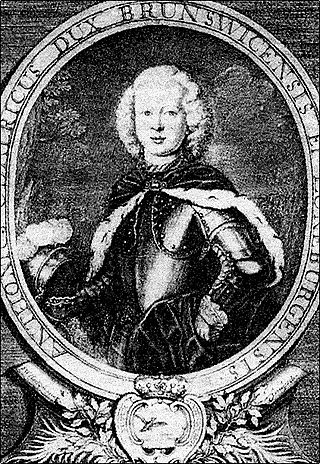
Anthony Ulrich, Duke of Brunswick-Lüneburg, was Generalissimo of the Army of Russia, and the husband of Anna Leopoldovna, who reigned as regent of Russia for one year.
Friedrich Arnold Brockhaus, German publisher (d. 1823) births

Friedrich Arnold Brockhaus was a German encyclopedia publisher and editor, famed for publishing the Conversations-Lexikon, which is now published as the Brockhaus encyclopedia.
François Gérard, French painter (d. 1837) births

François Pascal Simon Gérard, titled as Baron Gérard in 1809, was a prominent French painter. He was born in Rome, where his father occupied a post in the house of the French ambassador, and his mother was Italian. After he was made a baron of the Empire in 1809 by Emperor Napoleon, he was known formally as Baron Gérard.
Tyagaraja, Indian composer (d. 1847) births

Thyagaraja, also known as Thyāgayya and in full as Kakarla Thyagabrahmam, was a composer and vocalist of Carnatic music, a form of Indian classical music. Tyagaraja and his contemporaries, Shyama Shastri and Muthuswami Dikshitar, are regarded as the Trinity of Carnatic music. Thyagaraja composed thousands of devotional compositions, most in Telugu and in praise of Lord Rama, many of which remain popular today, the most popular being "Nagumomu". Of special mention are five of his compositions called the Pancharatna Kritis, which are often sung in programs in his honour, and Utsava Sampradaya Krithis, which are often sung to accompany temple rituals.
Manuel Tolsá, Spanish sculptor and first director of the Academy of San Carlos in Mexico City (d. 1816) births
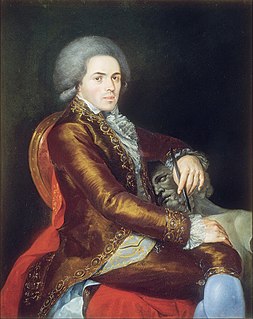
Manuel Vicente Tolsá Sarrión was a prolific Neoclassical architect and sculptor in Spain and Mexico. He served as the first director of the Academy of San Carlos.
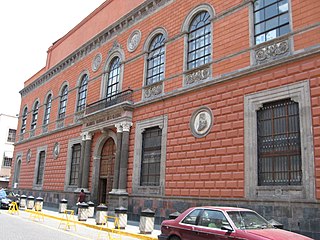
The Academy of San Carlos is located at 22 Academia Street in just northeast of the main plaza of Mexico City. It was the first major art academy and the first art museum in the Americas. It was founded in 1781 as the School of Engraving and moved to the Academia Street location about 10 years later. It emphasized classical European training until the early 20th century, when it shifted to a more modern perspective. At this time, it also integrated with the National Autonomous University of Mexico, eventually becoming the Faculty of Arts and Design, which is based in Xochimilco. Currently, only graduate courses of the modern school are given in the original academy building.
John Brooks, American soldier and politician, 11th Governor of Massachusetts (d. 1825) births

John Brooks was an American doctor, military officer, and politician from Massachusetts. He served as the 11th Governor of Massachusetts from 1816 to 1823, and was one of the last Federalist officials elected in the United States.

The governor of the Commonwealth of Massachusetts is the chief executive officer of the government of Massachusetts. The governor is the head of the state cabinet and the commander-in-chief of the commonwealth's military forces.
Eustace Budgell, English journalist and politician (b. 1686) deaths

Eustace Budgell was an English writer and politician.
James Thornhill, English painter and politician (b. 1675) deaths

Sir James Thornhill was an English painter of historical subjects working in the Italian baroque tradition. He was responsible for some large-scale schemes of murals, including the "Painted Hall" at the Royal Hospital, Greenwich, the paintings on the inside of the dome of St Paul's Cathedral, and works at Chatsworth House and Wimpole Hall.
Jean-Charles de Borda, French mathematician, physicist, and sailor (d. 1799) births

Jean-Charles, chevalier de Borda was a French mathematician, physicist, and Navy officer.
Louis Antoine de Noailles, French cardinal (b. 1651) deaths

Louis-Antoine de Noailles, second son of Anne, 1st duc de Noailles, was a French bishop and cardinal. His signing of the Unigenitus bull in 1728 would end the formal Jansenist controversy.
Richard Graves, English minister and author (d. 1804) births

Richard Graves was an English cleric, poet, and novelist. He is remembered especially for his picaresque novel The Spiritual Quixote (1773).
John Nevison, English criminal (b. 1639) deaths
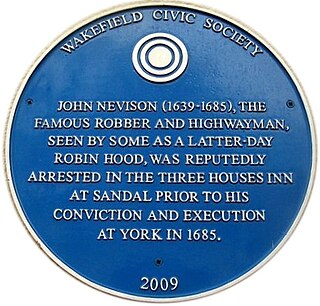
John Nevison, also known as William Nevison or Nevinson, was one of Britain's most notorious highwaymen, a gentleman rogue supposedly nicknamed Swift Nick by King Charles II after a renowned 200-mile (320 km) dash from Kent to York to establish an alibi for a robbery he had committed earlier that day. The story inspired William Harrison Ainsworth to include a modified version in his novel Rookwood, in which he attributed the feat to Dick Turpin. There are suggestions that the feat was actually undertaken by Samuel Nicks. The TV series Dick Turpin had an accomplice of the highwayman, Nick, who earned the nickname Swiftnick.
Françoise-Marie de Bourbon, French noblewoman (d.1749) births

Françoise Marie de Bourbon was the youngest illegitimate daughter of Louis XIV of France and his maîtresse-en-titre, Françoise-Athénaïs de Rochechouart, Marquise de Montespan. At the age of 14, she married her first cousin Philippe d'Orléans, the future Regent of France during the minority of Louis XV. Through two of her eight children, she became the ancestress of several of Europe's Roman Catholic monarchs of the 19th and 20th centuries- notably those of Belgium, Italy, Portugal, Spain, and France.
Isaac Barrow, English mathematician and theologian (b. 1630) deaths

Isaac Barrow was an English Christian theologian and mathematician who is generally given credit for his early role in the development of infinitesimal calculus; in particular, for proof of the fundamental theorem of calculus. His work centered on the properties of the tangent; Barrow was the first to calculate the tangents of the kappa curve. He is also notable for being the inaugural holder of the prestigious Lucasian Professorship of Mathematics, a post later held by his student, Isaac Newton.
Bartolomeo Cristofori, Italian instrument maker, invented the piano (d. 1731) births
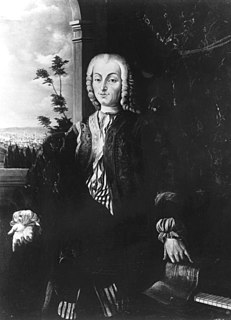
Bartolomeo Cristofori di Francesco was an Italian maker of musical instruments famous for inventing the piano.

The piano is a stringed keyboard instrument in which the strings are struck by wooden hammers that are coated with a softer material. It is played using a keyboard, which is a row of keys that the performer presses down or strikes with the fingers and thumbs of both hands to cause the hammers to strike the strings. It was invented in Italy by Bartolomeo Cristofori around the year 1700.
Chhatrasal, Indian ruler (d. 1731) births

Chhatrasal Bundela was an Indian warrior and ruler from the Bundela Rajput clan, who fought against the Mughal Empire, and established his own kingdom in Bundelkhand during the 17th-18th centuries.
Katherine Ferrers, English aristocrat and heiress (d. 1660) births
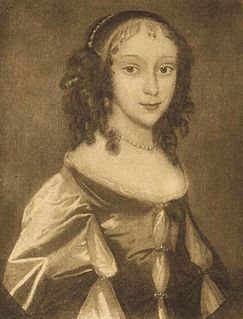
Katherine Ferrers was an English gentlewoman and heiress. According to popular legend, she was also the "Wicked Lady", a highwaywoman who terrorised the English county of Hertfordshire before dying from gunshot wounds sustained during a robbery.
Arthur Lake, English bishop and scholar (b. 1569) deaths

Arthur Lake was Bishop of Bath and Wells and a translator of the King James Version of The Bible.
Adriaan van Roomen, Flemish priest and mathematician (b. 1561) deaths
Adriaan van Roomen, also known as Adrianus Romanus, was a mathematician, professor of medicine and medical astronomer from the Duchy of Brabant in the Habsburg Netherlands who was active throughout Central Europe in the late 16th and early 17th centuries. As a mathematician he worked in algebra, trigonometry and geometry; and on the decimal expansion of π. He solved the Problem of Apollonius using a new method that involved intersecting hyperbolas. He also wrote on the Gregorian calendar reform.
Ulisse Aldrovandi, Italian naturalist (b. 1522) deaths
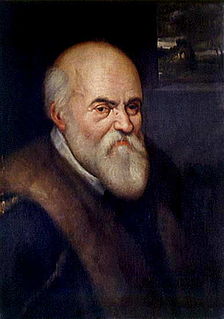
Ulisse Aldrovandi was an Italian naturalist, the moving force behind Bologna's botanical garden, one of the first in Europe. Carl Linnaeus and the comte de Buffon reckoned him the father of natural history studies. He is usually referred to, especially in older scientific literature in Latin, as Aldrovandus; his name in Italian is equally given as Aldroandi.
Claudio Merulo, Italian organist and composer (b. 1533) deaths

Claudio Merulo was an Italian composer, publisher and organist of the late Renaissance period, most famous for his innovative keyboard music and his ensemble music composed in the Venetian polychoral style. He was born in Correggio and died in Parma. Born Claudio Merlotti, he Latinised his surname when he became famous in Venetian cultural clubs.
Pierre Viret, Swiss theologian and reformer (b. 1511) deaths

Pierre Viret was a Swiss Reformed theologian, evangelist and Protestant reformer.
Luca Ghini, Italian physician and botanist (b. 1490) deaths

Luca Ghini was an Italian physician and botanist, notable as the creator of the first recorded herbarium, as well as the first botanical garden in Europe.
Lelio Sozzini, Italian Protestant theologian (b. 1525) deaths

Lelio Francesco Maria Sozzini, or simply Lelio Sozzini, was an Italian Renaissance humanist and theologian and, alongside his nephew Fausto Sozzini, founder of the Non-trinitarian Christian belief system known as Socinianism. His doctrine was developed among the Polish Brethren in the Polish Reformed Church during the 16th and 17th centuries and embraced by the Unitarian Church of Transylvania during the same period.
Alice Spencer, English noblewoman (d. 1637) births

Alice Spencer, Countess of Derby was an English noblewoman from the Spencer family and noted patron of the arts. Poet Edmund Spenser represented her as "Amaryllis" in his eclogue Colin Clouts Come Home Againe (1595) and dedicated his poem The Teares of the Muses (1591) to her.
John Houghton, Carthusian monk and saint deaths
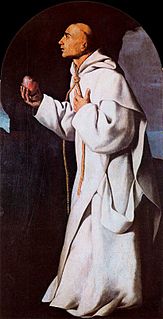
John Houghton was Catholic priest of the Carthusian order and the first martyr to die as a result of the Act of Supremacy by King Henry VIII of England. He was also the first of the Carthusians to die as a martyr. As one of the Carthusian Martyrs of London he is among the Forty Martyrs of England and Wales.
Lorenzo de' Medici, duke of Urbino (b. 1492) deaths

Lorenzo di Piero de' Medici was the ruler of Florence from 1516 until his death in 1519. He was also Duke of Urbino during the same period. His daughter Catherine de' Medici became Queen Consort of France, while his illegitimate son, Alessandro de' Medici, became the first Duke of Florence.
Husayn Mirza Bayqara, Timurid ruler of Herat (b. 1438) deaths

Sultan Husayn Bayqara Mirza was the Timurid ruler of Herat from 1469 until May 4, 1506, with a brief interruption in 1470.
George Neville, Duke of Bedford (b. 1457) deaths
George Neville, Duke of Bedford was an English nobleman, a scion of the House of Neville. At birth, he was likely heir to great wealth, but due to the political failure of his father and uncle, he inherited very little.
Edward of Westminster, Prince of Wales, son and heir of Henry VI of England (b. 1453) deaths

Edward of Westminster, also known as Edward of Lancaster, was the only son of King Henry VI of England and Margaret of Anjou. He was killed aged seventeen at the Battle of Tewkesbury.
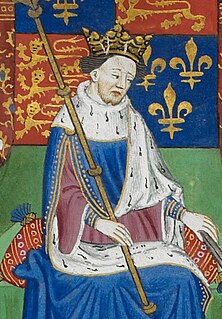
Henry VI was King of England and Lord of Ireland from 1422 to 1461 and again from 1470 to 1471, and disputed King of France from 1422 to 1453. The only child of Henry V, he succeeded to the English throne at the age of nine months upon his father's death, and succeeded to the French throne on the death of his maternal grandfather, Charles VI, shortly afterwards.
Edmund Beaufort, 4th Duke of Somerset (b. 1438) deaths

Edmund Beaufort, styled 4th Duke of Somerset, 6th Earl of Somerset, 3rd Marquess of Dorset, 3rd Earl of Dorset, was an English nobleman, and a military commander during the Wars of the Roses, in which he supported the Lancastrian king Henry VI.
Engelbrekt Engelbrektsson, Swedish rebel leader deaths

Engelbrekt Engelbrektsson was a Swedish nobleman, rebel leader and military boss of German ancestry. He was the leader of the Engelbrekt rebellion in 1434 against Eric of Pomerania, king of the Kalmar Union. Engelbrekt Parish and Engelbrekt Church (Engelbrektskyrkan) in the Church of Sweden Diocese of Stockholm were both named in his honor.
Coluccio Salutati, chancellor of Florence (b. 1331) deaths
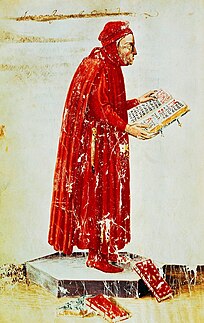
Coluccio Salutati was an Italian humanist and notary, and one of the most important political and cultural leaders of Renaissance Florence; as chancellor of the Republic and its most prominent voice, he was effectively the permanent secretary of state in the generation before the rise of the Medici.
Gotthard of Hildesheim, German bishop (b. 960) deaths

Gotthard, also known as Gothard or Godehard the Bishop, was a German bishop venerated as a saint.
Khwaja Abdullah Ansari, Persian mystic and poet (d. 1088) births

Abu Ismaïl Abdullah al-Harawi al-Ansari or Abdullah Ansari of Herat (1006–1088) also known as Pir-i Herat "Sage of Herat", was a Muslim Sufi saint who lived in the 11th century in Herat. One of the outstanding figures of 5th/11th century Khorasan, Ansari was a commentator of the Qur'an, scholar of the Hanbali school of thought (madhhab), traditionalist, polemicist, and spiritual master, known for his oratory and poetic talents in Arabic and Persian.
Herman II, duke of Swabia deaths
Herman II was a member of the Conradine dynasty. He was Duke of Swabia from 997 to his death. In 1002, Herman unsuccessfully attempted to become king of Germany.
Arbeo, bishop of Freising deaths

Arbeo of Freising was an early medieval author and Bishop of Freising from 764.
Venerius, archbishop of Milan deaths
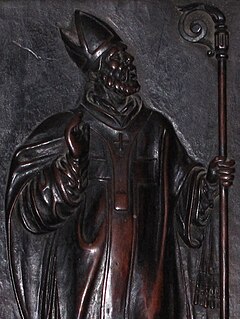
Venerius was Archbishop of Milan from 400 to 408. He is honoured as a Saint in the Catholic Church and his feast day is May 6.
Anti-Bullying Day (United Nations)
Anti-Bullying Day is an annual event, held in Canada and other parts of the world, where people wear a pink-coloured shirt to stand against bullying.

The United Nations (UN) is an intergovernmental organization whose stated purposes are to maintain international peace and security, develop friendly relations among nations, achieve international cooperation, and be a centre for harmonizing the actions of nations. It is the world's largest and most familiar international organization. The UN is headquartered on international territory in New York City, and has other main offices in Geneva, Nairobi, Vienna, and The Hague.
Bird Day (United States)
Bird Day is the name of several holidays celebrating birds. Various countries observe such a holiday on various dates.

The United States of America, commonly known as the United States or informally America, is a country in North America. It consists of 50 states, a federal district, five major unincorporated territories, nine Minor Outlying Islands, and 326 Indian reservations. It is the third-largest country by both land and total area. The United States shares land borders with Canada to its north and with Mexico to its south. It has maritime borders with the Bahamas, Cuba, Russia, and other nations. With a population of over 331 million, it is the third most populous country in the world. The national capital is Washington, D.C., and the most populous city and financial center is New York City.
Cassinga Day (Namibia)
Cassinga Day is a national public holiday in Namibia remembering the Cassinga Massacre. Commemorated annually on 4 May, the date "remembers those killed in 1978 when the South African Defence Force attacked a SWAPO base at Cassinga in southern Angola". Commemorations are marked yearly by ceremonies at Heroes' Acre, outside of Windhoek. These ceremonies are attended by many important national political figures, including incumbent President Hage Geingob and former Presidents Hifikepunye Pohamba and Sam Nujoma.

Namibia, officially the Republic of Namibia, is a country in Southern Africa. Its western border is the Atlantic Ocean. It shares land borders with Zambia and Angola to the north, Botswana to the east and South Africa to the south and east. Although it does not border Zimbabwe, less than 200 metres of the Botswanan right bank of the Zambezi River separates the two countries. Namibia gained independence from South Africa on 21 March 1990, following the Namibian War of Independence. Its capital and largest city is Windhoek. Namibia is a member state of the United Nations (UN), the Southern African Development Community (SADC), the African Union (AU) and the Commonwealth of Nations.
Christian feast day: Blessed Ceferino Giménez Malla

Ceferino Giménez Malla was a Spanish Romani, a Roman Catholic catechist and activist for Spanish Romani causes, considered the patron saint of Romani people in Roman Catholicism. A victim of the Spanish Republican militias during the Civil War, Ceferino Giménez Malla was beatified on May 4, 1997; May 4 is also his feast day.
Christian feast day: Blessed Michal Giedroyc
Michał Jan Henryk Giedroyc was a Polish-Lithuanian aristocrat who later became a naturalised British citizen and aircraft designer.
Christian feast day: English Saints and Martyrs of the Reformation Era (Church of England)

The Reformation was a major movement within Western Christianity in 16th-century Europe that posed a religious and political challenge to the Catholic Church and in particular to papal authority, arising from what were perceived to be errors, abuses, and discrepancies by the Catholic Church. The Reformation was the start of Protestantism and the split of the Western Church into Protestantism and what is now the Roman Catholic Church. It is also considered to be one of the events that signified the end of the Middle Ages and the beginning of the early modern period in Europe.

The Church of England is the established Christian church in England and the mother church of the international Anglican Communion. It traces its history to the Christian church recorded as existing in the Roman province of Britain by the 3rd century and to the 6th-century Gregorian mission to Kent led by Augustine of Canterbury.
Christian feast day: F. C. D. Wyneken (Lutheran Church–Missouri Synod)
Friedrich Conrad Dietrich Wyneken was a missionary pastor in the United States. He also served for fourteen years as the second president of the Lutheran Church–Missouri Synod, and helped found Concordia Theological Seminary.

The Lutheran Church—Missouri Synod (LCMS), also known as the Missouri Synod, is a traditional, confessional Lutheran denomination in the United States. With 1.8 million members, it is the second-largest Lutheran body in the United States. The LCMS was organized in 1847 at a meeting in Chicago, Illinois, as the German Evangelical Lutheran Synod of Missouri, Ohio, and Other States, a name which partially reflected the geographic locations of the founding congregations.
Christian feast day: Florian
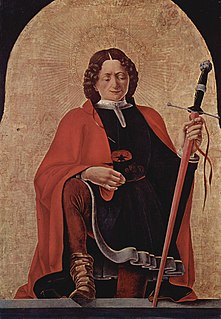
Florian was a Christian holy man, and the patron saint of Linz, Austria; chimney sweeps; soapmakers, and firefighters. His feast day is 4 May. Florian is also the patron saint of Upper Austria, jointly with Leopold III, Margrave of Austria.
Christian feast day: José María Rubio

Jose Maria Rubio was a Spanish Jesuit, known as the Apostle of Madrid by the Bishop of Madrid. He was canonised in 2003 by Pope John Paul II.
Christian feast day: Judas Cyriacus

Judas Cyriacus ; Spanish: Quirico, Italian: Ciriaco), d. ca. AD 360, is the patron saint of Ancona, Italy. His feast day is celebrated in the Catholic Church on 4 May.
Christian feast day: Monica of Hippo (1960 Roman Catholic Calendar)

Monica was an early North African Christian saint and the mother of Augustine of Hippo. She is remembered and honored in the Catholic and Orthodox Churches, albeit on different feast days, for her outstanding Christian virtues, particularly the suffering caused by her husband's adultery, and her prayerful life dedicated to the reformation of her son, who wrote extensively of her pious acts and life with her in his Confessions. Popular Christian legends recall Monica weeping every night for her son Augustine.
This article lists the feast days of the General Roman Calendar as approved on 25 July 1960 by Pope John XXIII's motu proprio Rubricarum instructum and promulgated by the Sacred Congregation of Rites the following day, 26 July 1960, by the decree Novum rubricarum. This 1960 calendar was incorporated into the 1962 edition of the Roman Missal, continued use of which Pope Benedict XVI authorized in the circumstances indicated in his 7 July 2007 motu proprio Summorum Pontificum for use as an Extraordinary Form of the Roman Rite.
Christian feast day: Sacerdos of Limoges
Saint Sacerdos of Limoges is a French saint. He was born near Sarlat and became a monk. He was the founder and abbot of Calviac Abbey. He was later appointed bishop of Limoges and then of Sigüenza.
Christian feast day: Venerius of Milan

Venerius was Archbishop of Milan from 400 to 408. He is honoured as a Saint in the Catholic Church and his feast day is May 6.
Christian feast day: May 4 (Eastern Orthodox liturgics)

May 3 - Eastern Orthodox Church calendar - May 5
Coal Miners Day (India)

People have worked as coal miners for centuries, but they became increasingly important during the Industrial revolution when coal was burnt on a large scale to fuel stationary and locomotive engines and heat buildings. Owing to coal's strategic role as a primary fuel, coal miners have figured strongly in labor and political movements since that time.

India, officially the Republic of India, is a country in South Asia. It is the seventh-largest country by area, the second-most populous country, and the most populous democracy in the world. Bounded by the Indian Ocean on the south, the Arabian Sea on the southwest, and the Bay of Bengal on the southeast, it shares land borders with Pakistan to the west; China, Nepal, and Bhutan to the north; and Bangladesh and Myanmar to the east. In the Indian Ocean, India is in the vicinity of Sri Lanka and the Maldives; its Andaman and Nicobar Islands share a maritime border with Thailand, Myanmar, and Indonesia. The nation's capital city is New Delhi.
Death of Milan Rastislav Štefánik Day (Slovakia)
Remembrance Days in Slovakia are working days.
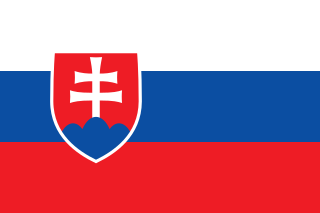
Slovakia, officially the Slovak Republic, is a landlocked country in Central Europe. It is bordered by Poland to the north, Ukraine to the east, Hungary to the south, Austria to the southwest, and the Czech Republic to the northwest. Slovakia's mostly mountainous territory spans about 49,000 square kilometres (19,000 sq mi), with a population of over 5.4 million. The capital and largest city is Bratislava, while the second largest city is Košice.
Greenery Day (Japan)
The present observation of Greenery Day as a public holiday in Japan stems from the celebration of the birthday of the Emperor Shōwa on April 29 every year during the Shōwa era. In 1989, following the ascension of the Emperor Akihito to the Chrysanthemum Throne, the name of the holiday was changed from "Birthday of the Emperor" to "Greenery Day". Officially, as its name suggests, it is a day to commune with nature and to be thankful for blessings. The day was renamed to "Greenery Day" to acknowledge the controversial wartime emperor's love for plants without directly mentioning his name. However, in practice it is seen as just another day that expands the Japanese Golden Week vacation.

Japan is an island country in East Asia. It is situated in the northwest Pacific Ocean, and is bordered on the west by the Sea of Japan, while extending from the Sea of Okhotsk in the north toward the East China Sea, Philippine Sea, and Taiwan in the south. Japan is a part of the Ring of Fire, and spans an archipelago of 6852 islands covering 377,975 square kilometers (145,937 sq mi); the five main islands are Hokkaido, Honshu, Shikoku, Kyushu, and Okinawa. Tokyo is the nation's capital and largest city, followed by Yokohama, Osaka, Nagoya, Sapporo, Fukuoka, Kobe, and Kyoto.
International Firefighters' Day

International Firefighters' Day (IFFD) is observed on May 4. It was instituted after a proposal was made on January 4, 1999, following the deaths of five firefighters in tragic circumstances in a bushfire in Australia.
May Fourth Movement commemorations: Literary Day (Republic of China)

Literary Day is observed annually on May 4 in Taiwan, in honor of the May Fourth Movement. It was first celebrated on this day in 1945, and its establishment was affected by the dispute over whether the Kuomintang or the Communist Party was the legitimate successor to the May Fourth Movement, disagreements about how to interpret the movement, and other cultural struggles.

Taiwan, officially the Republic of China (ROC), is a country in East Asia, at the junction of the East and South China Seas in the northwestern Pacific Ocean, with the People's Republic of China (PRC) to the northwest, Japan to the northeast, and the Philippines to the south. The territories controlled by the ROC consist of 168 islands, with a combined area of 36,193 square kilometres (13,974 sq mi). The main island of Taiwan, also known as Formosa, has an area of 35,808 square kilometres (13,826 sq mi), with mountain ranges dominating the eastern two-thirds and plains in the western third, where its highly urbanised population is concentrated. The capital, Taipei, forms along with New Taipei City and Keelung the largest metropolitan area of Taiwan. Other major cities include Taoyuan, Taichung, Tainan, and Kaohsiung. With around 23.9 million inhabitants, Taiwan is among the most densely populated countries in the world.
May Fourth Movement commemorations: Youth Day (China)

Youth Day is a holiday celebrated annually on May 4 in the People's Republic of China, in honor of young people age 14 and older. It was established to commemorate the 1919 May Fourth Movement.
Remembrance Day for Martyrs and Disabled (Afghanistan)

The culture of Afghanistan has persisted for over three millennia, tracing record to at least the time of the Achaemenid Empire in 500 BCE, and encompasses the cultural diversity of the nation. Afghanistan's culture is historically strongly connected to nearby Pakistan having the same religion as well and the people of both countries have lived together for thousands of years. With its location at the crossroads of Central, South and Western Asia historically made it a hub of diversity, dubbed by one historian as the "roundabout of the ancient world".

Afghanistan, officially the Islamic Emirate of Afghanistan, is a landlocked country located at the crossroads of Central Asia and South Asia. Referred to as the Heart of Asia, it is bordered by Pakistan to the east and south, Iran to the west, Turkmenistan to the northwest, Uzbekistan to the north, Tajikistan to the northeast, and China to the northeast and east. Occupying 652,864 square kilometers (252,072 sq mi) of land, the country is predominantly mountainous with plains in the north and the southwest, which are separated by the Hindu Kush mountain range. As of 2021, its population is 40.2 million, composed mostly of ethnic Pashtuns, Tajiks, Hazaras, and Uzbeks. Kabul is the country's largest city and serves as its capital.
Remembrance of the Dead (Netherlands)

Remembrance of the Dead is held annually on May 4 in the Netherlands. It commemorates all civilians and members of the armed forces of the Kingdom of the Netherlands who have died in wars or peacekeeping missions since the beginning of the Second World War.

The Netherlands, informally Holland, is a country located in Northwestern Europe with overseas territories in the Caribbean. It is the largest of four constituent countries of the Kingdom of the Netherlands. The Netherlands consists of twelve provinces; it borders Germany to the east, Belgium to the south, with a North Sea coastline to the north and west. It shares maritime borders with the United Kingdom, Germany and Belgium in the North Sea. The country's official language is Dutch, with West Frisian as a secondary official language in the province of Friesland. Dutch Low Saxon and Limburgish are recognised regional languages, while Dutch Sign Language, Sinte Romani and Yiddish are recognised non-territorial languages. Dutch, English and Papiamento are official in the Caribbean territories.
Restoration of Independence Day (Latvia)
This is a list of holidays in Latvia.

Latvia, officially the Republic of Latvia, is a country in the Baltic region of Northern Europe. It is one of the Baltic states; and is bordered by Estonia to the north, Lithuania to the south, Russia to the east, Belarus to the southeast, and shares a maritime border with Sweden to the west. Latvia covers an area of 64,589 km2 (24,938 sq mi), with a population of 1.9 million. The country has a temperate seasonal climate. Its capital and largest city is Riga. Latvians belong to the ethno-linguistic group of the Balts; and speak Latvian, one of the only two surviving Baltic languages. Russians are the most prominent minority in the country, at almost a quarter of the population.
Star Wars Day (International observance)

Star Wars Day is an informal commemorative day observed annually on May 4 to celebrate the Star Wars media franchise created by founder and former chairman and CEO of Lucasfilm, George Lucas. Observance of the day spread quickly through media and grassroots celebrations since the franchise began in 1977.
Lists of holidays by various categorizations.
World Give Day
GiveForward.com was launched on August 14, 2008 in Chicago, Illinois. It was an online fundraising tool designed to help people raise money for the causes and organizations that they care about. GiveForward.com has become popular among the growing number of people who fundraise to help pay for a loved one's medical bills. The Chicago Tribune called it the "future of medical fundraising in the Internet Age." It now part of GoFundMe.
Youth Day (Fiji)
Public Holidays in Fiji reflect the country's cultural diversity. Each major religion in Fiji has a public holiday dedicated to it. Also Fiji's major cities and towns hold annual carnivals, commonly called festivals, which are usually named for something relevant to the city or town, such as the Sugar Festival in Lautoka, as Lautoka's largest and most historically important industry is sugar production.